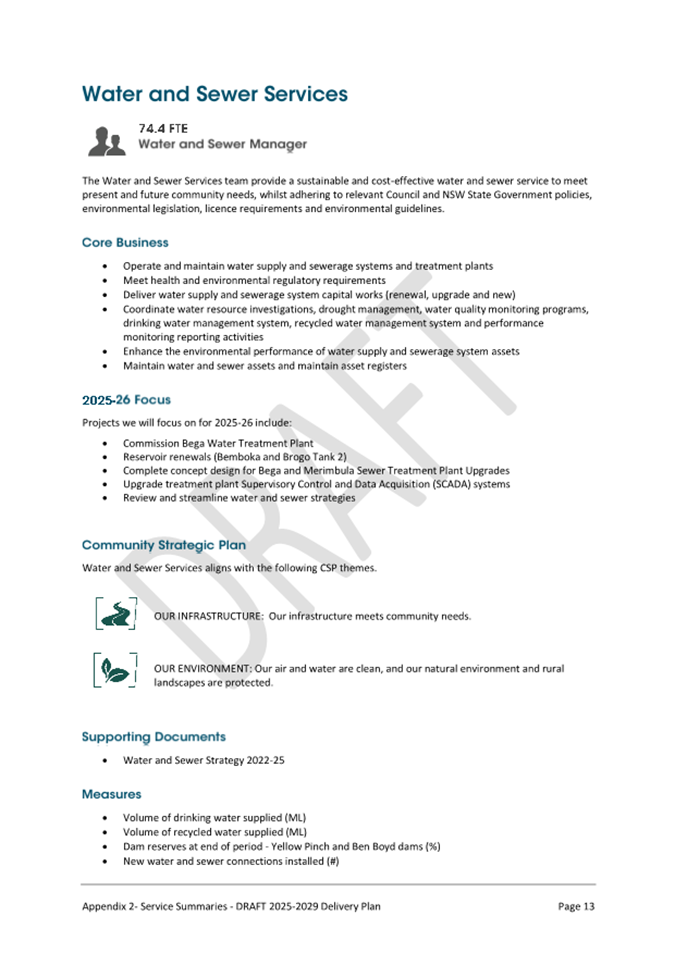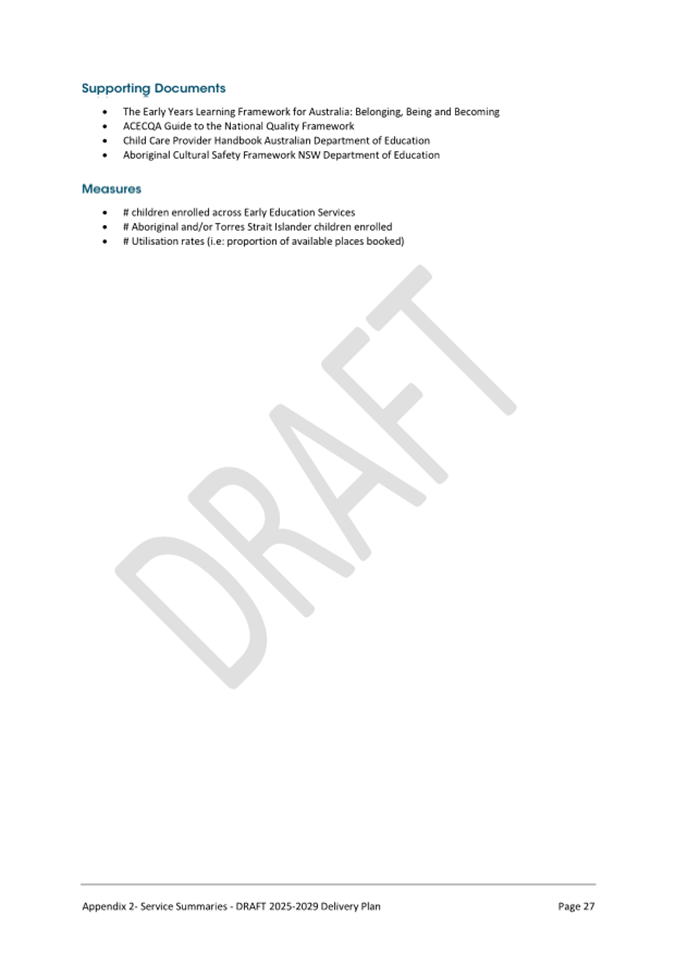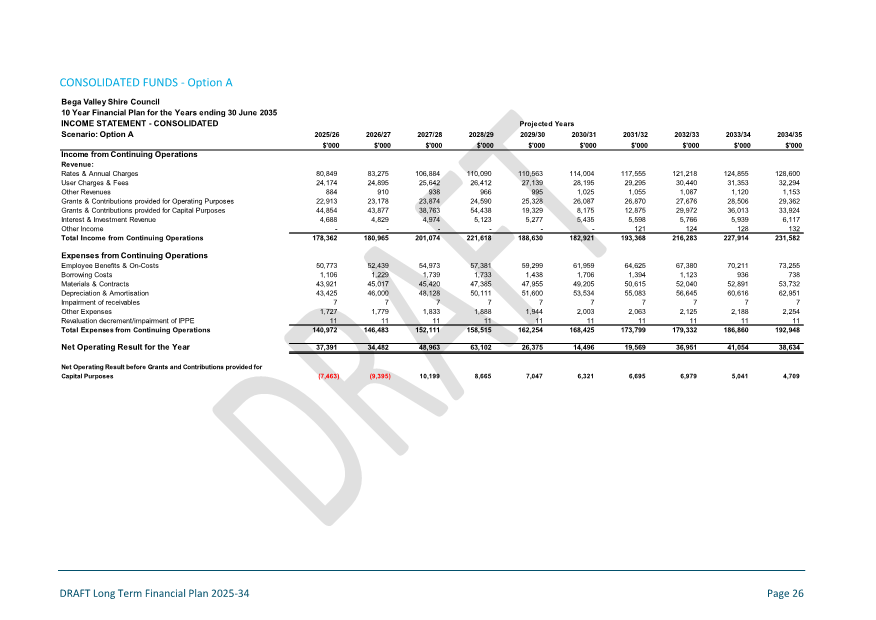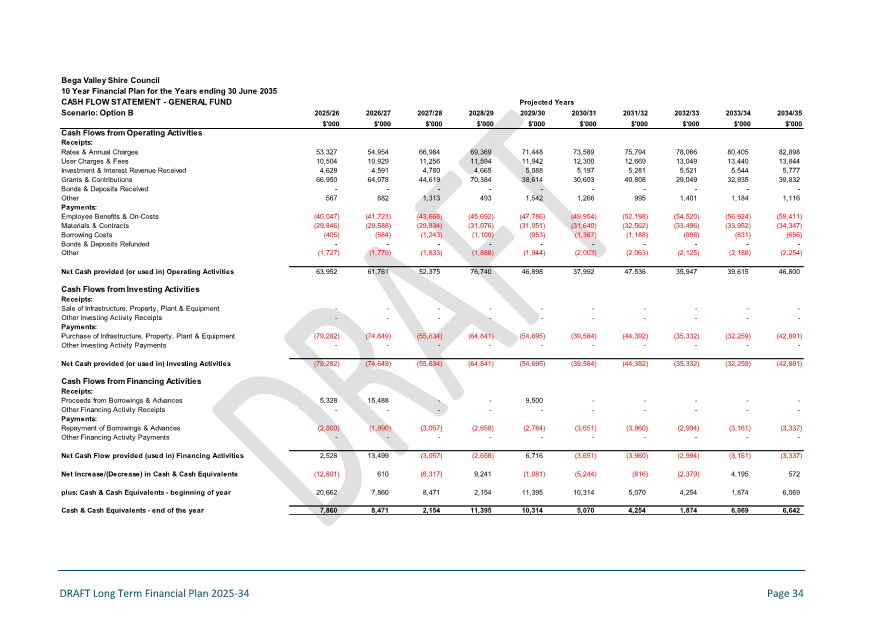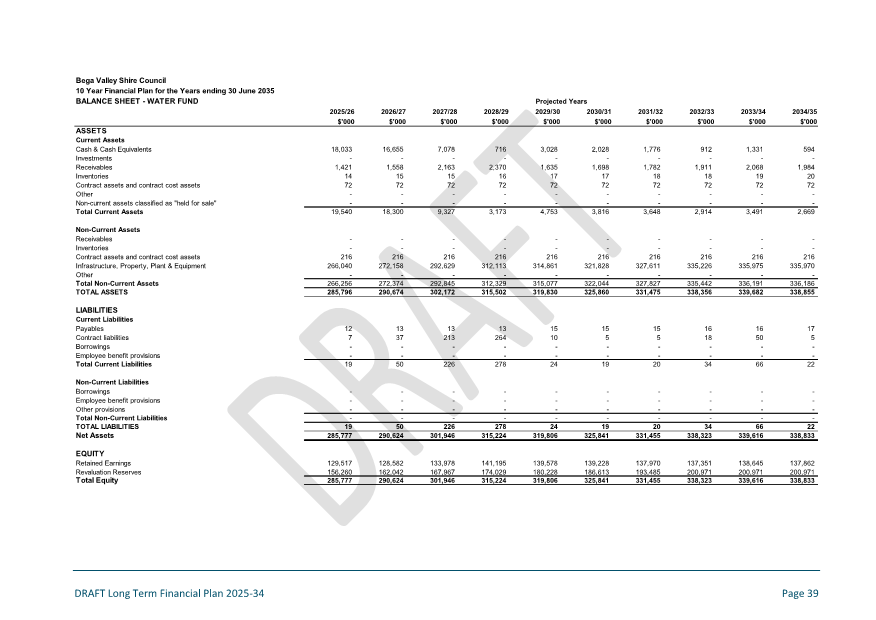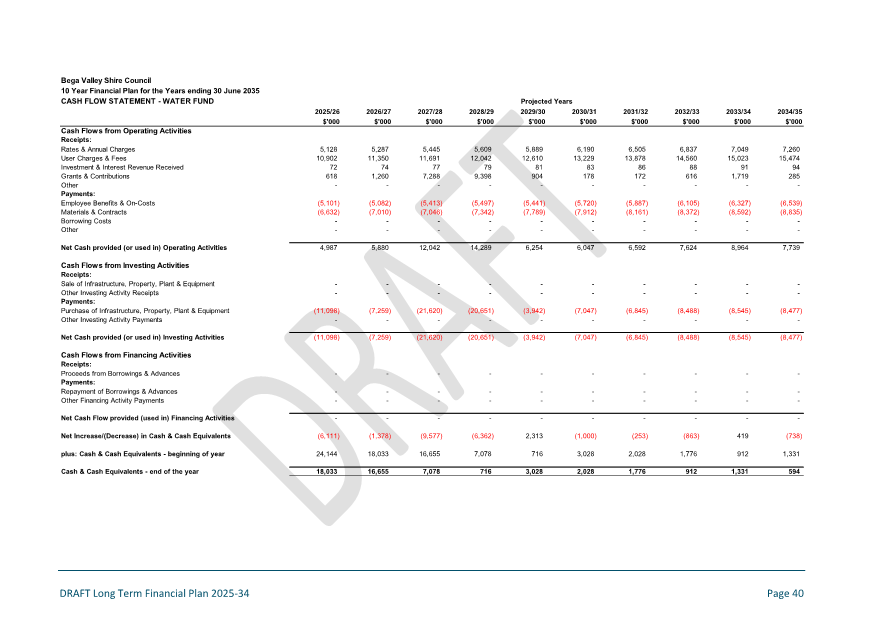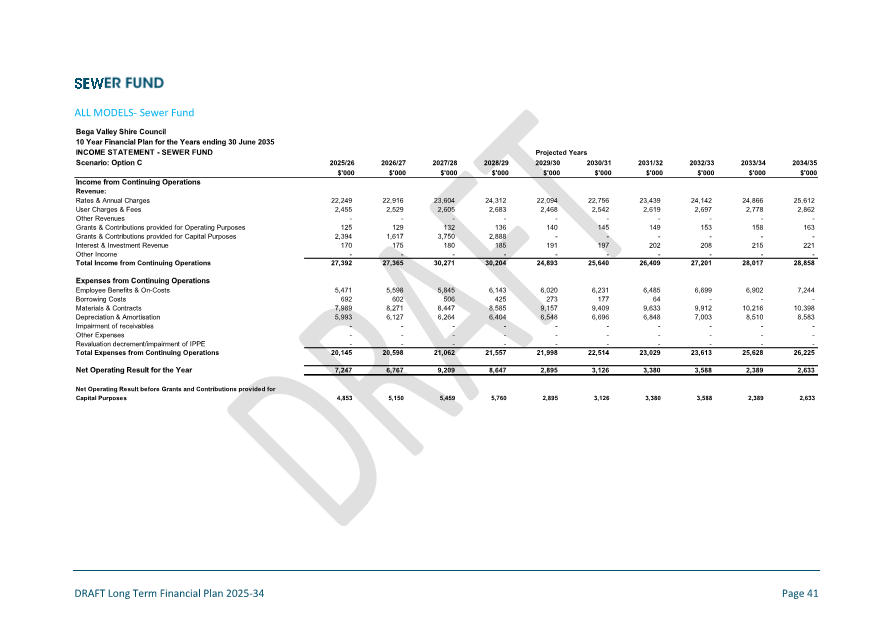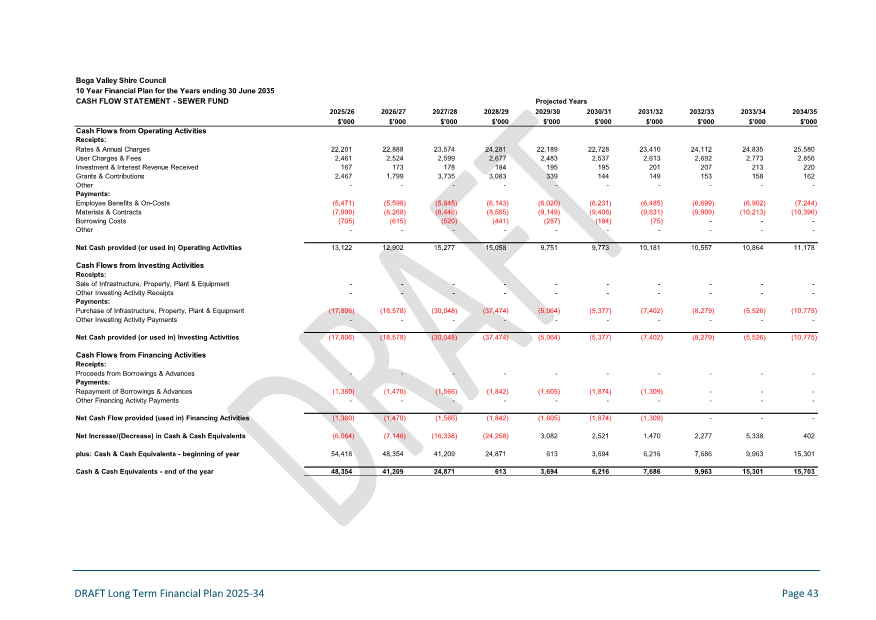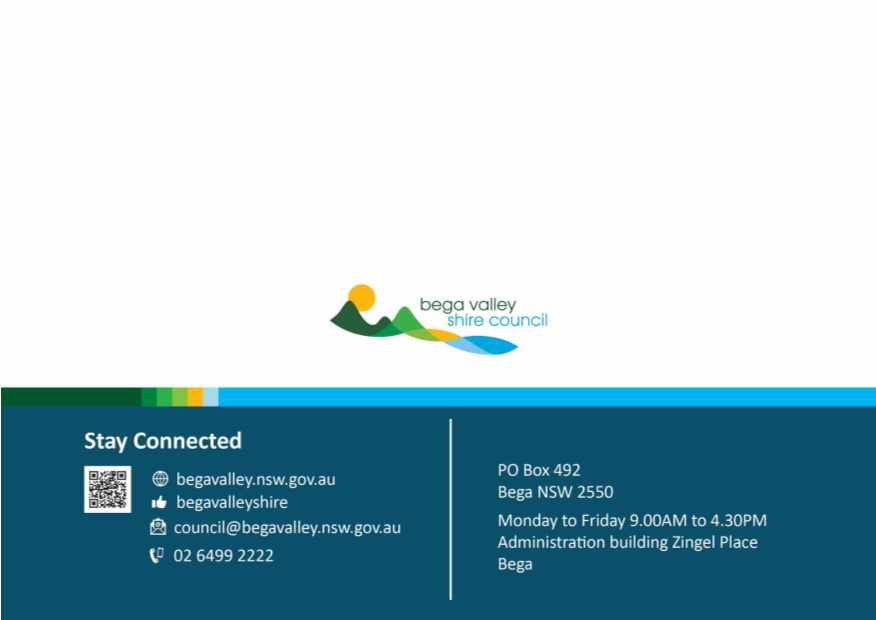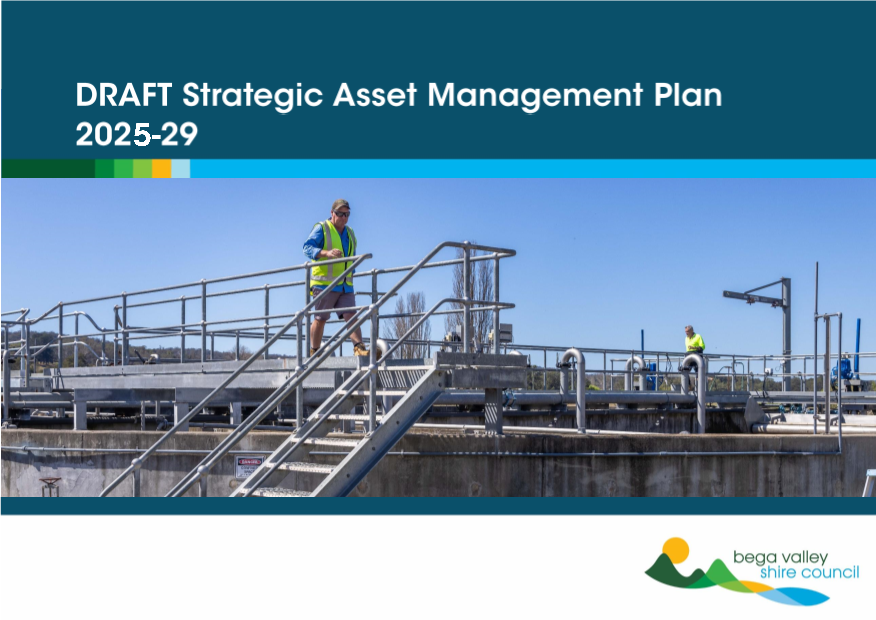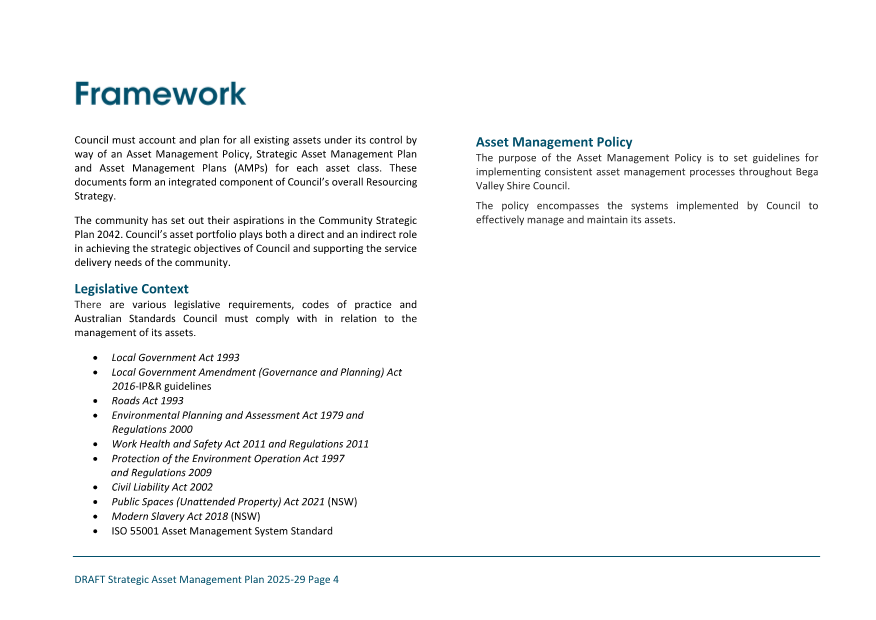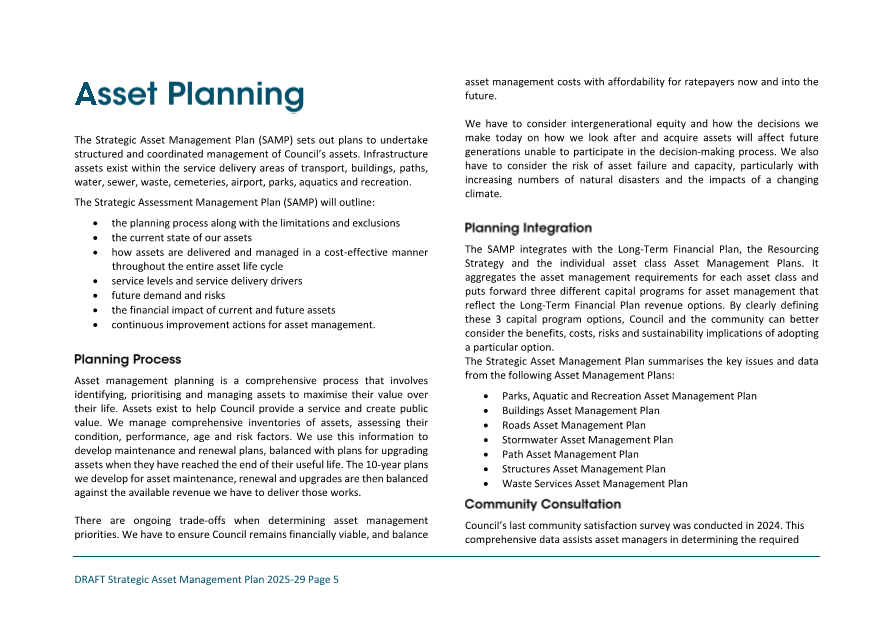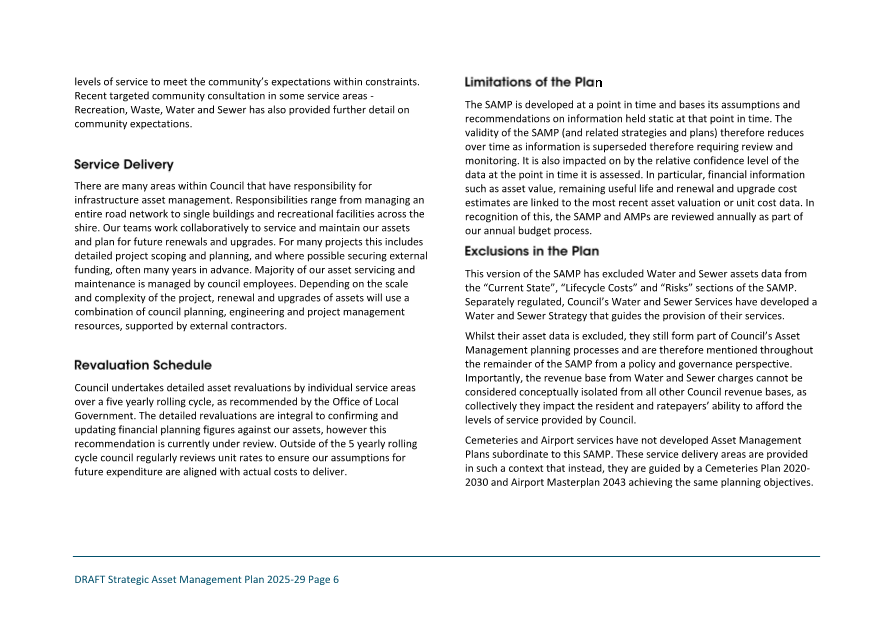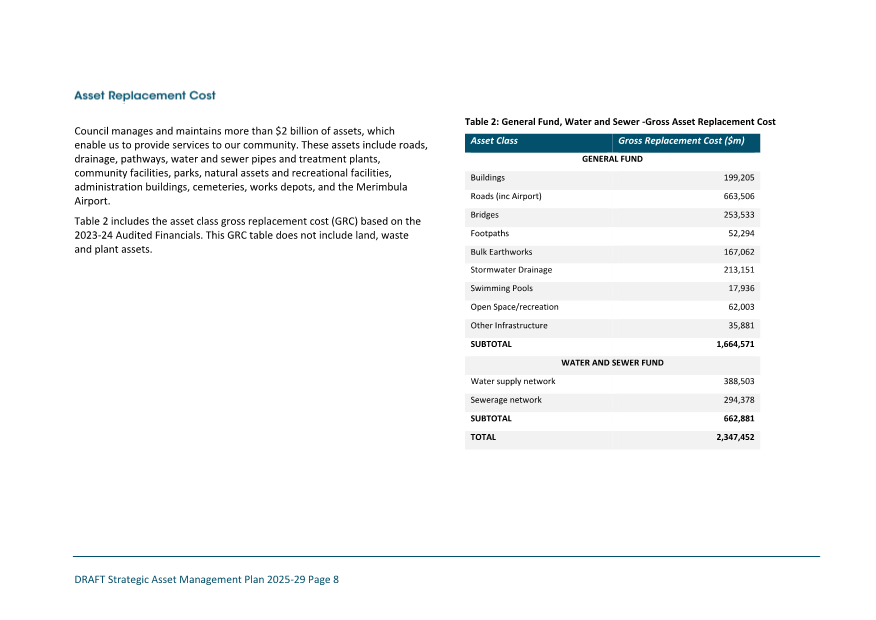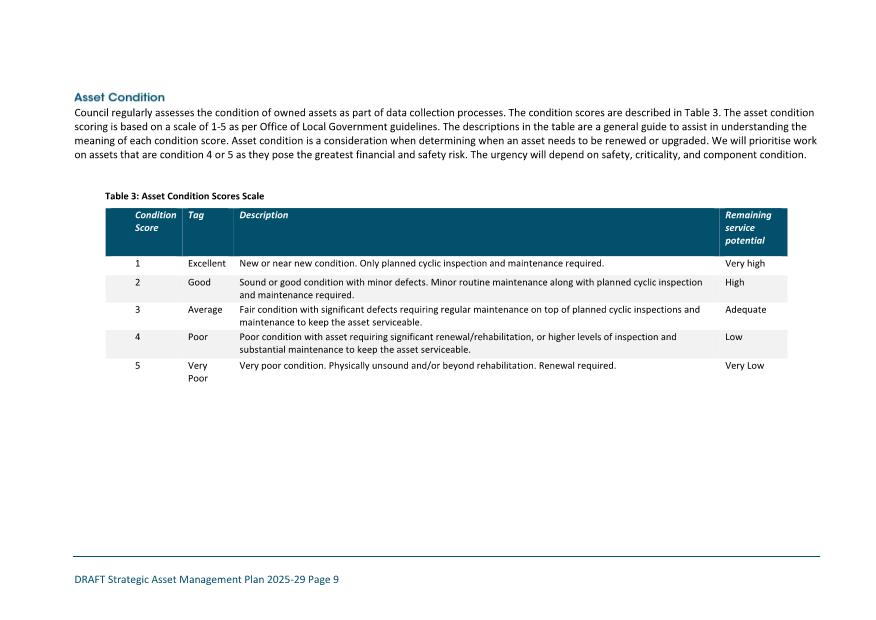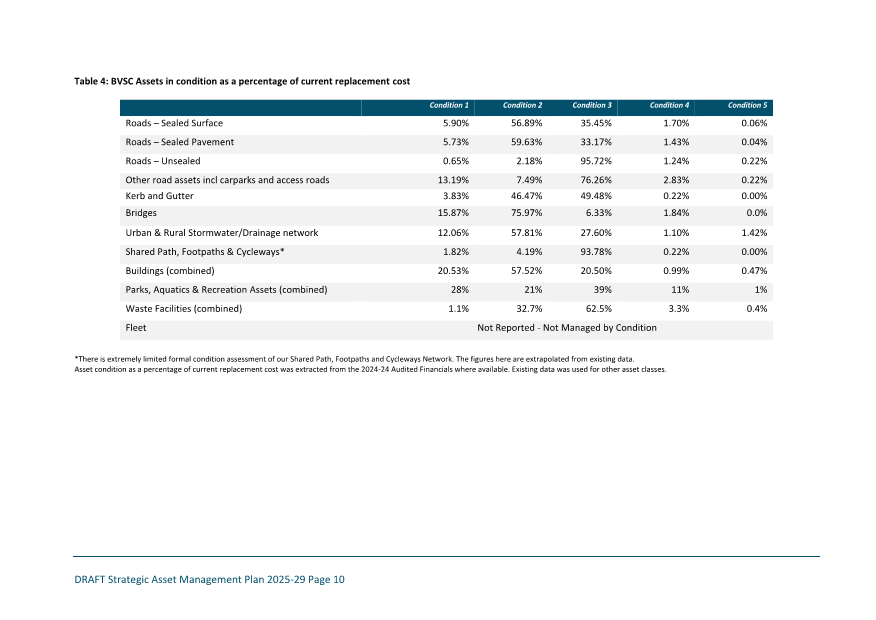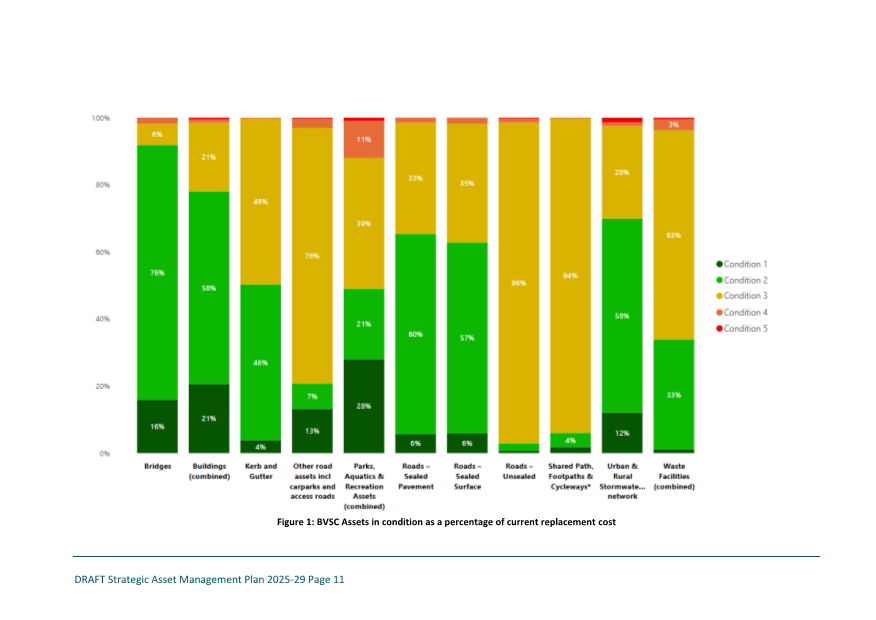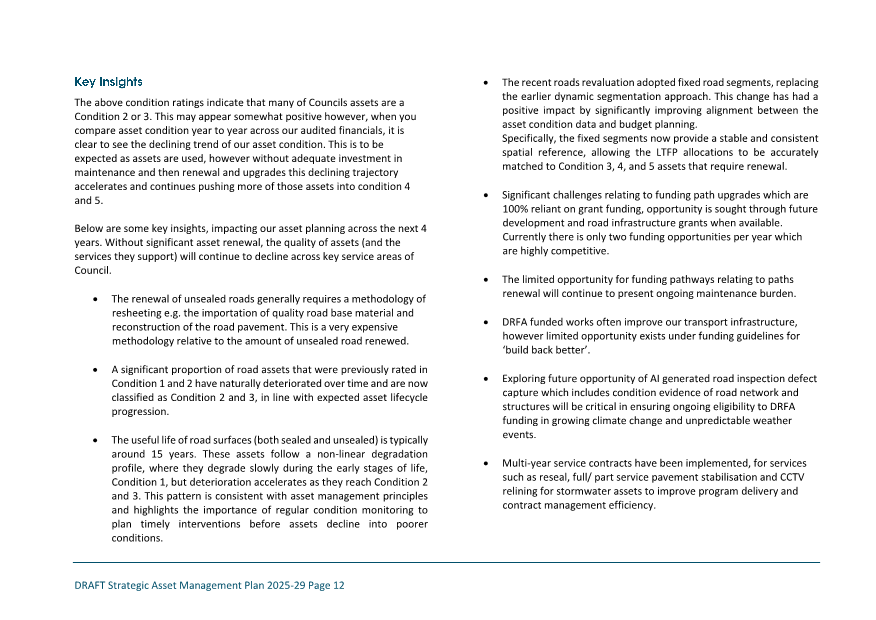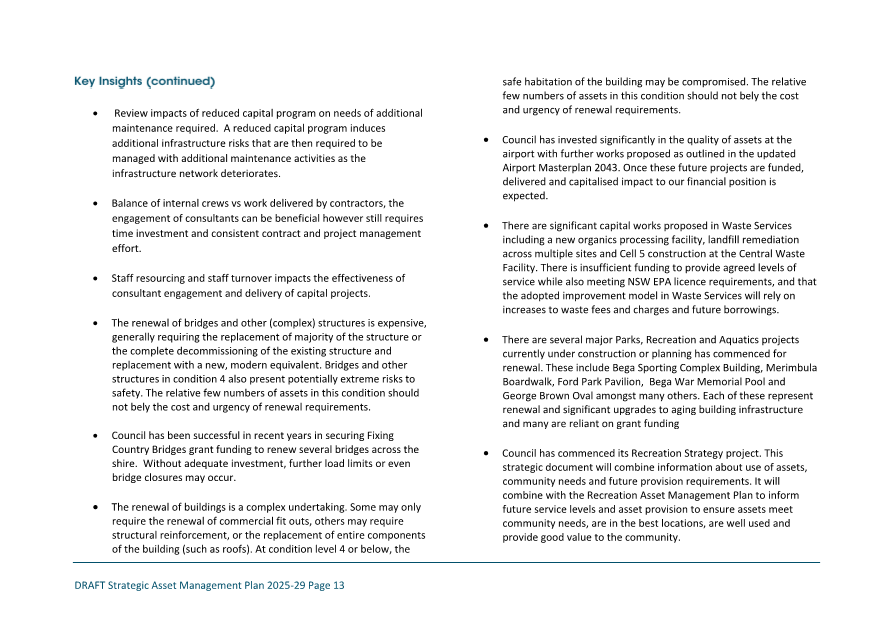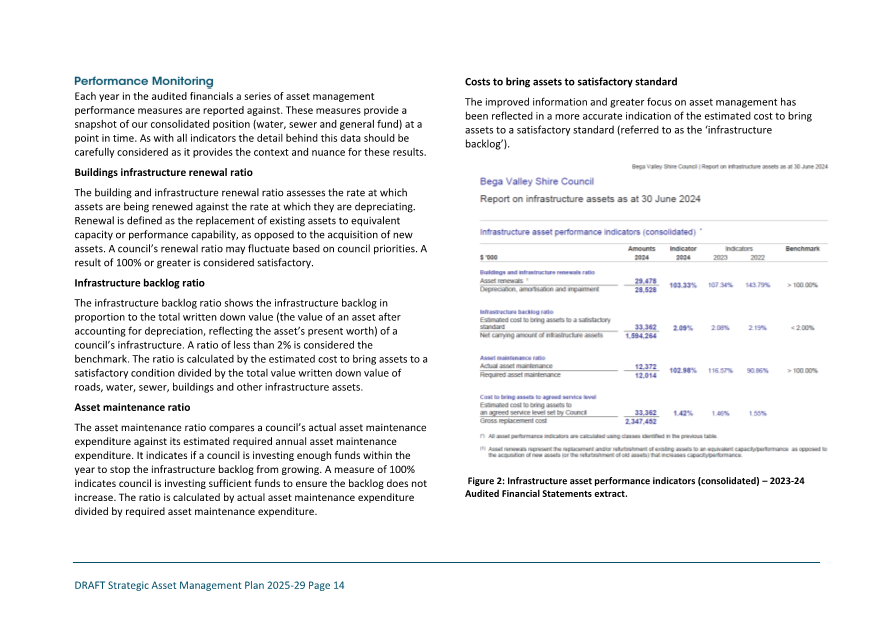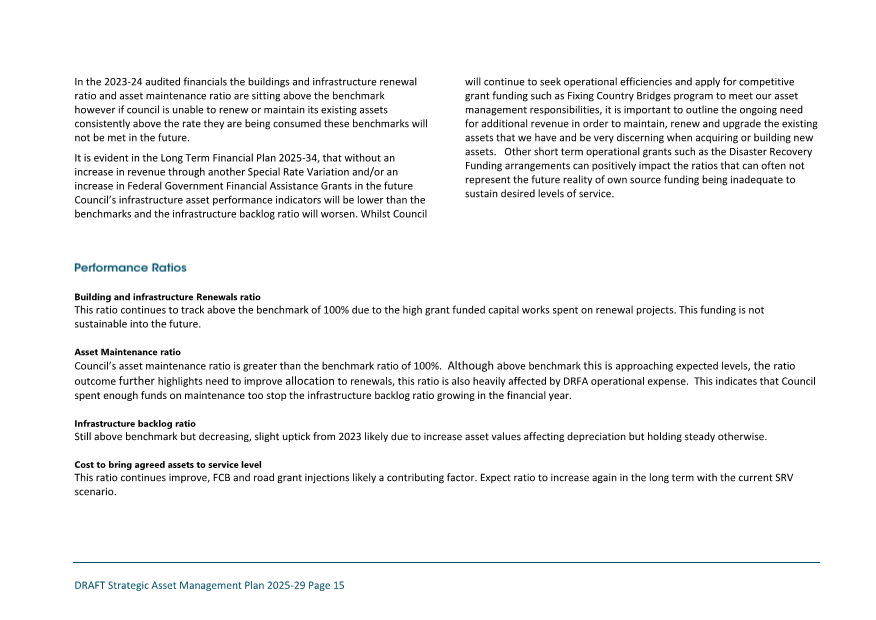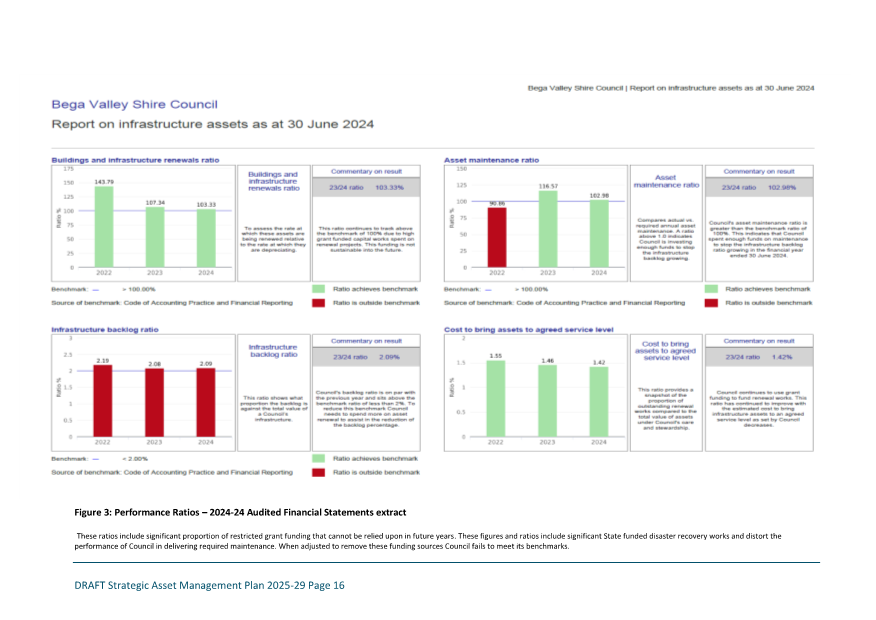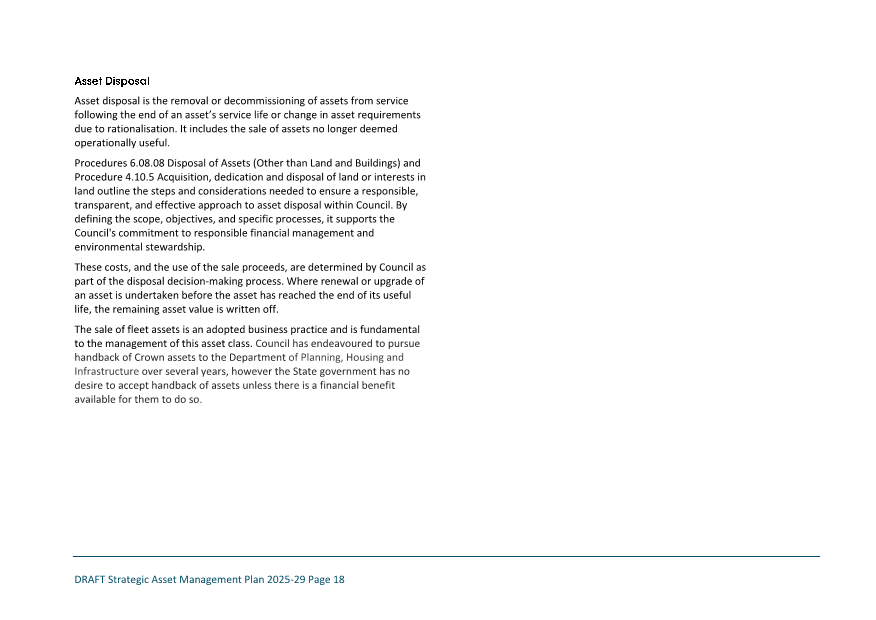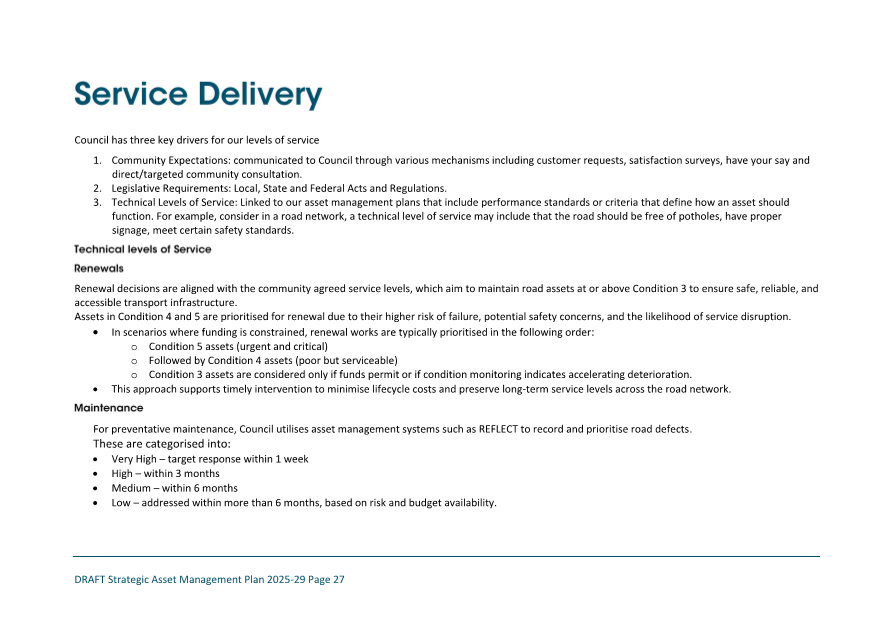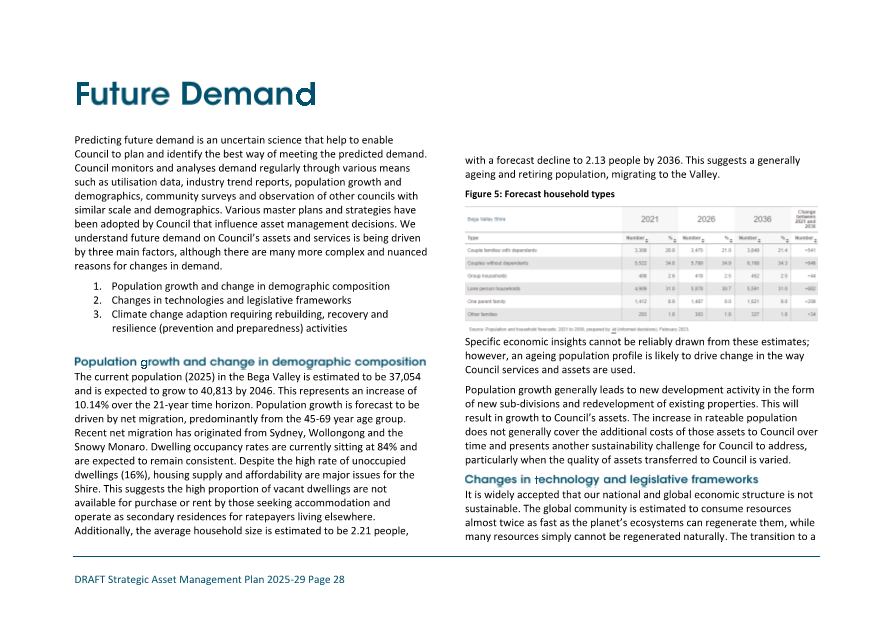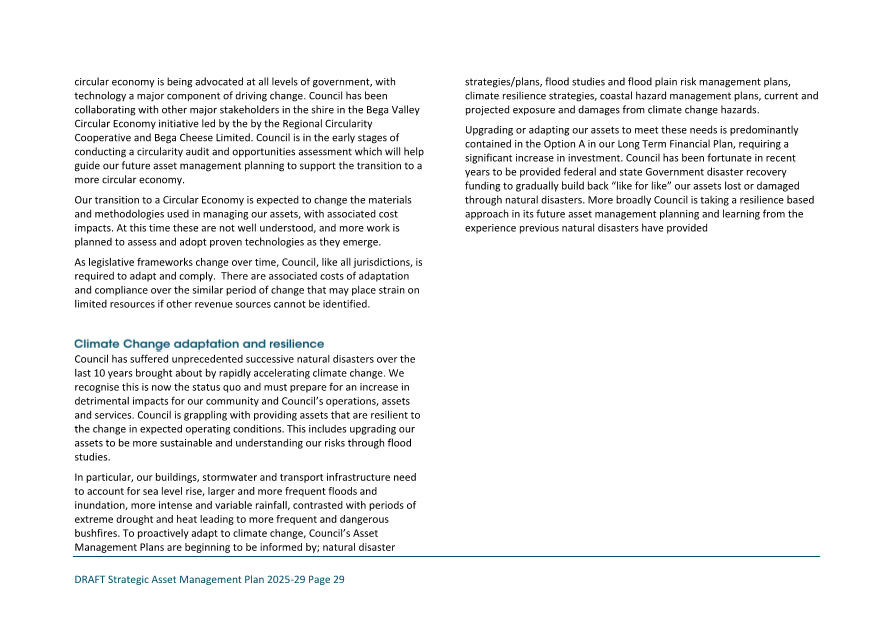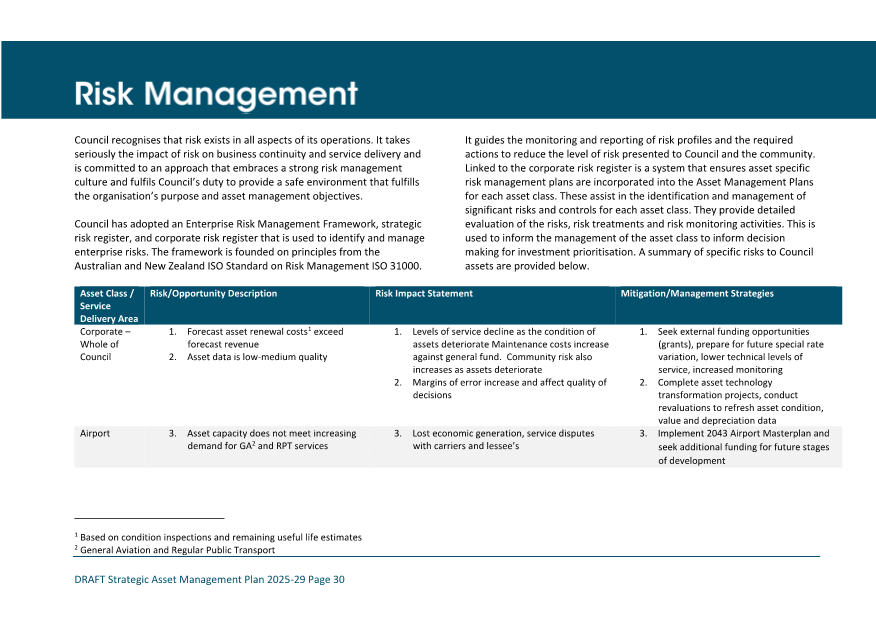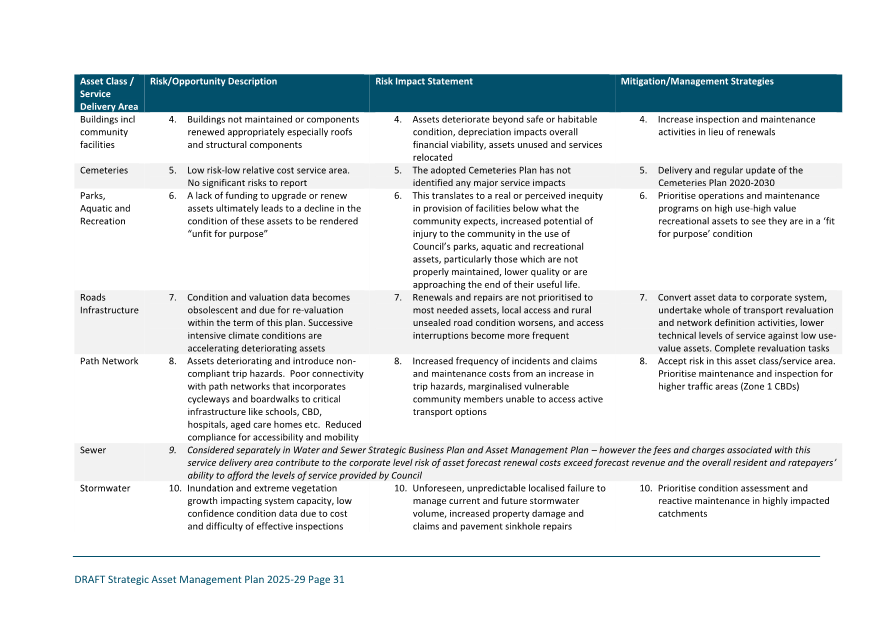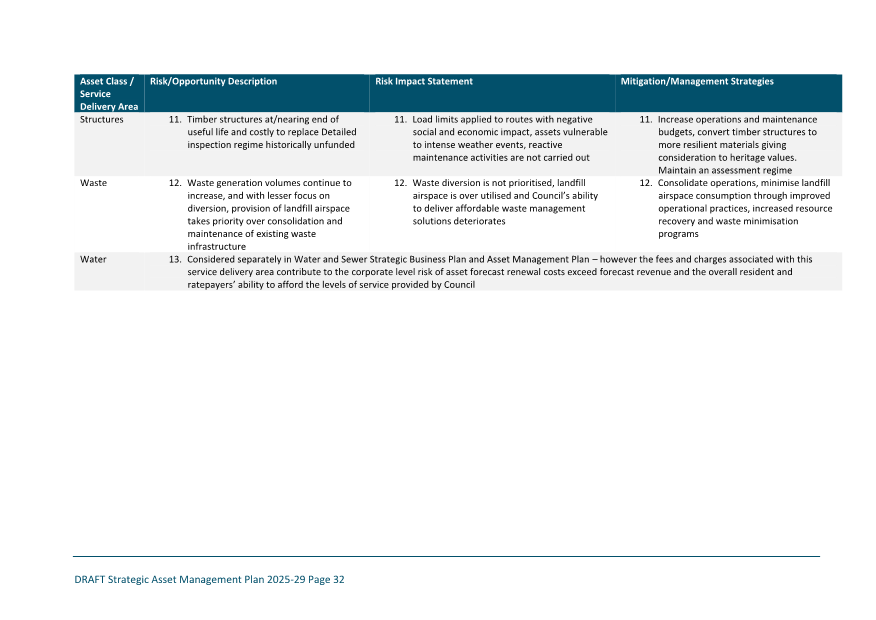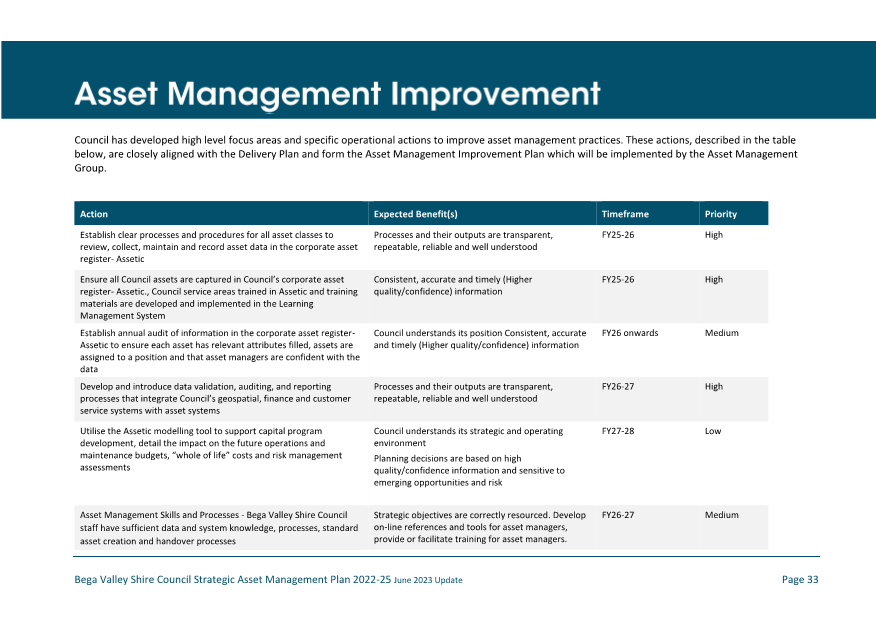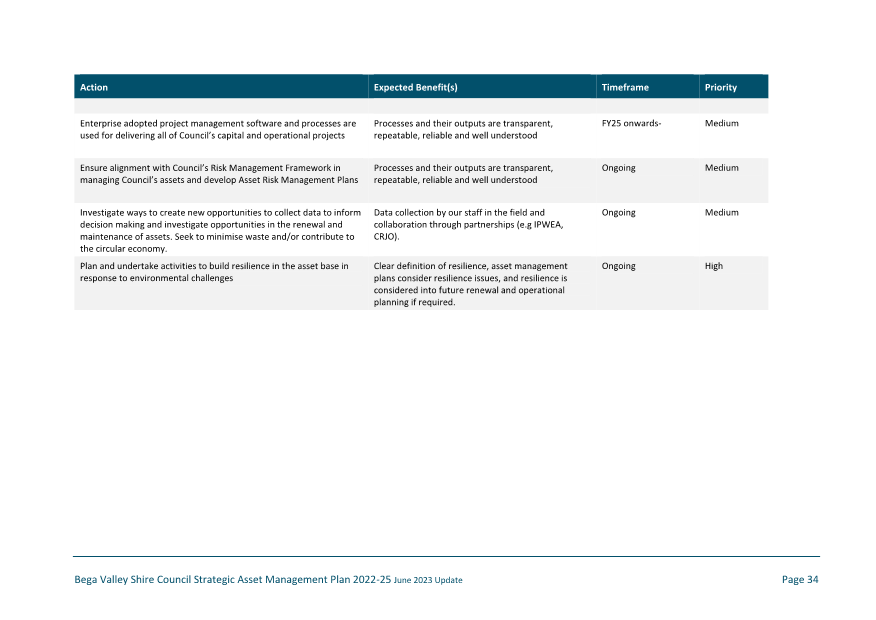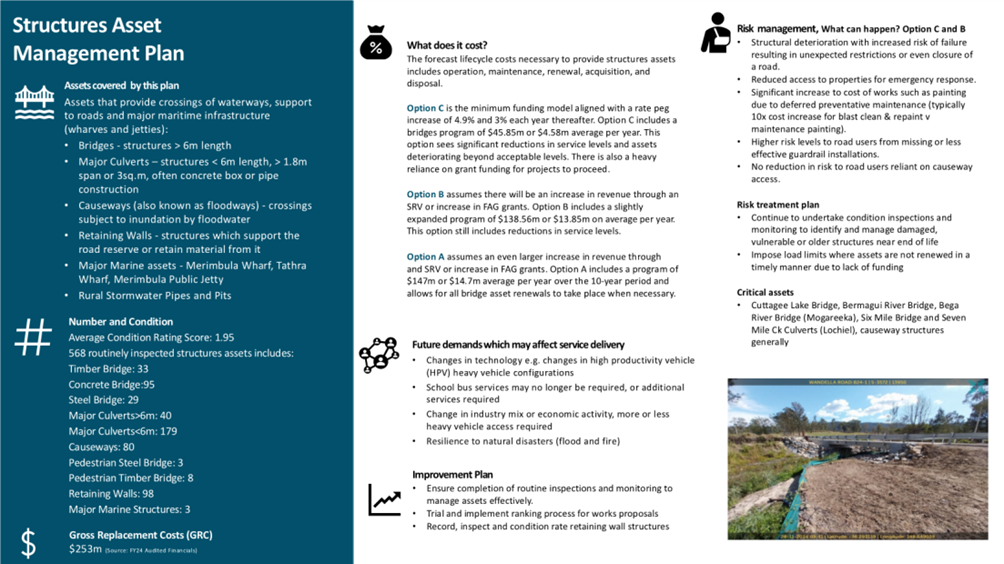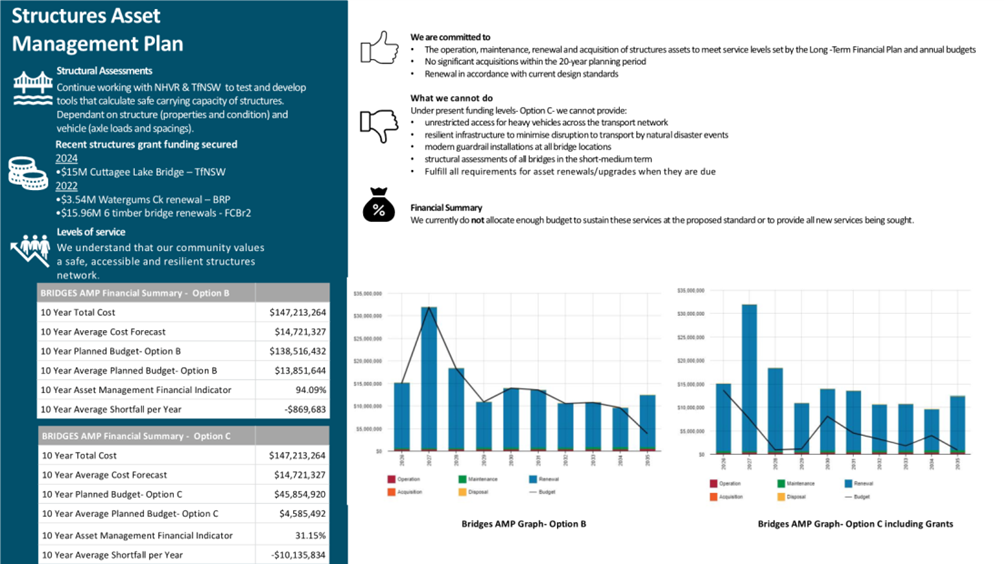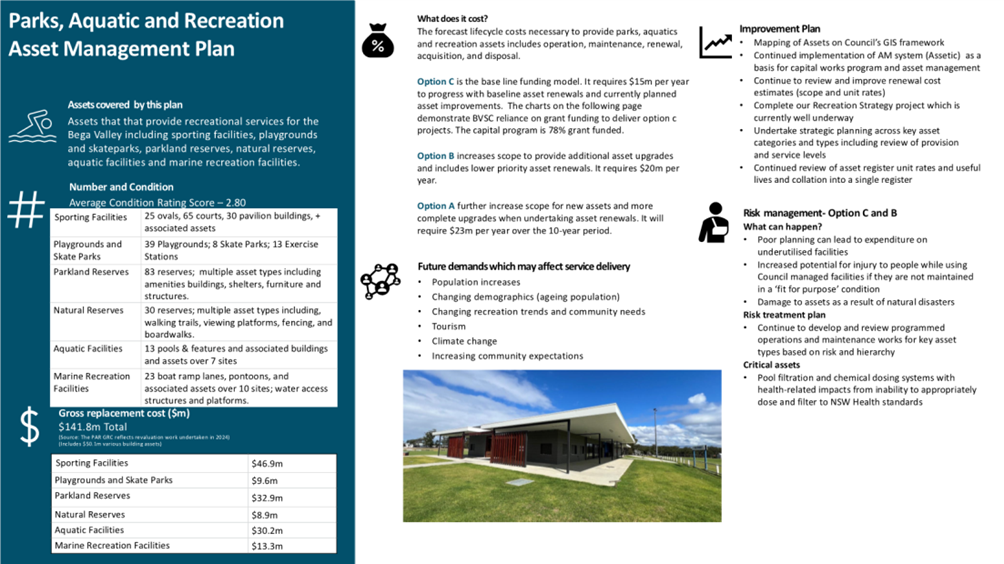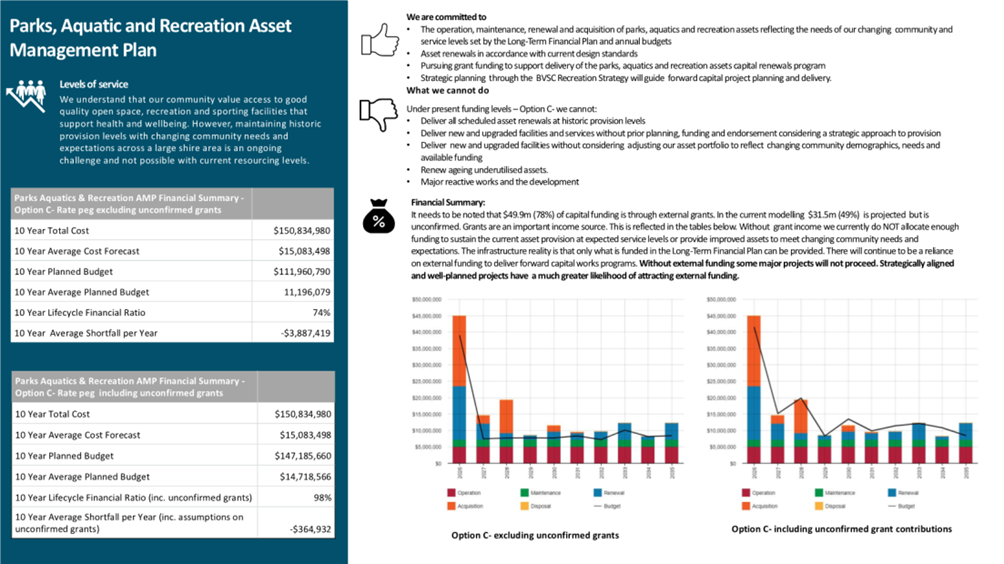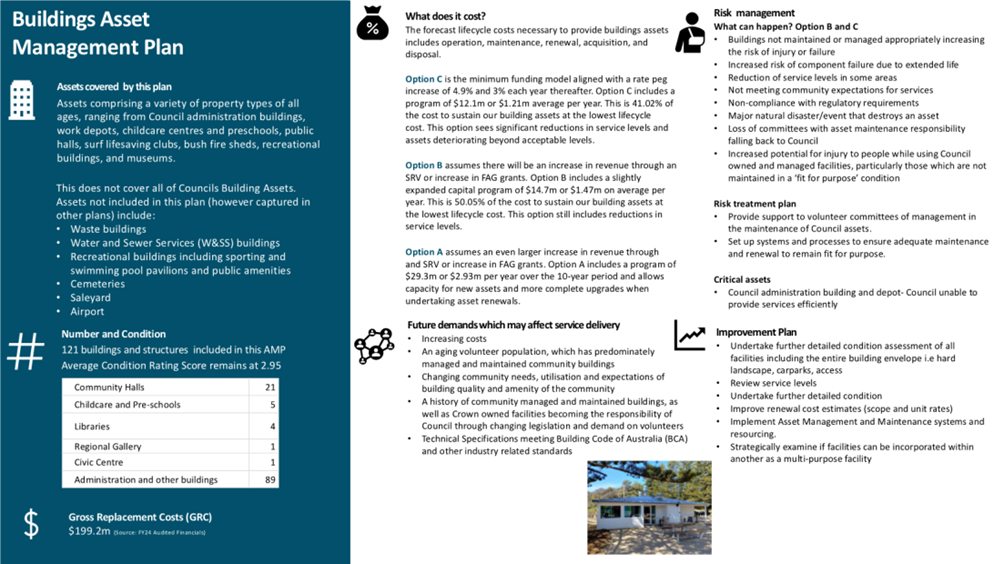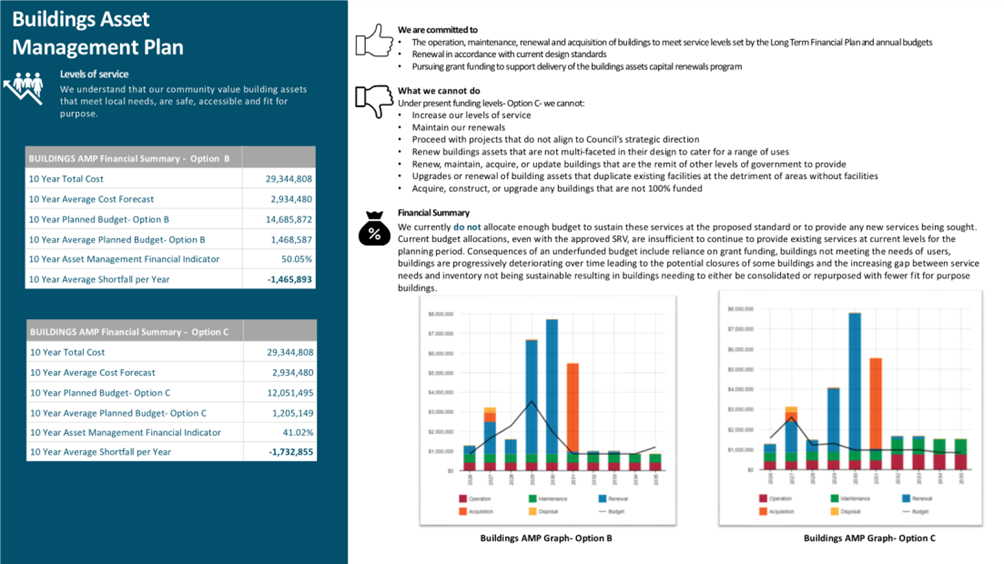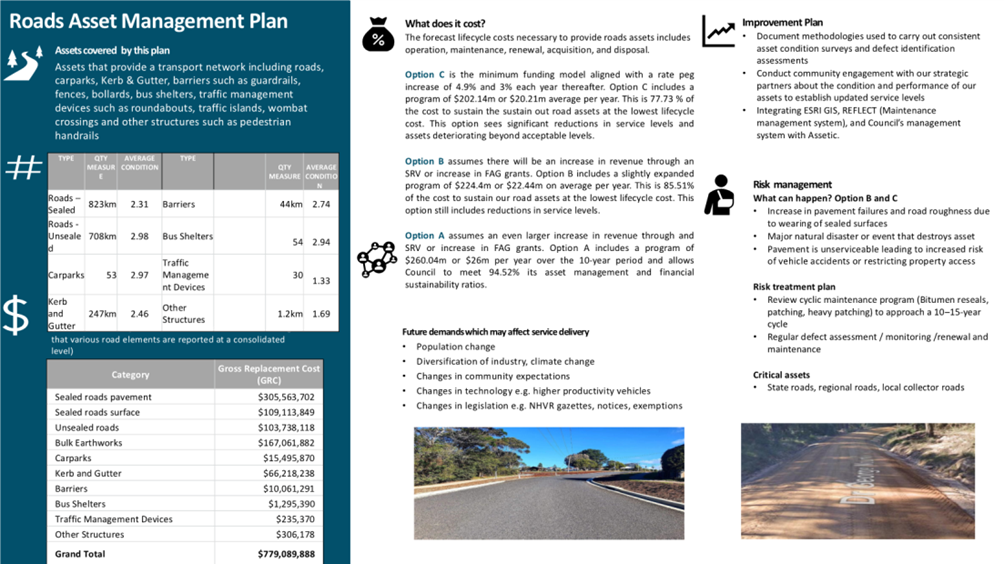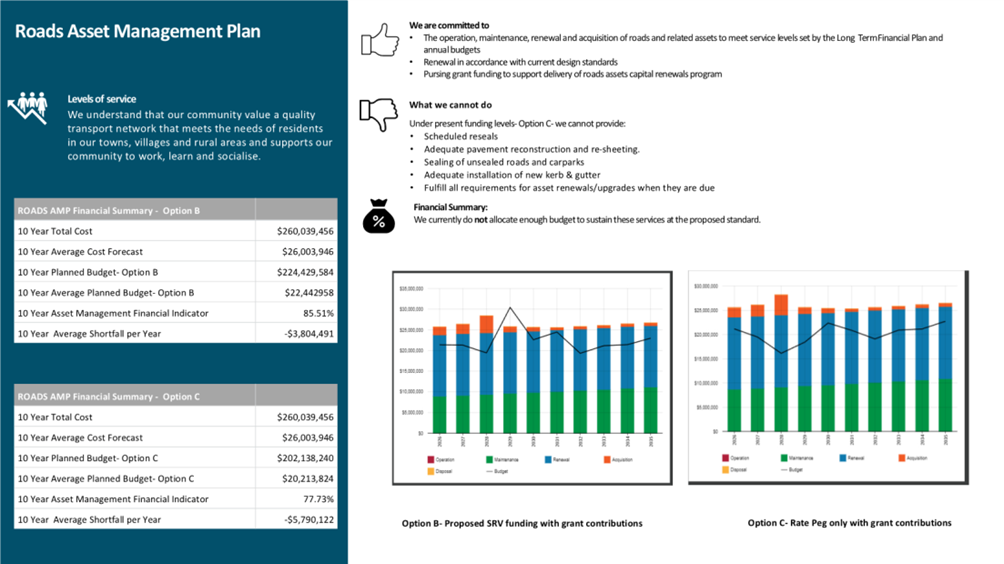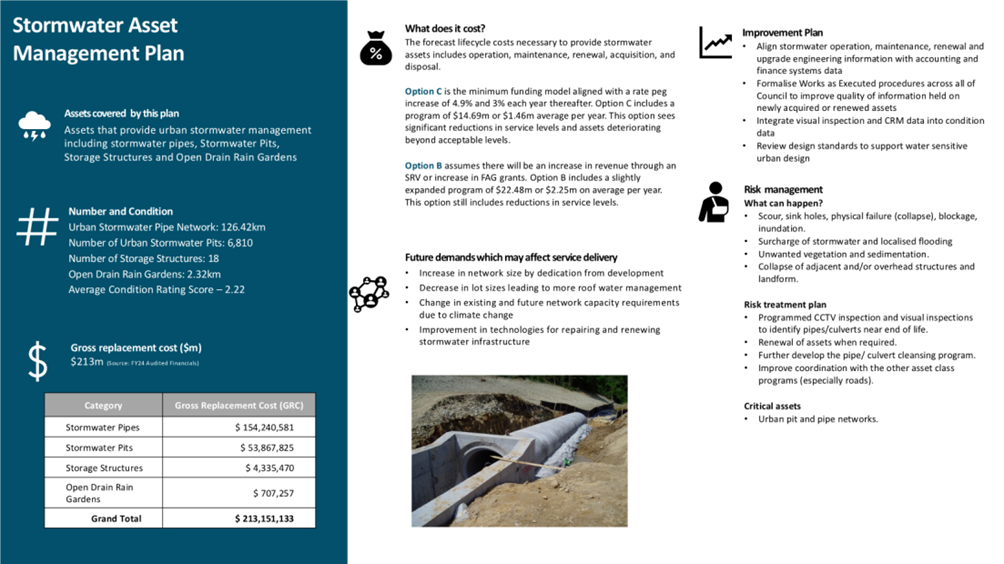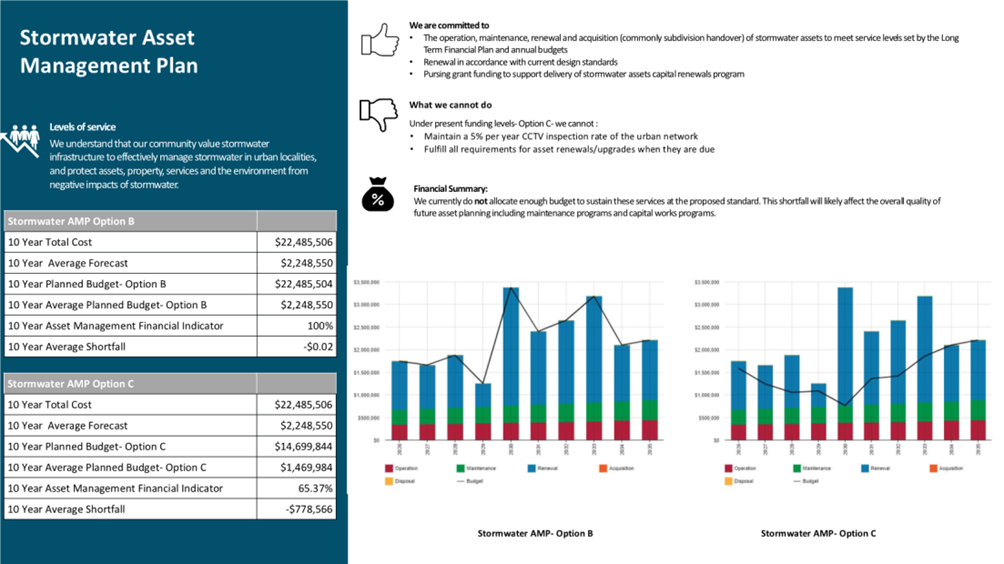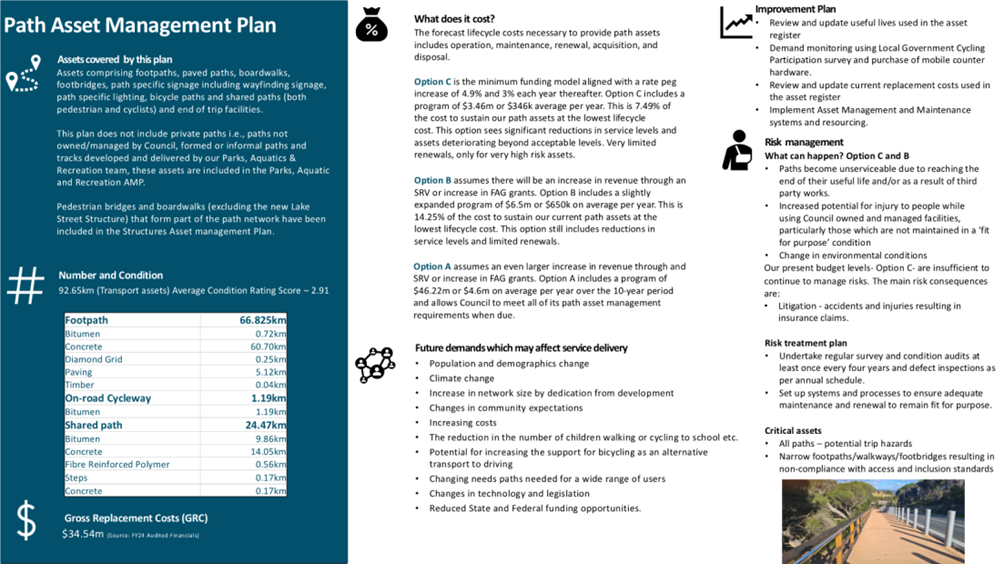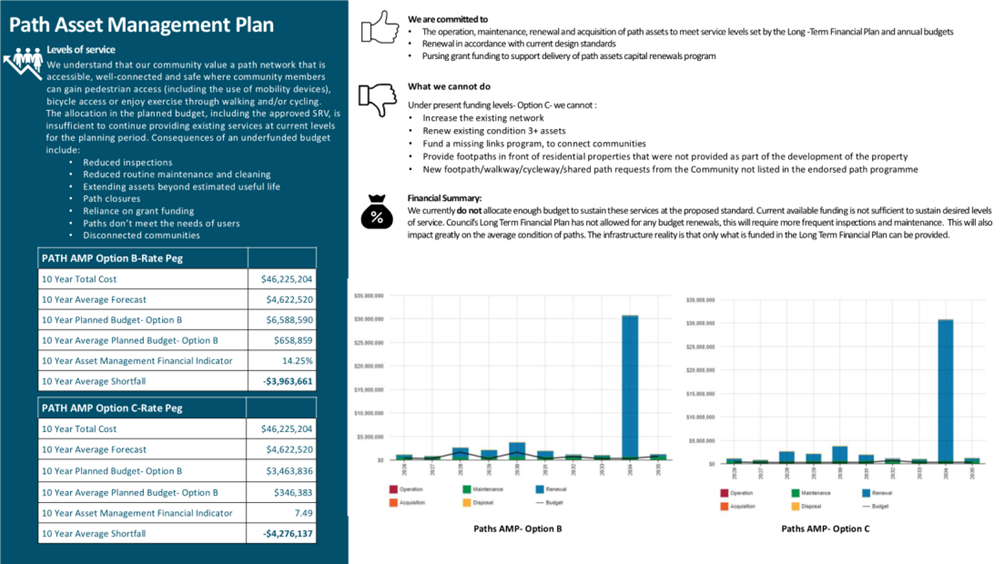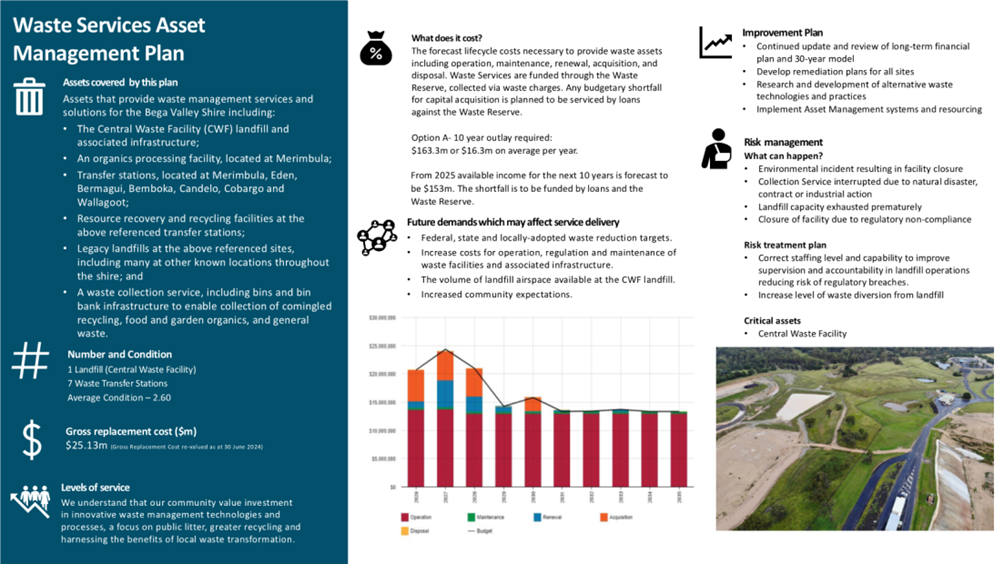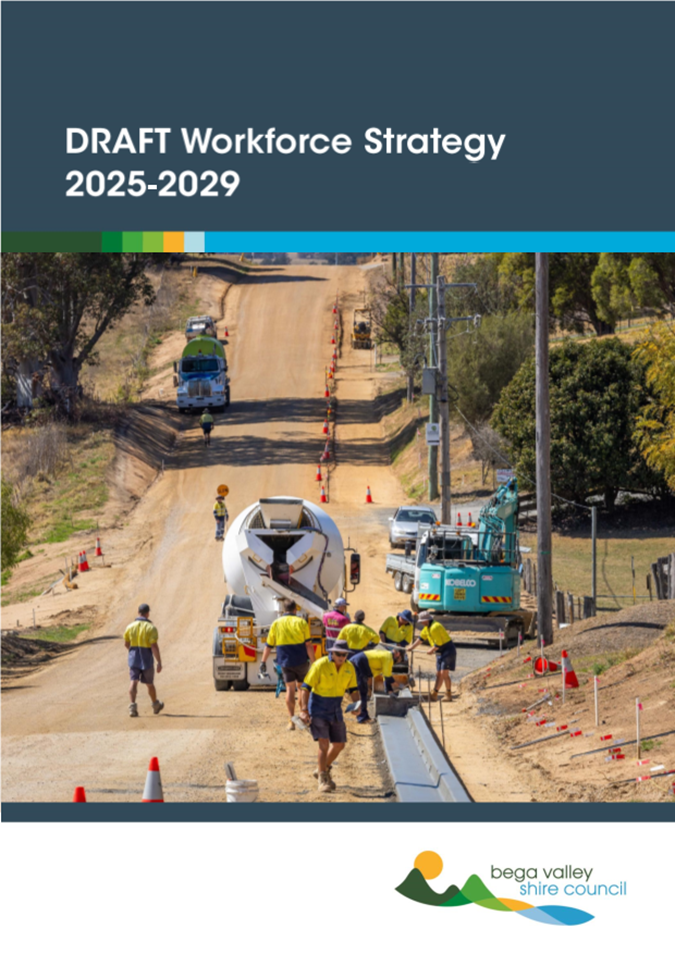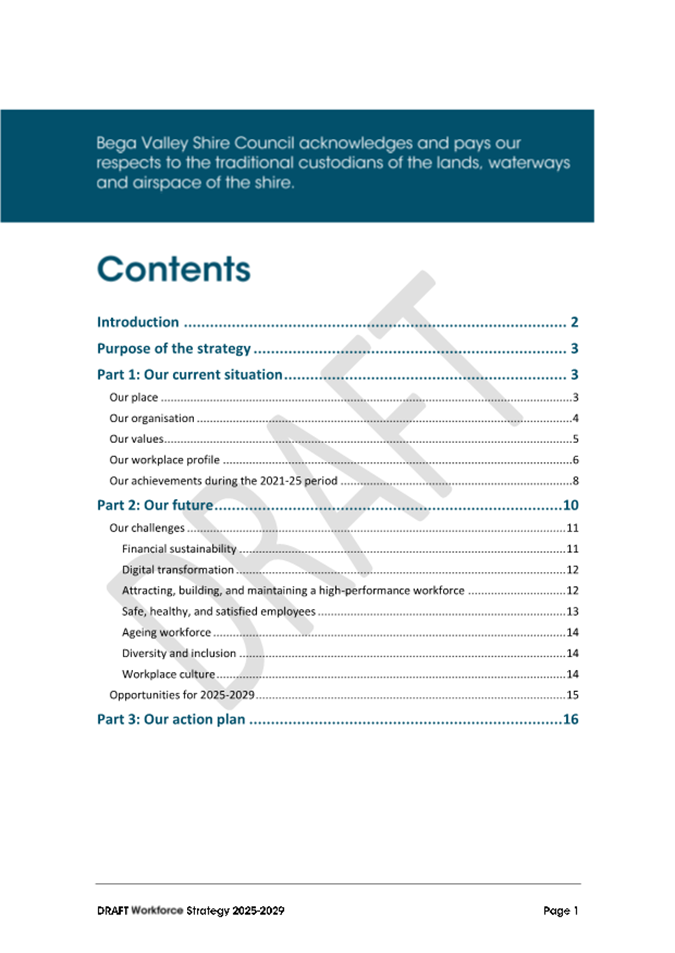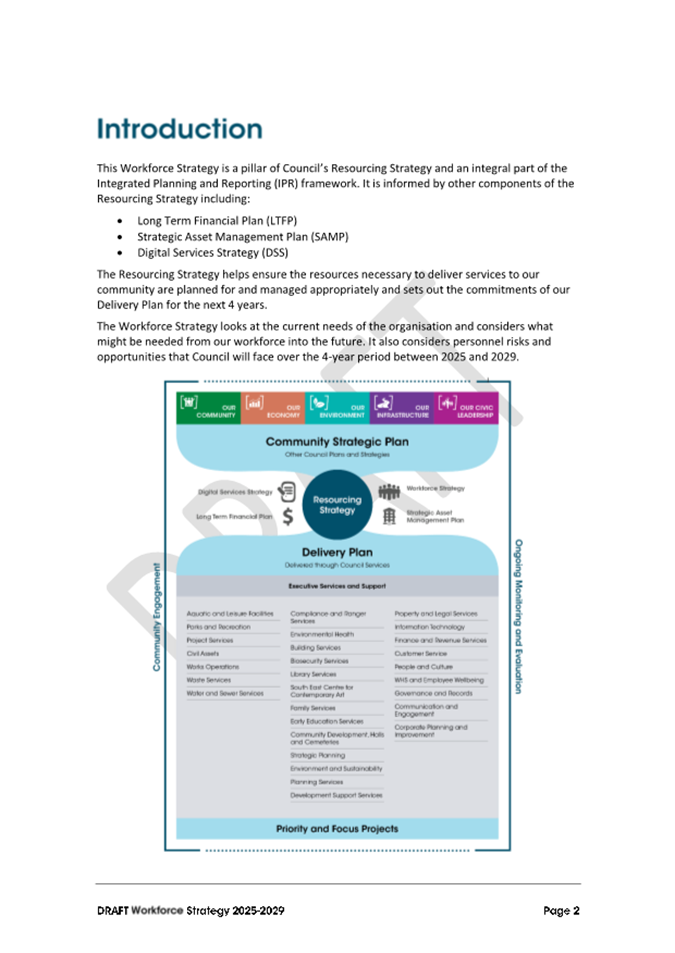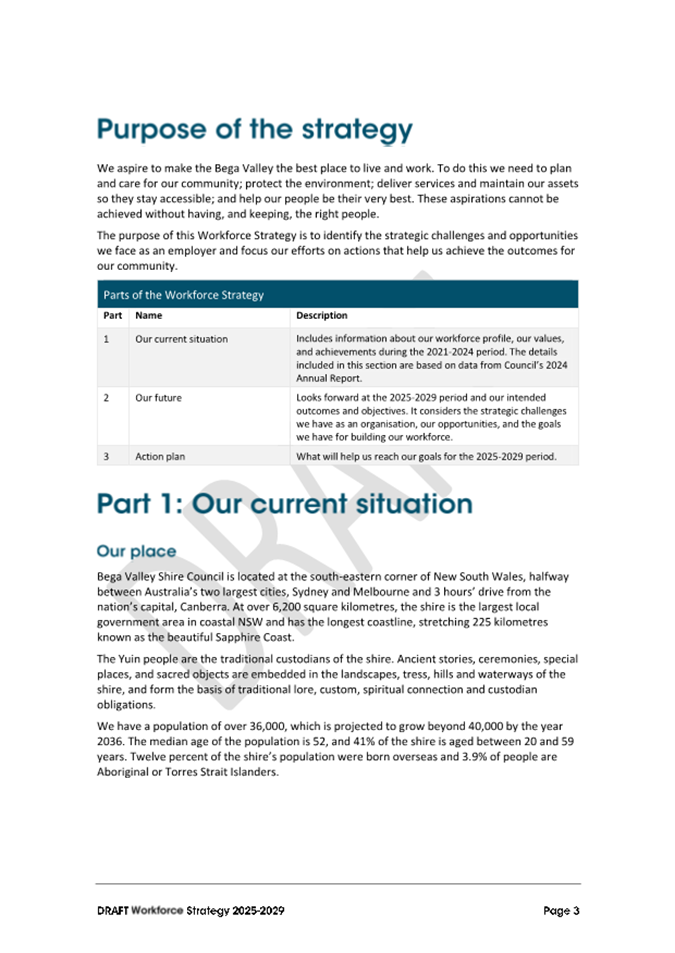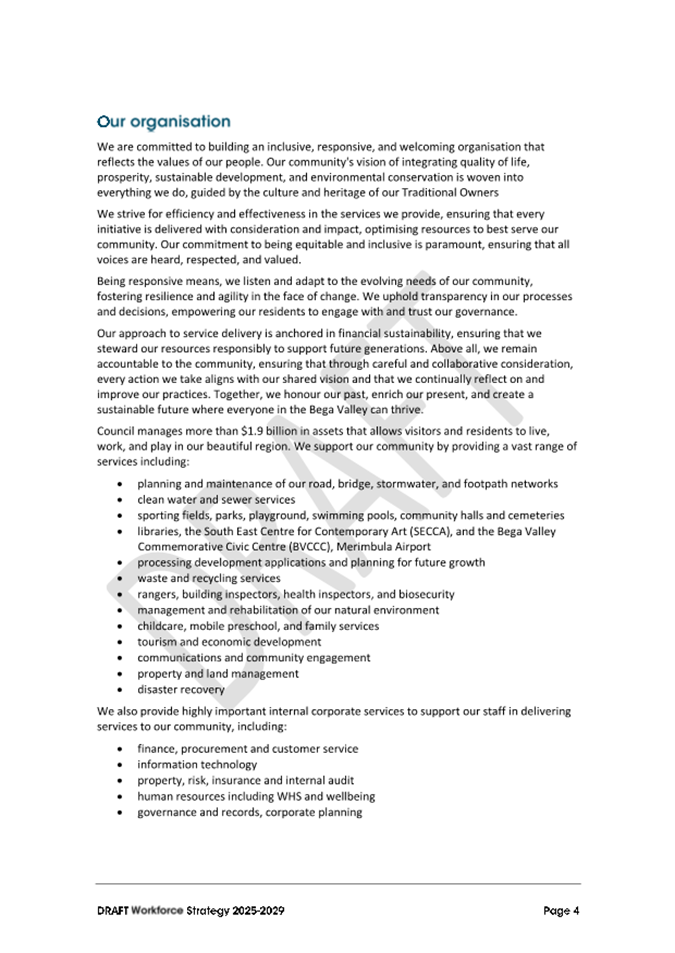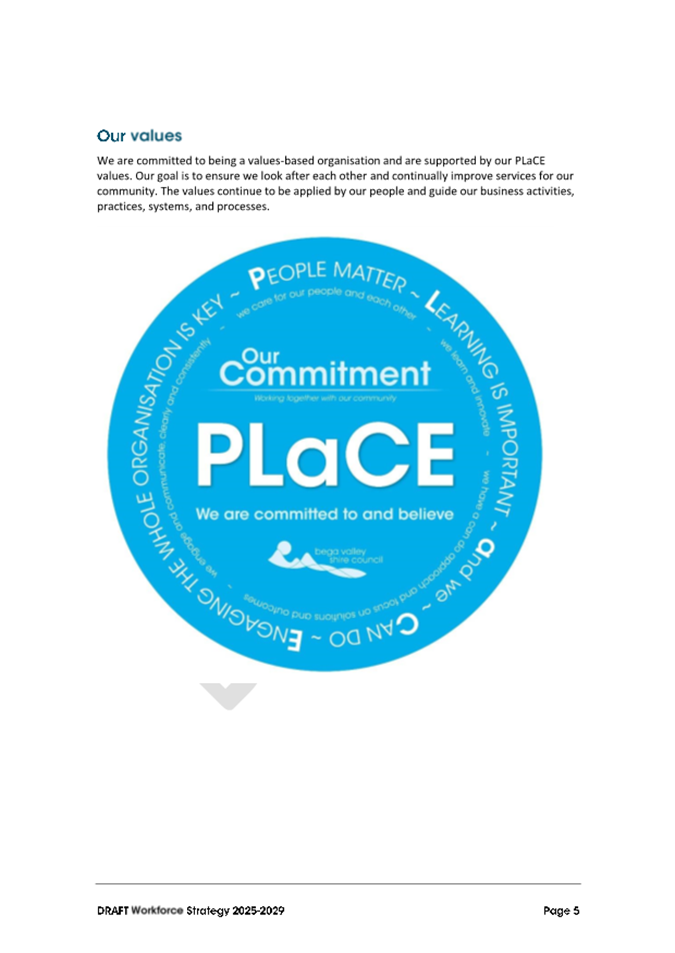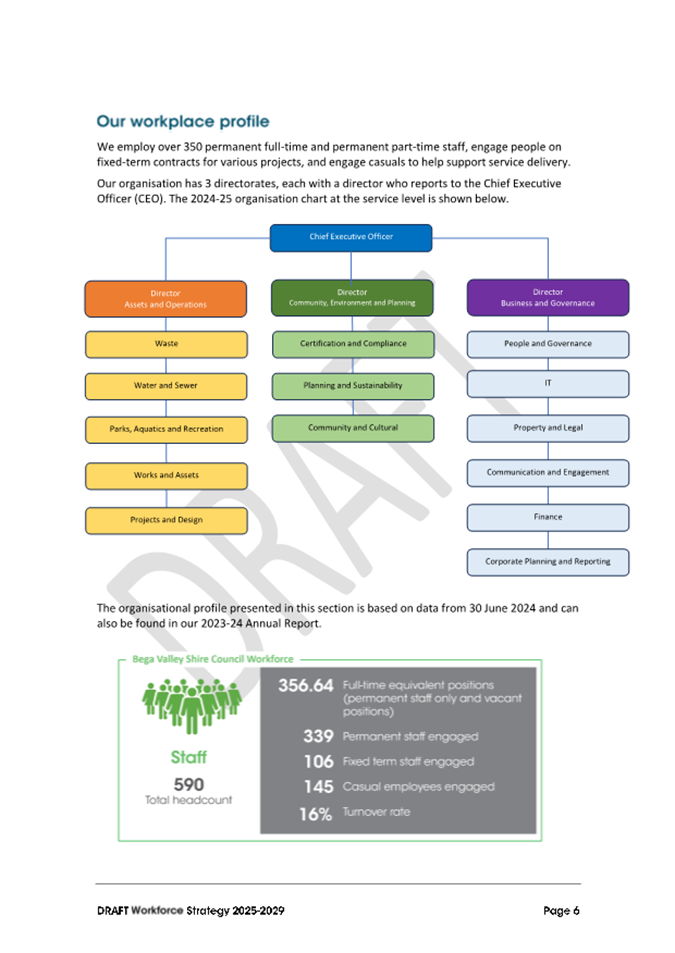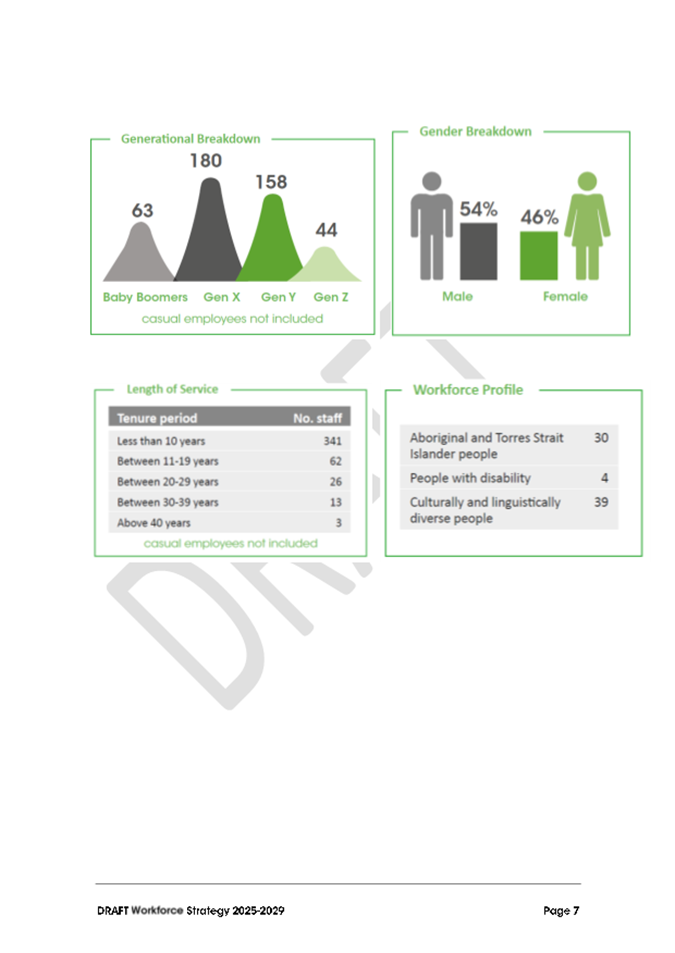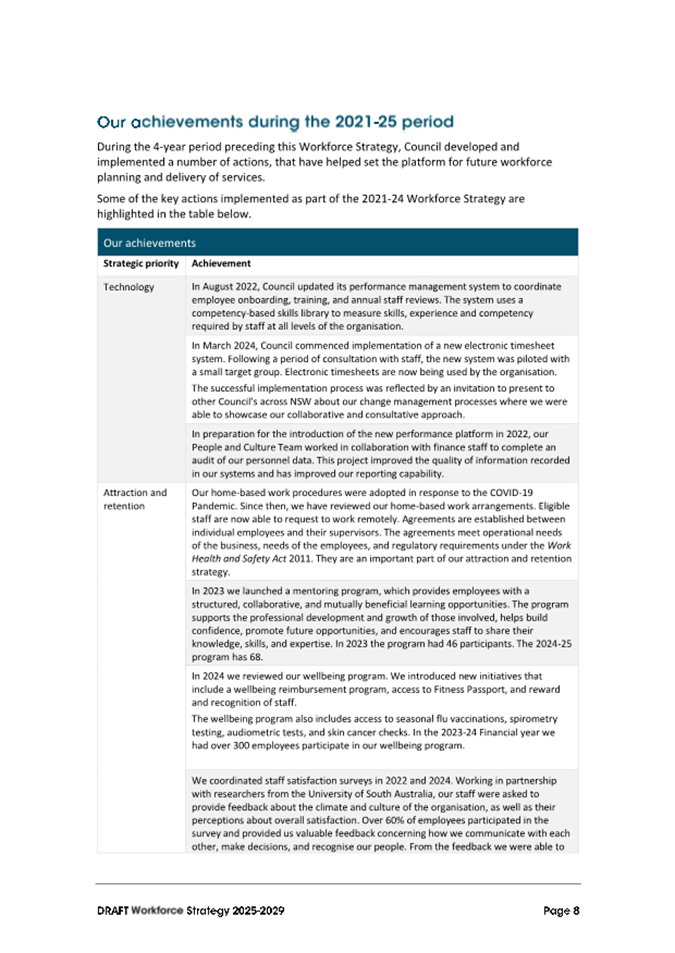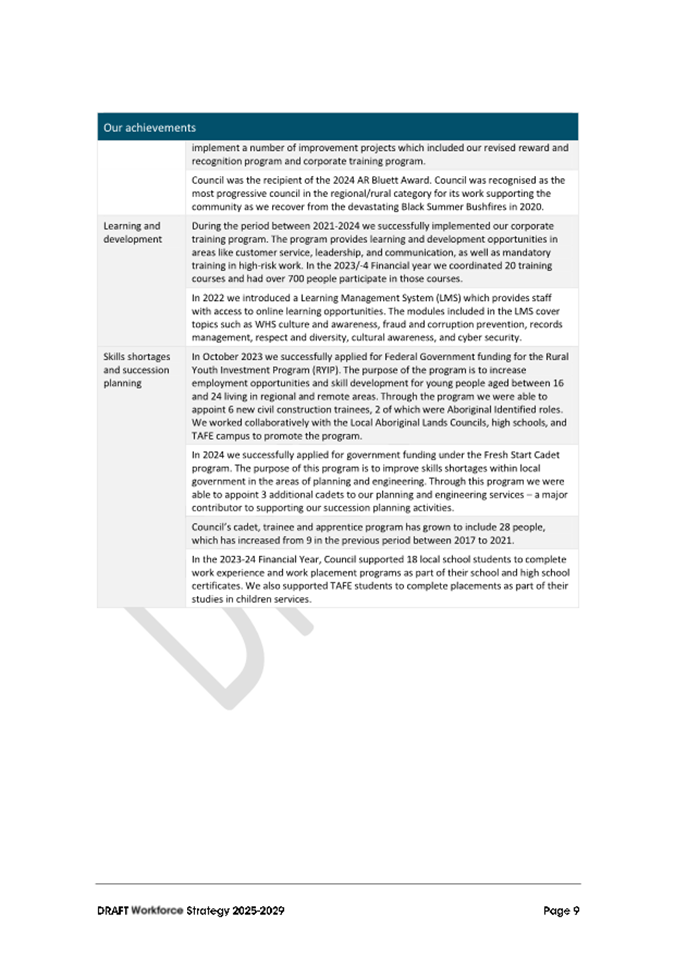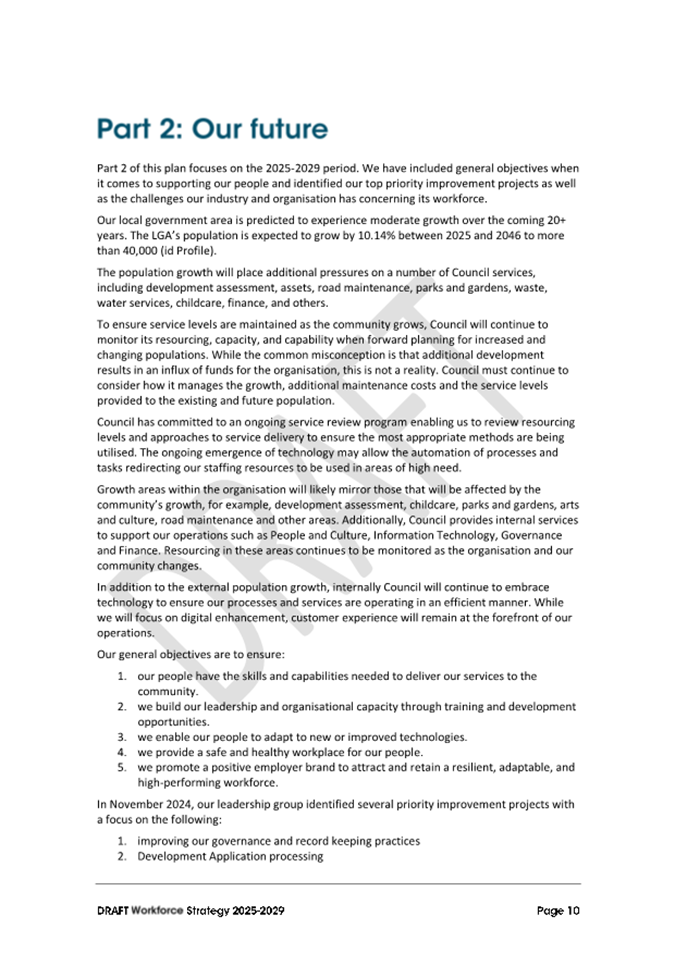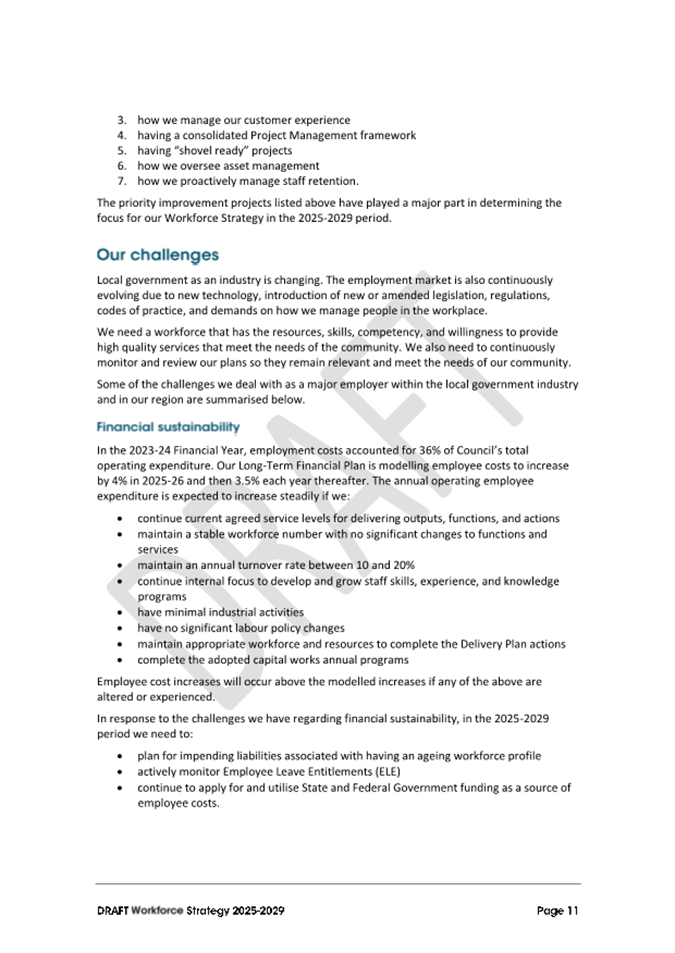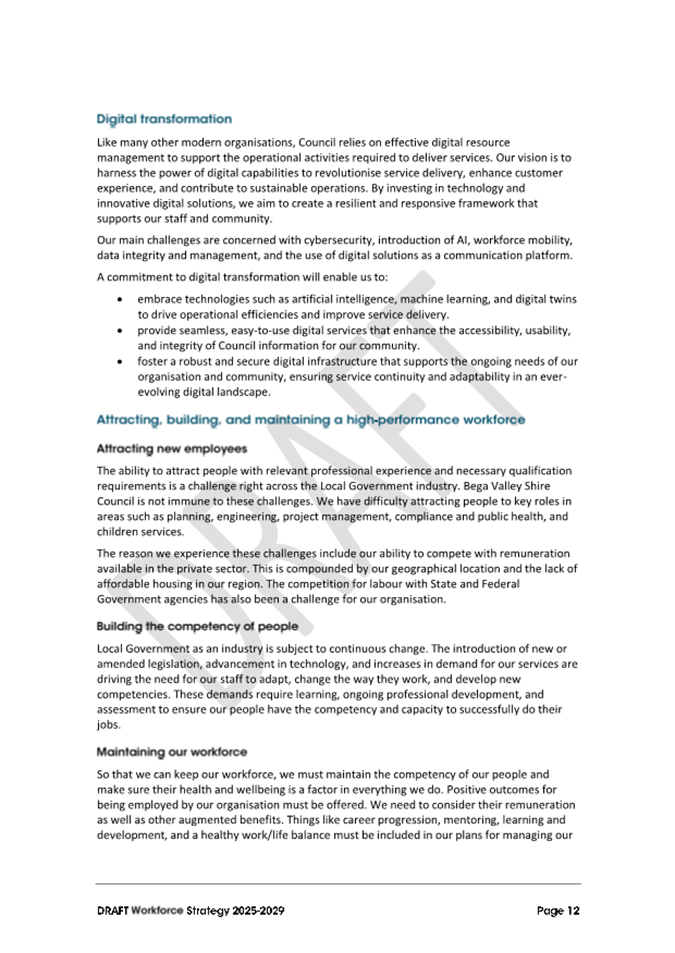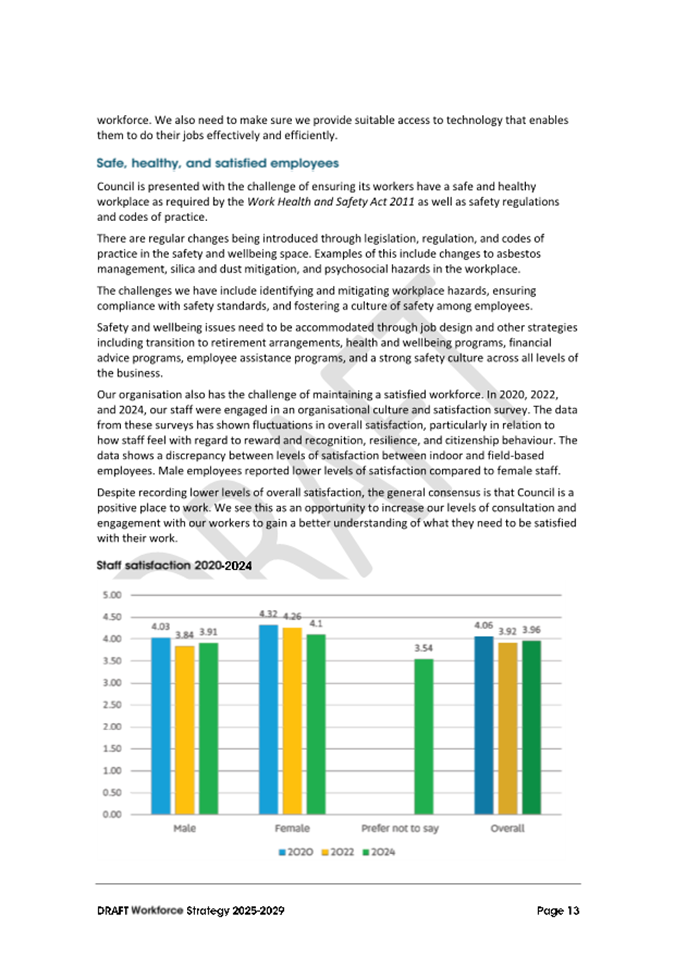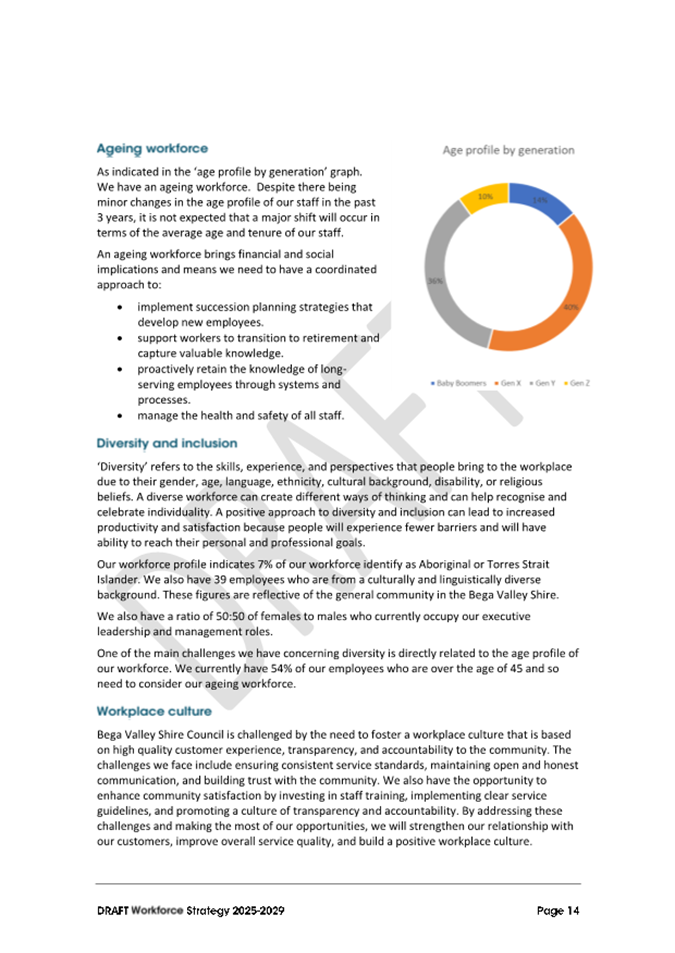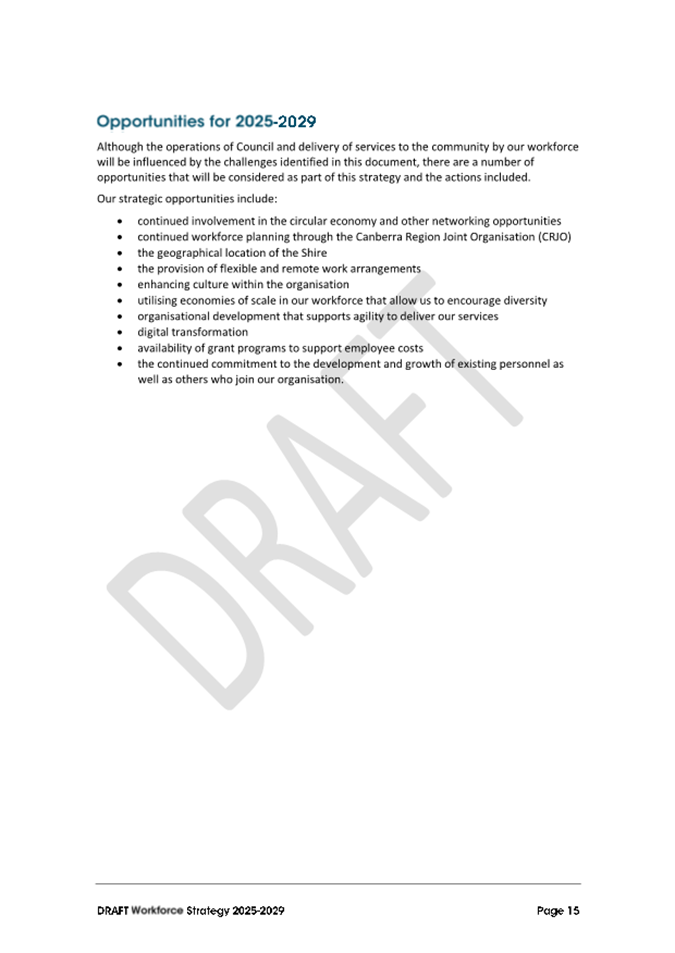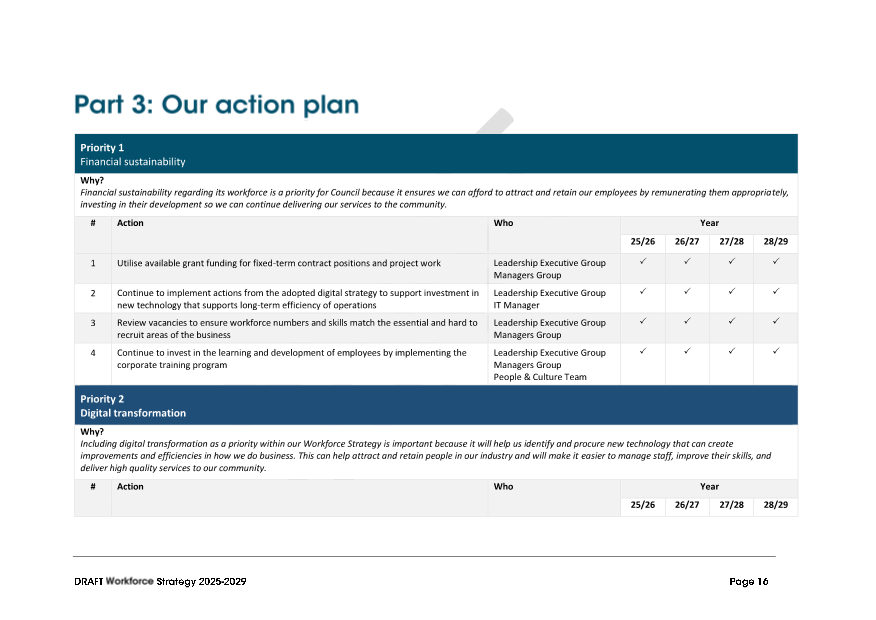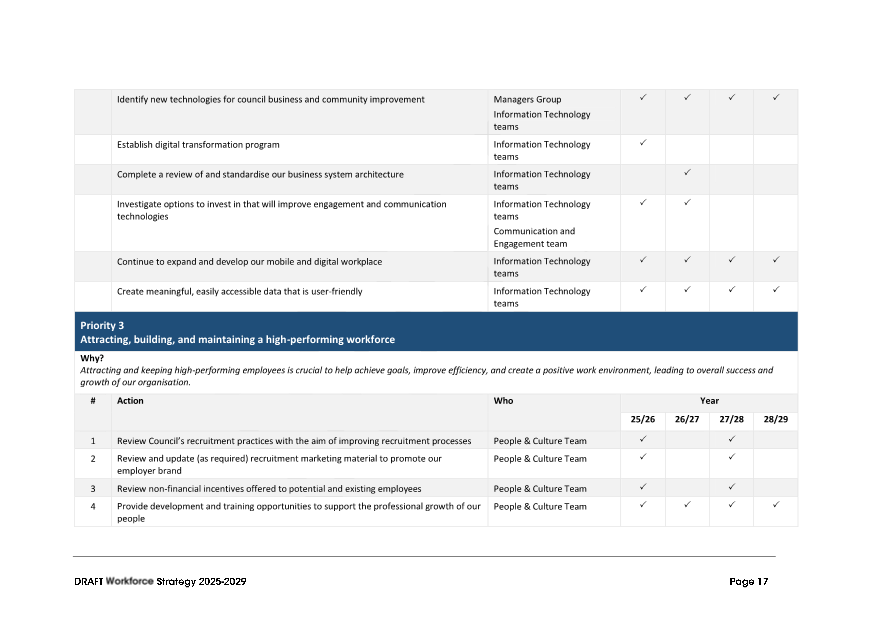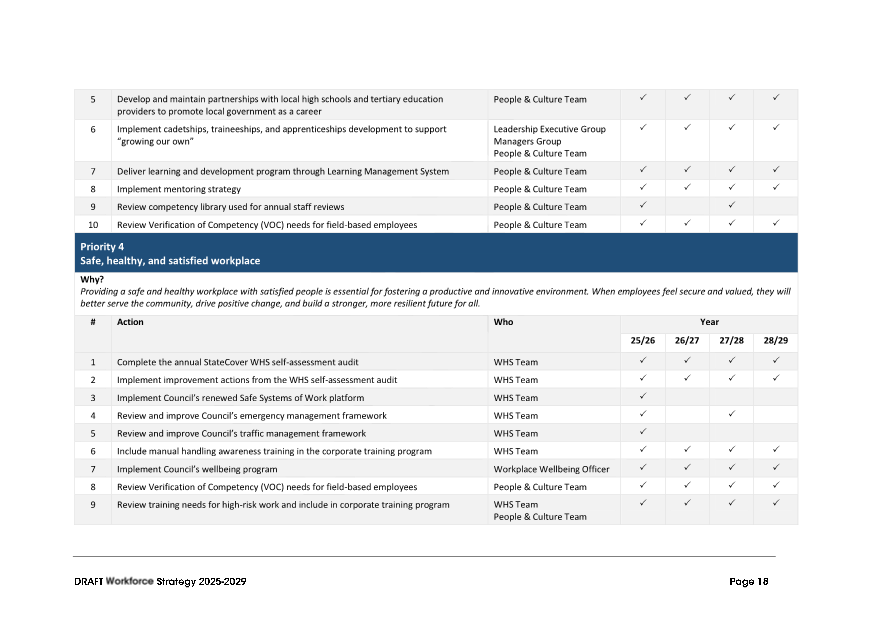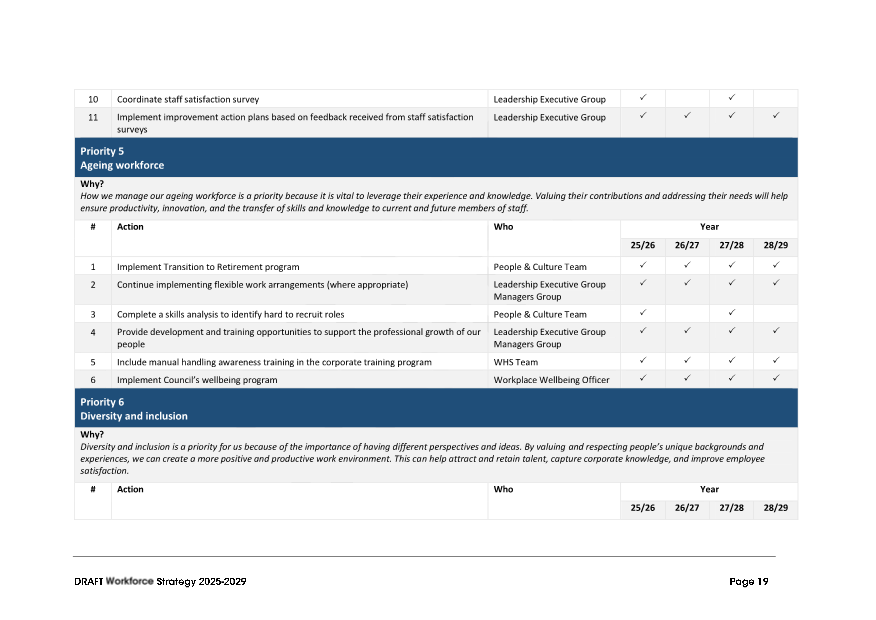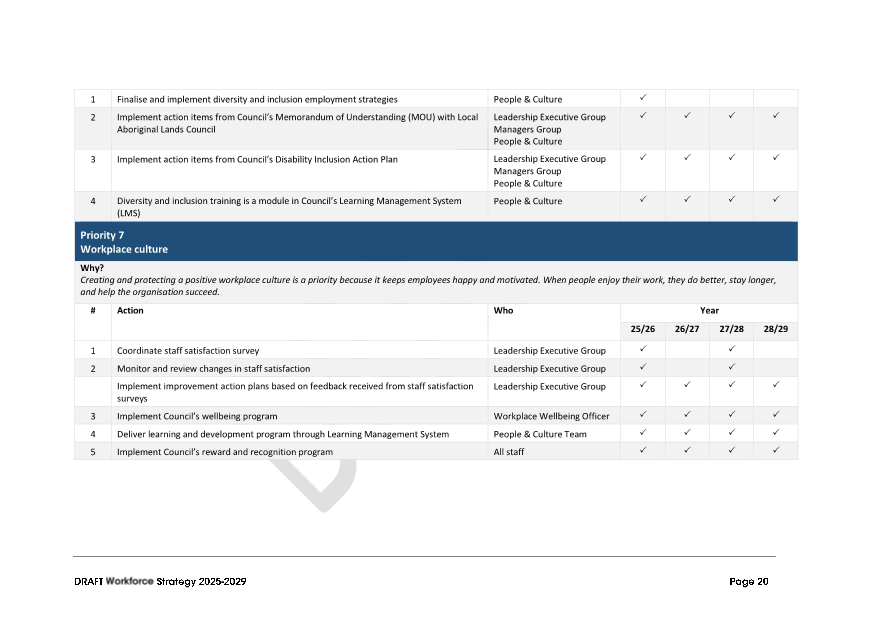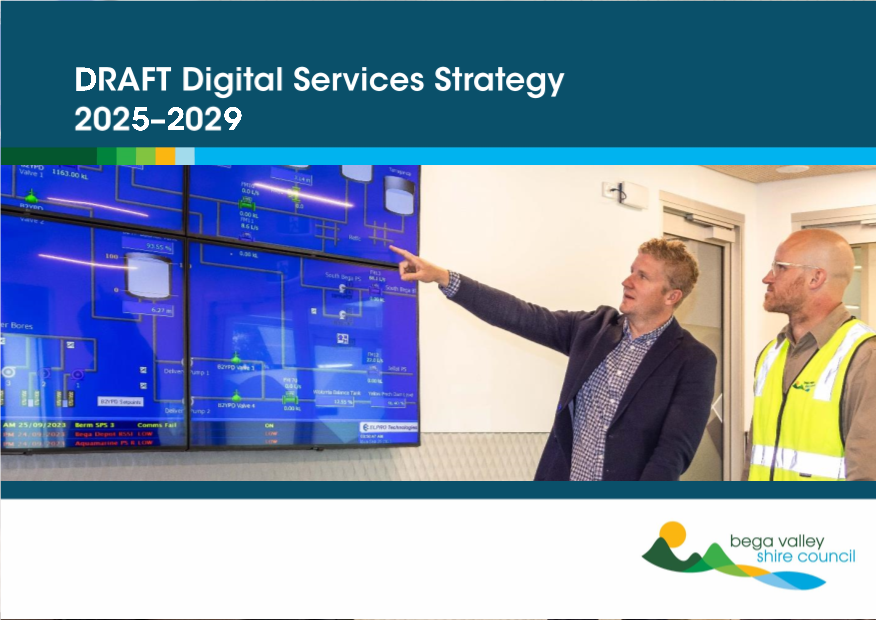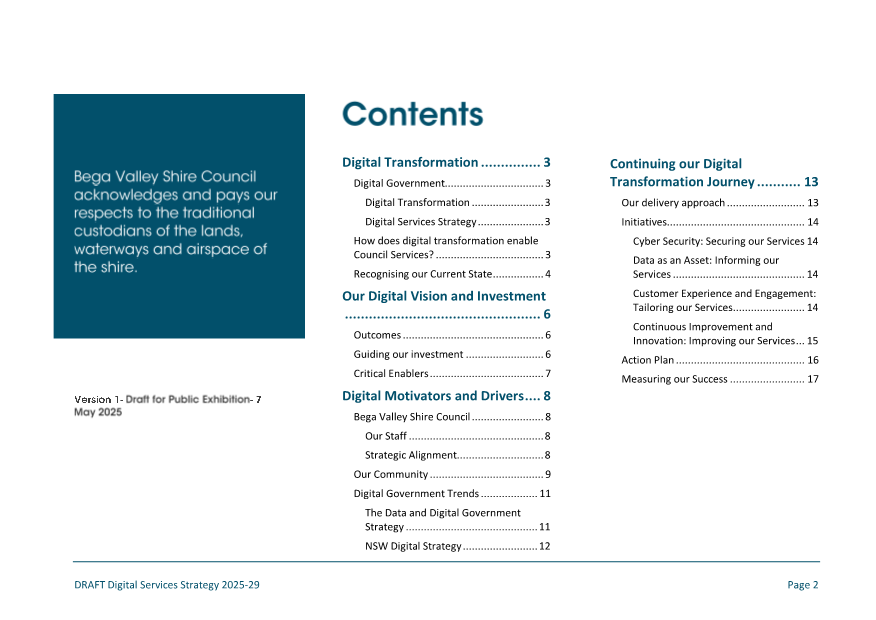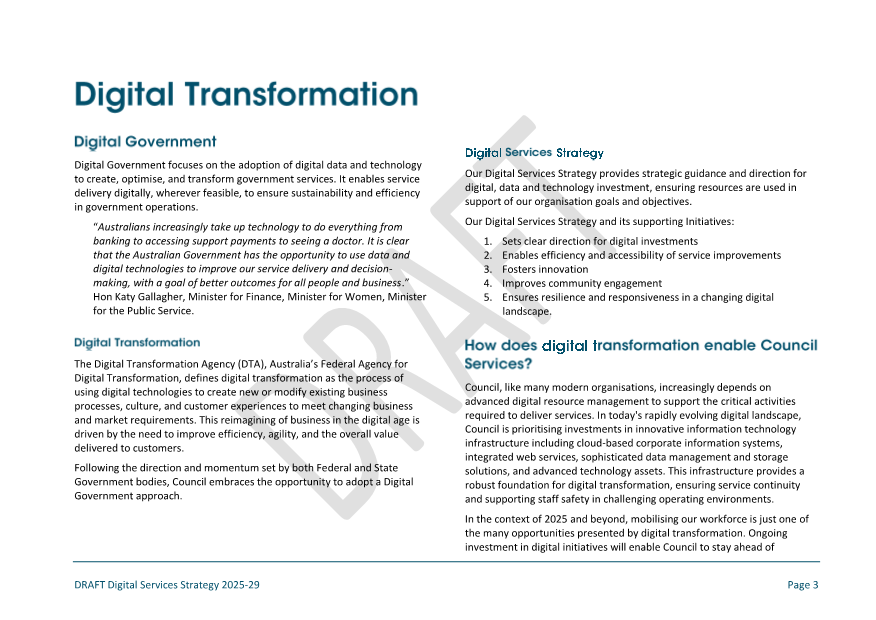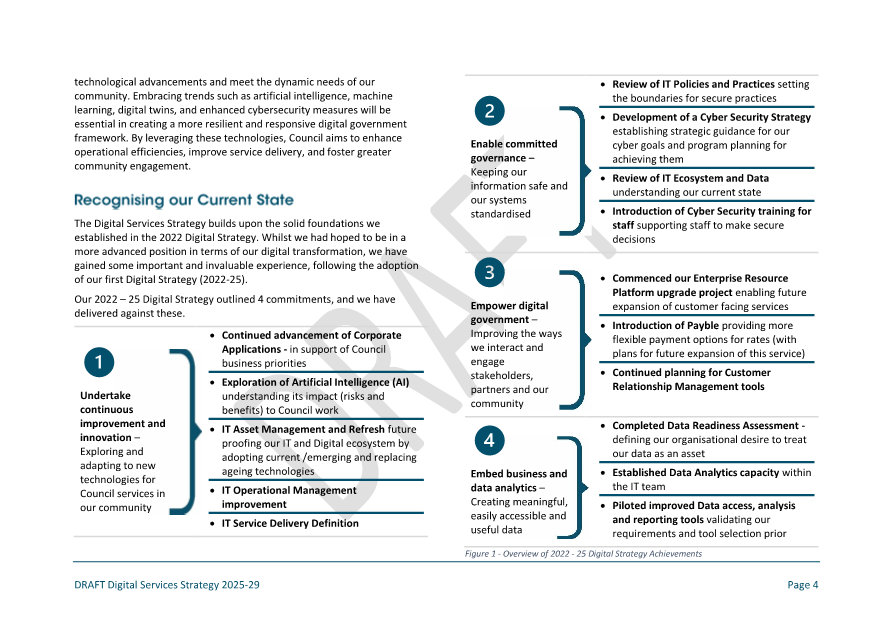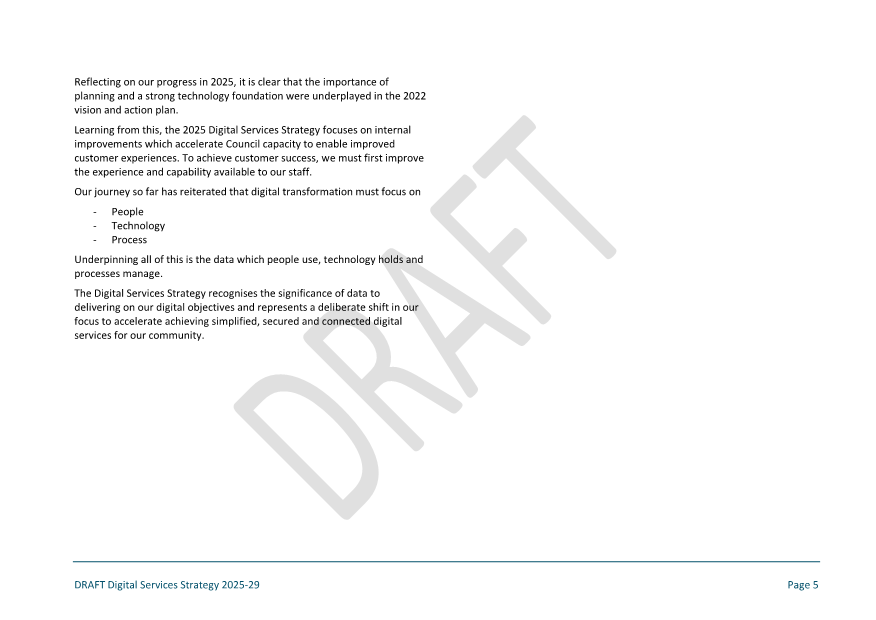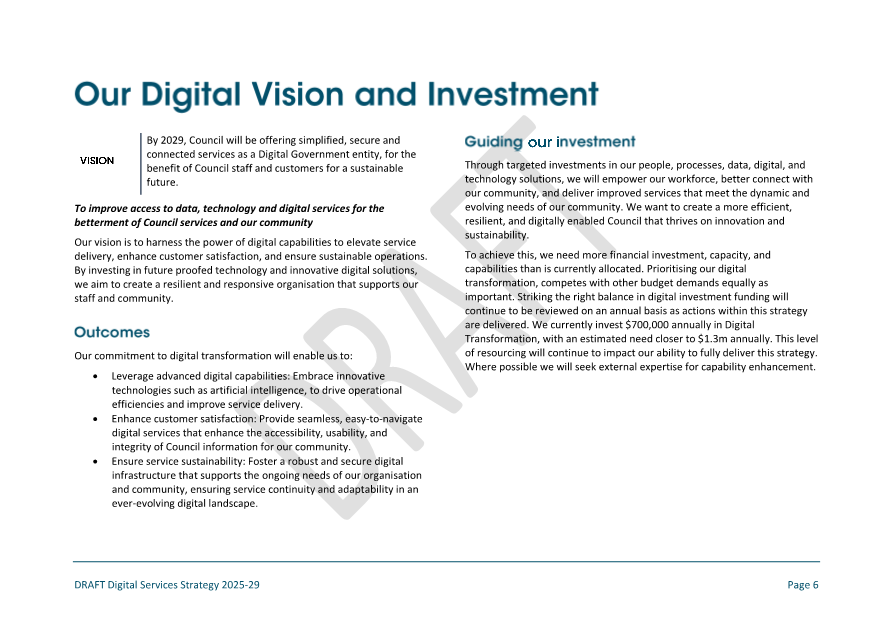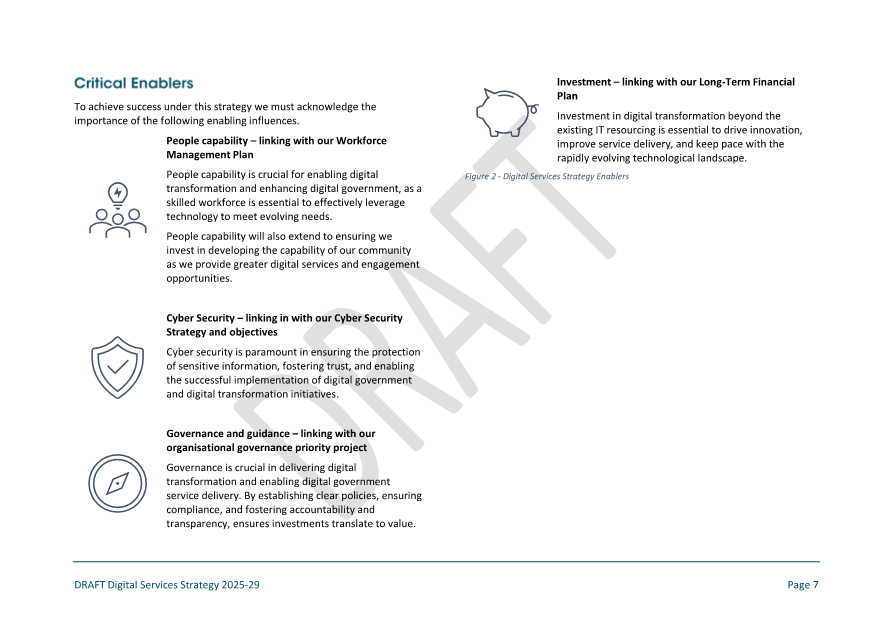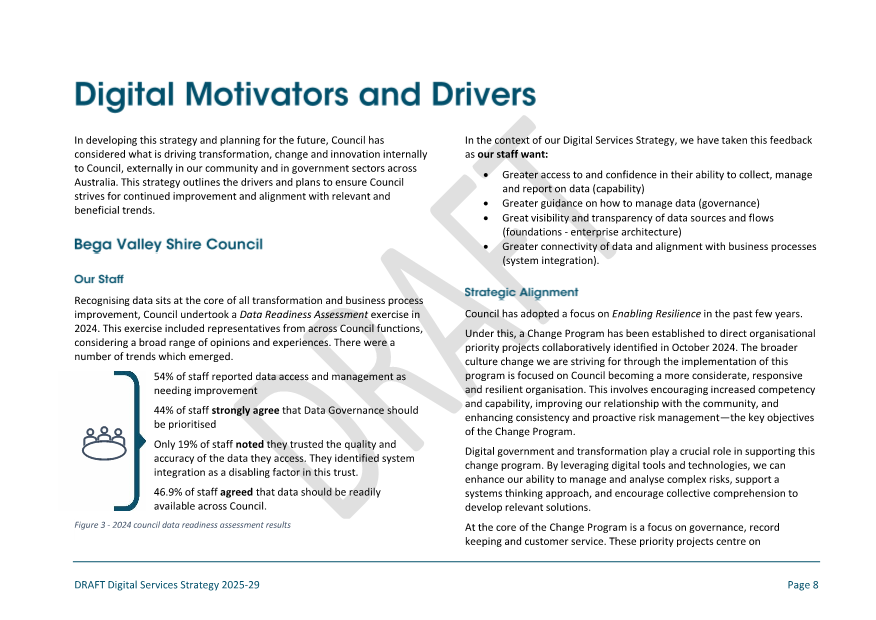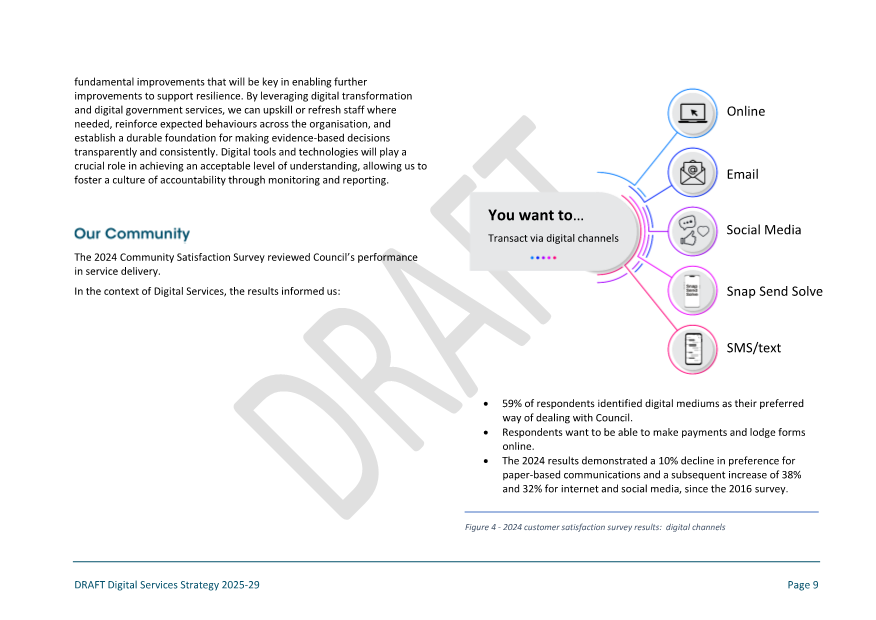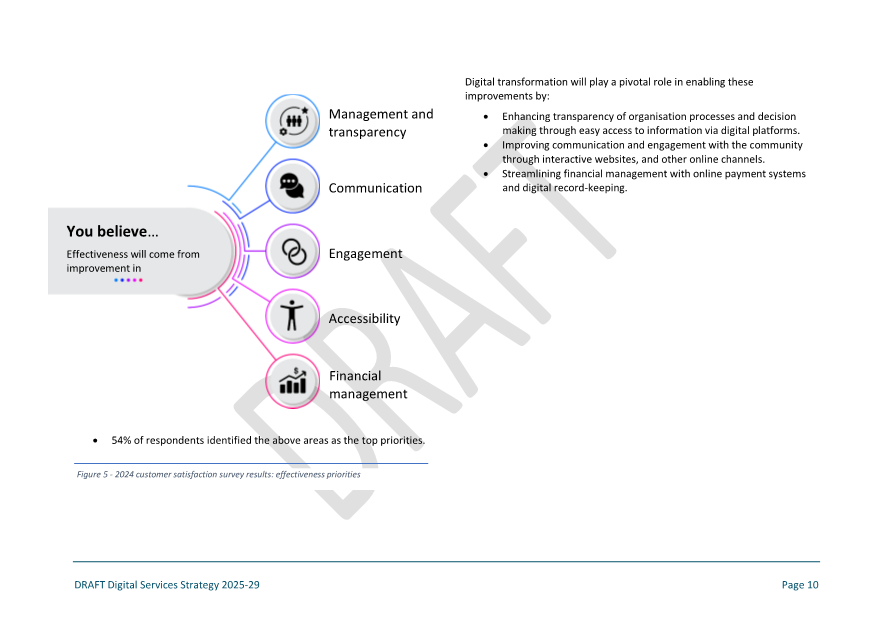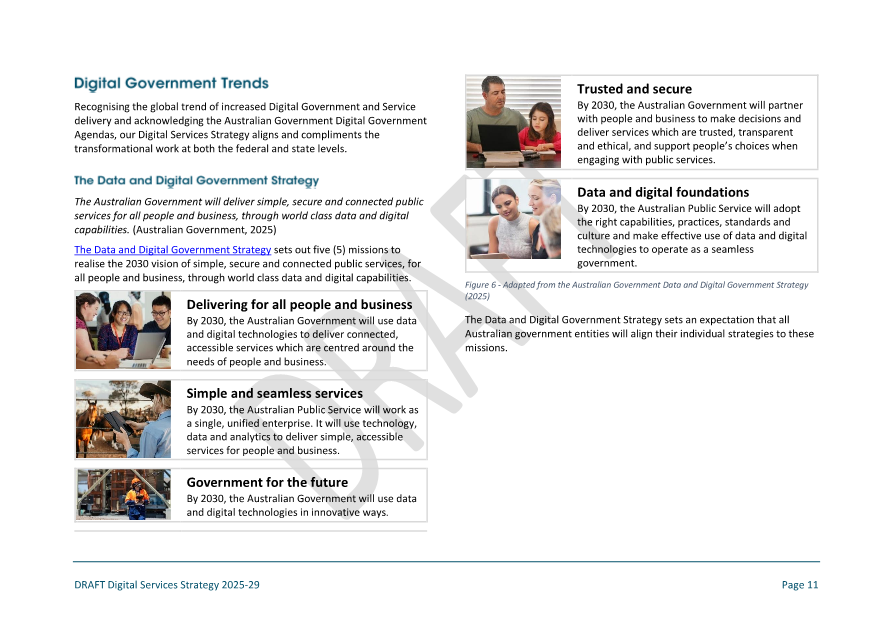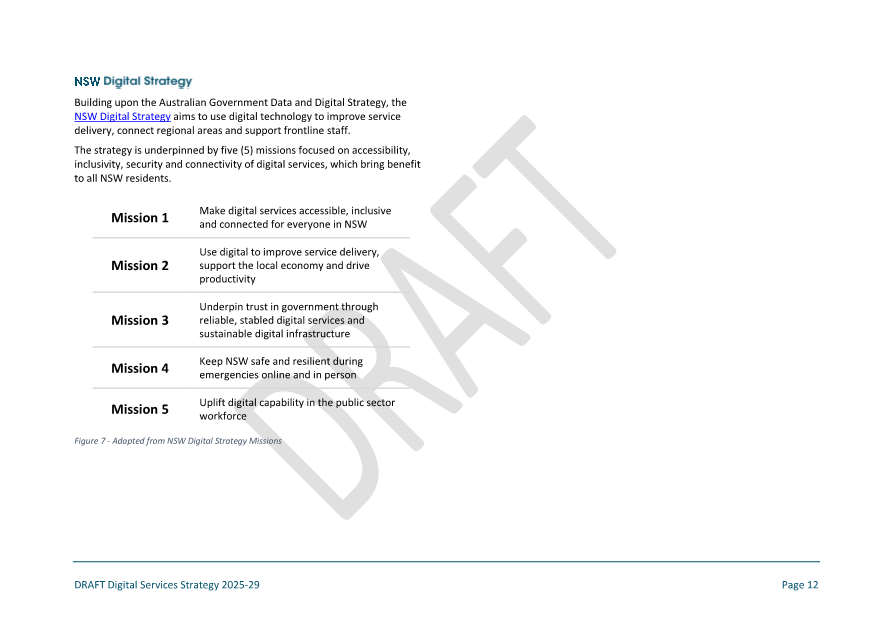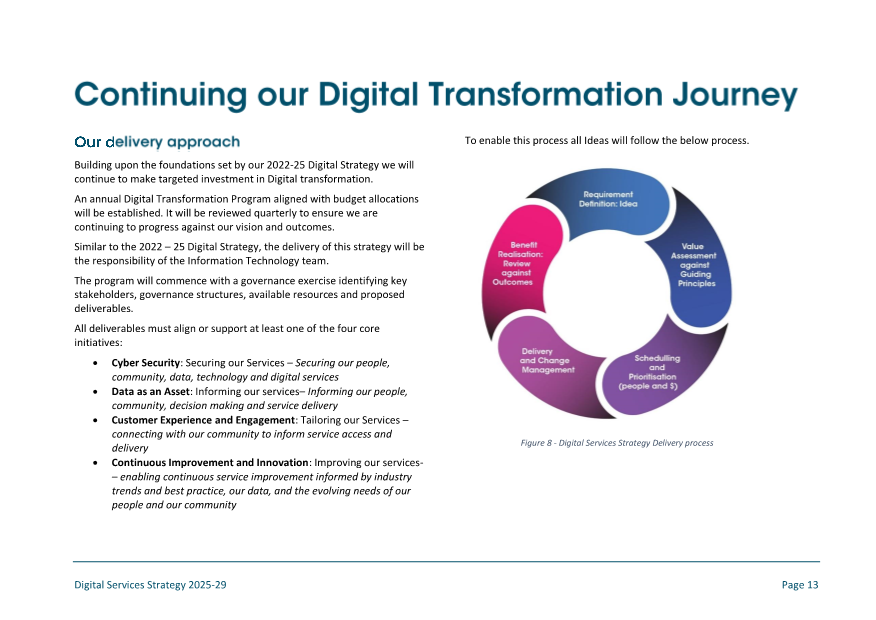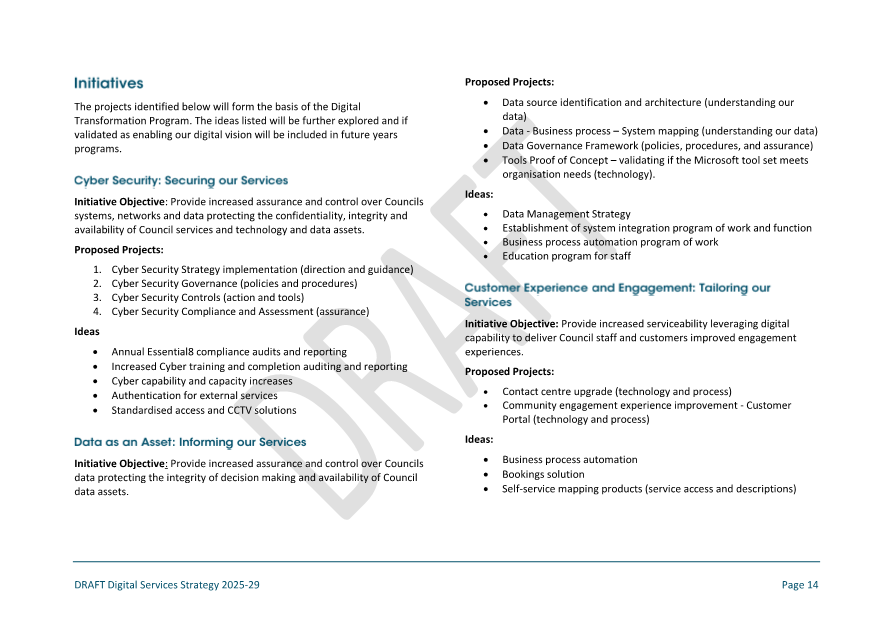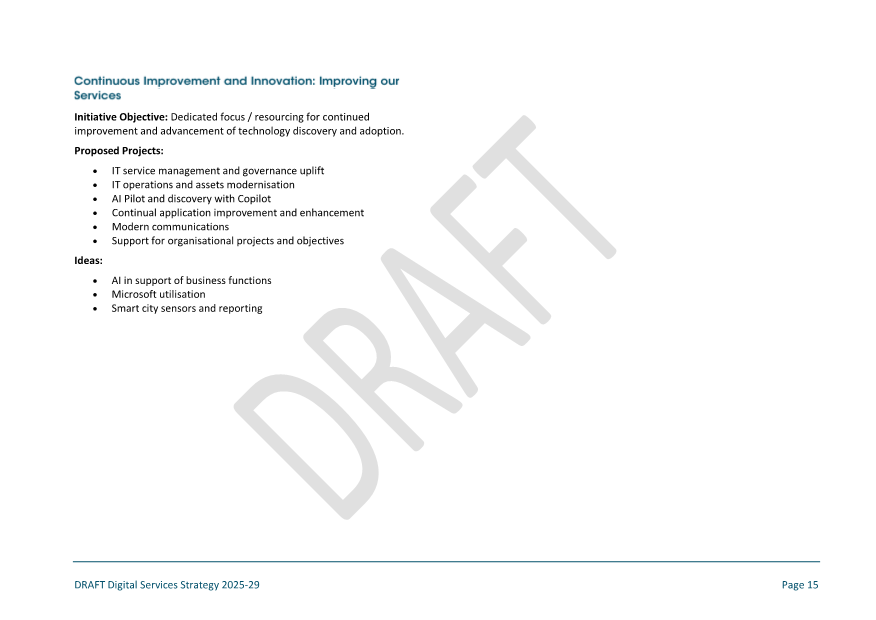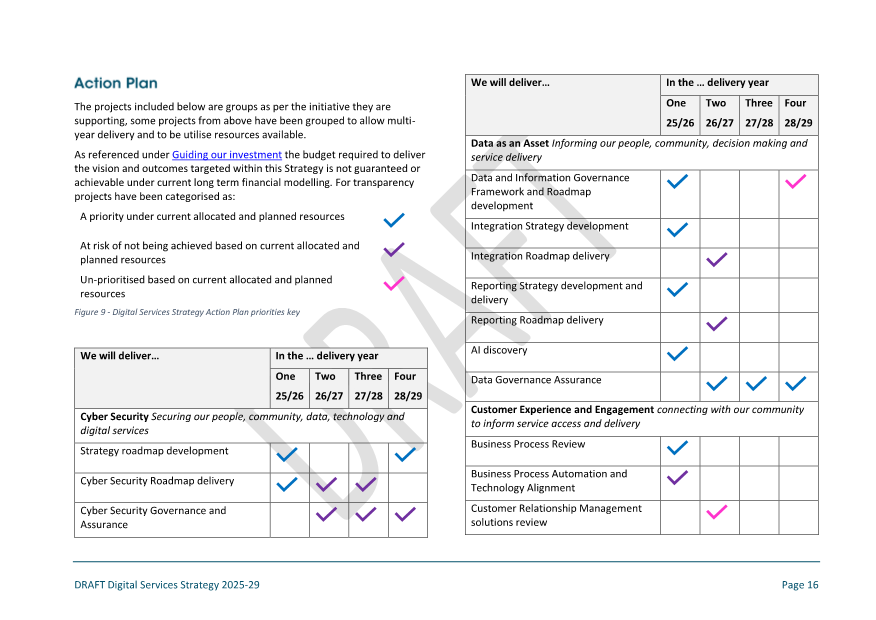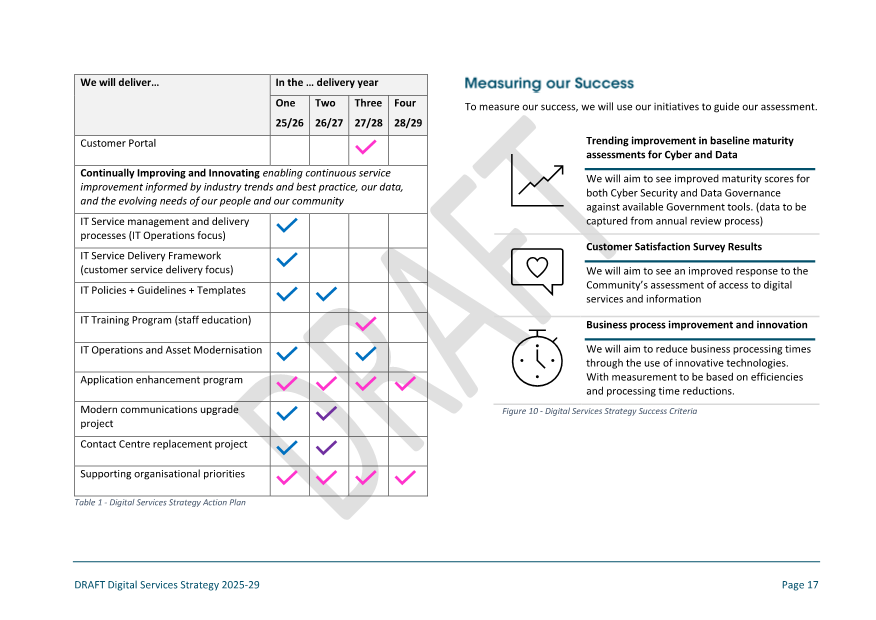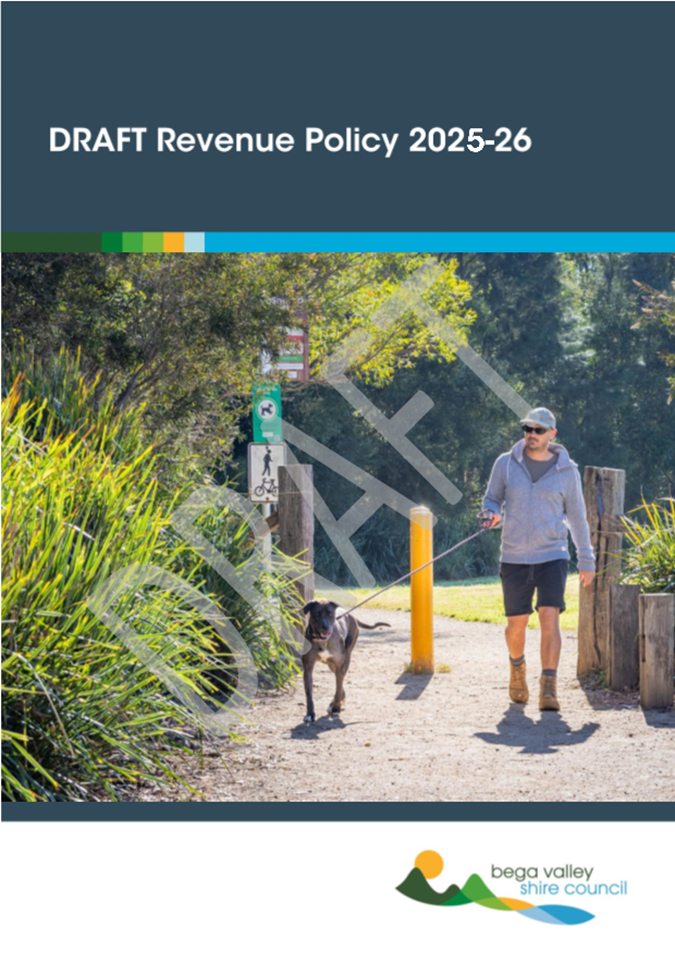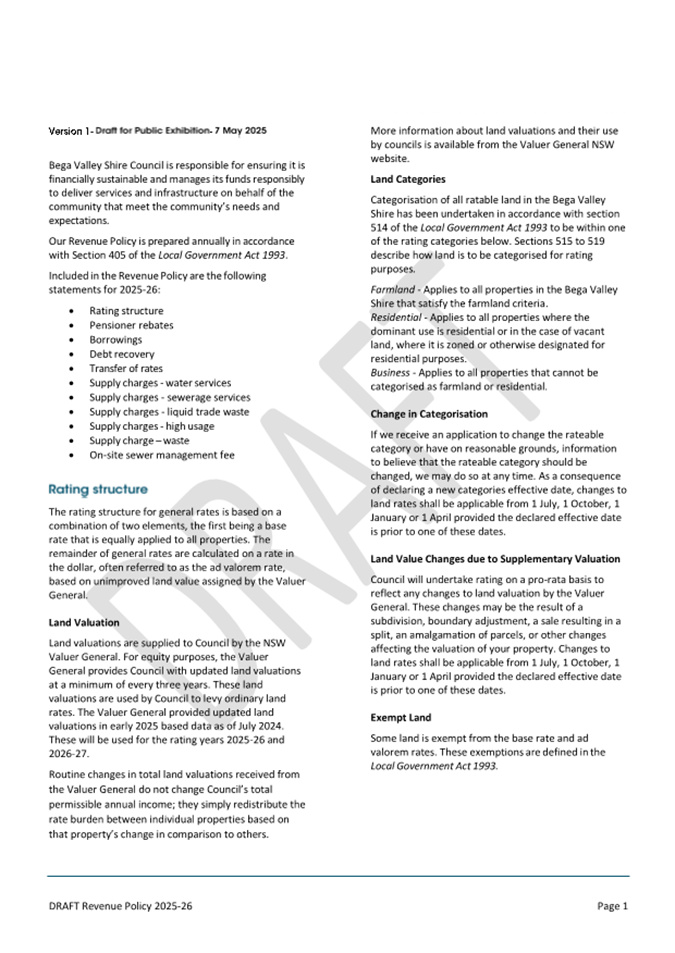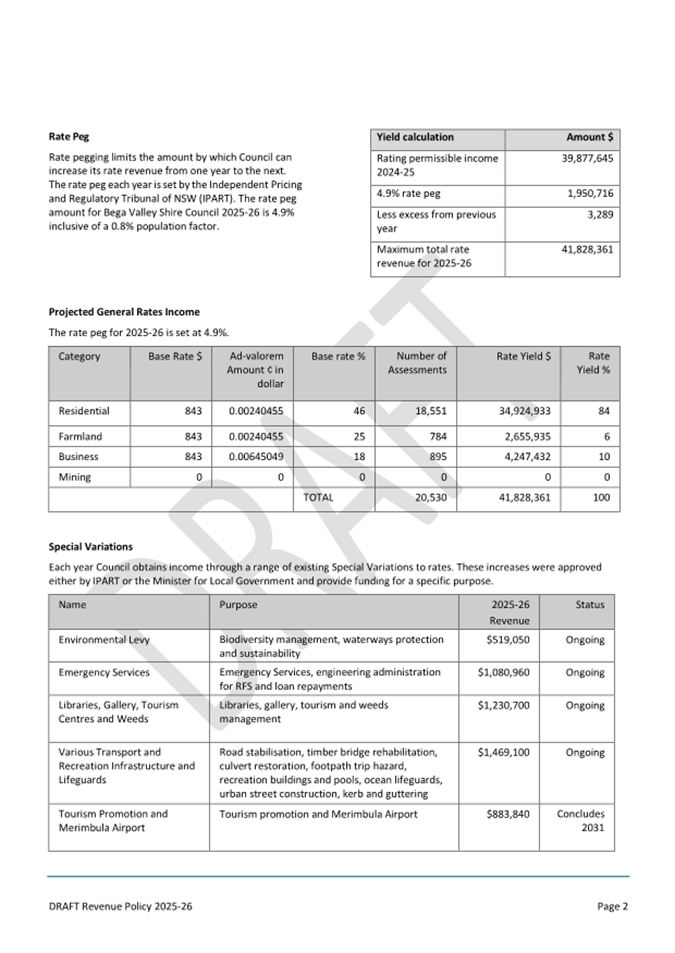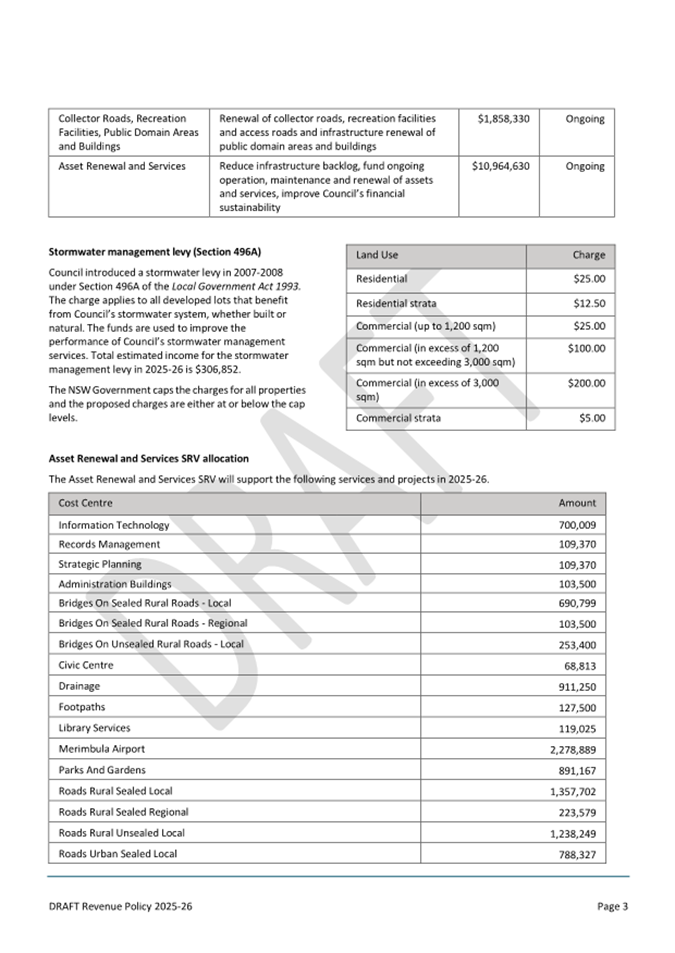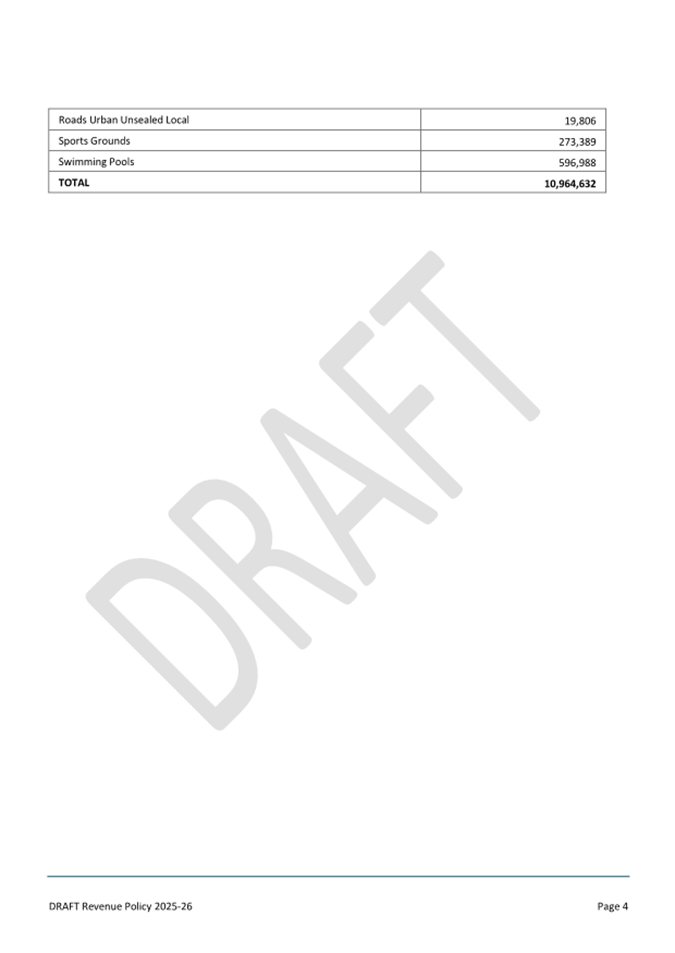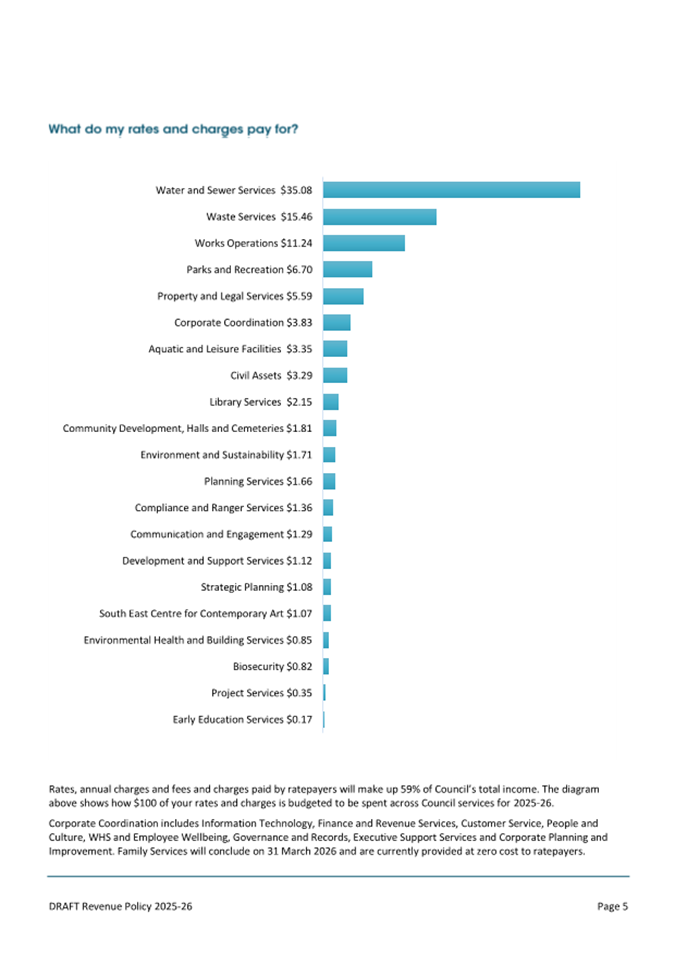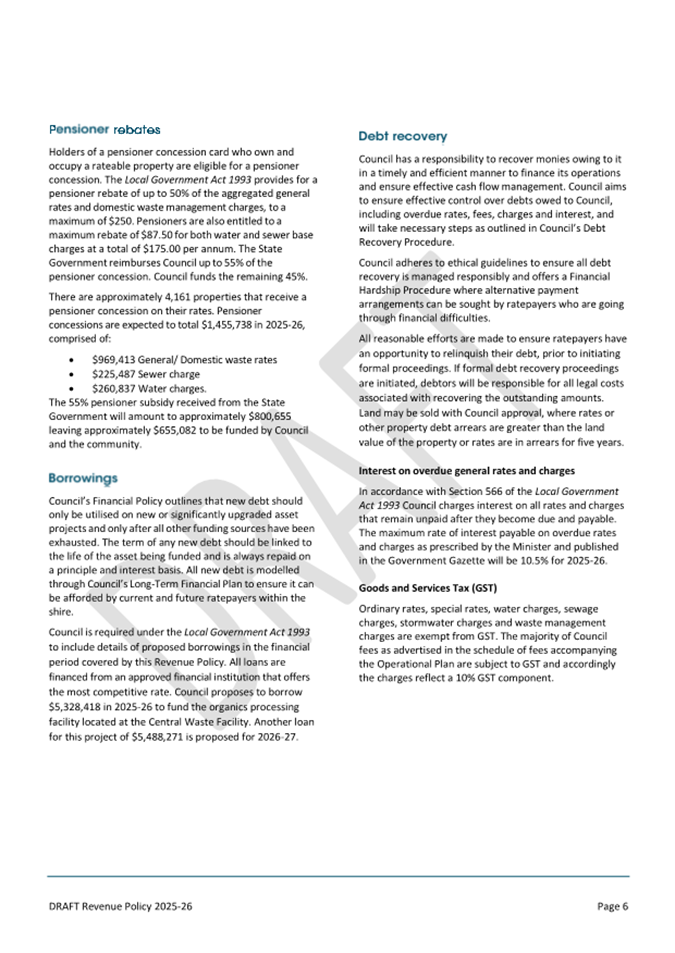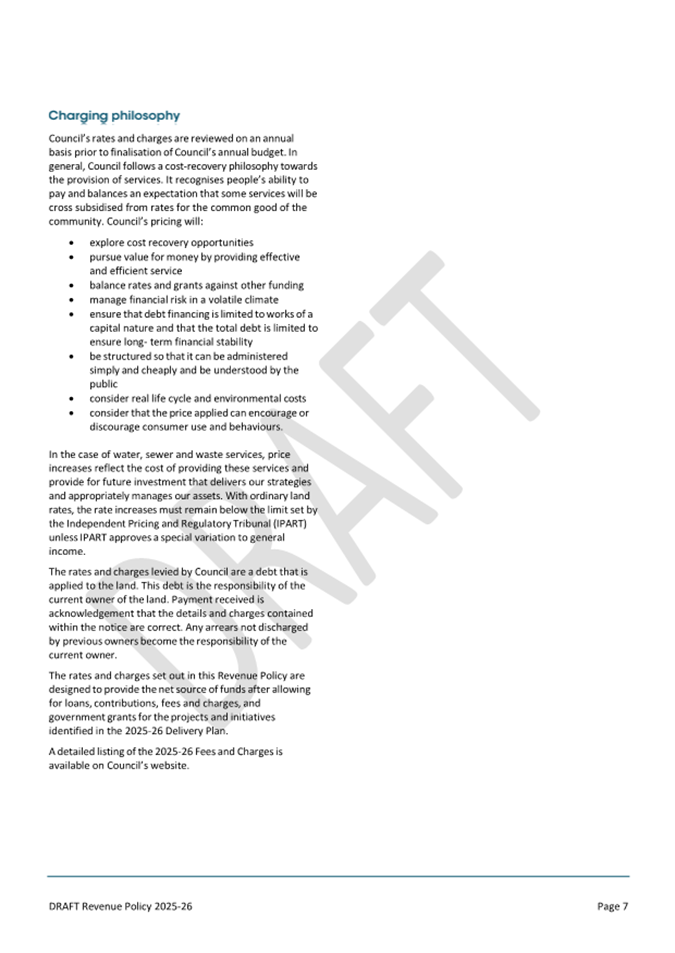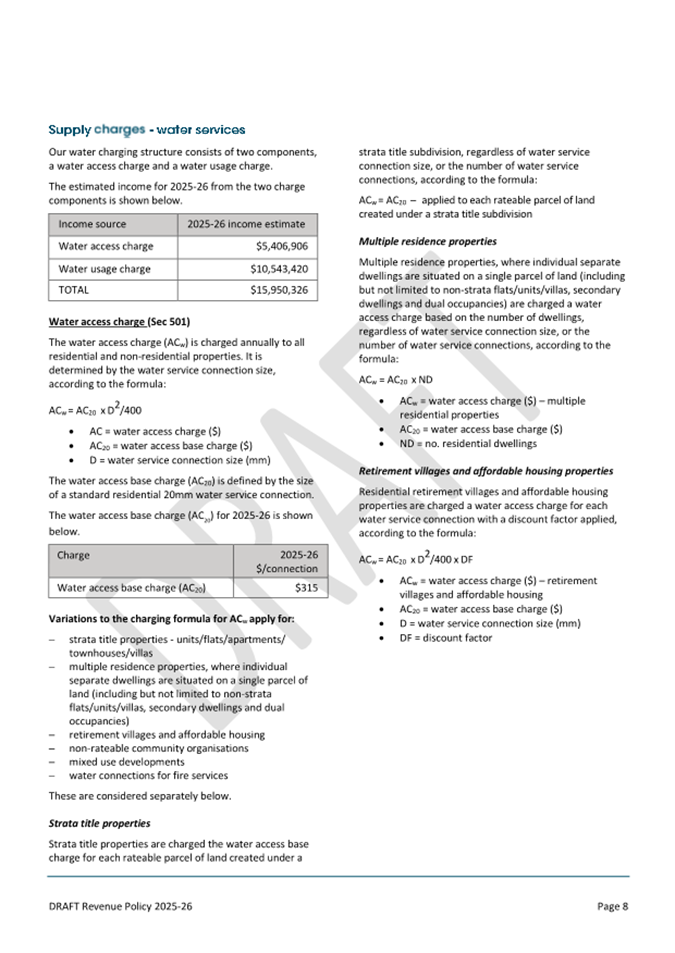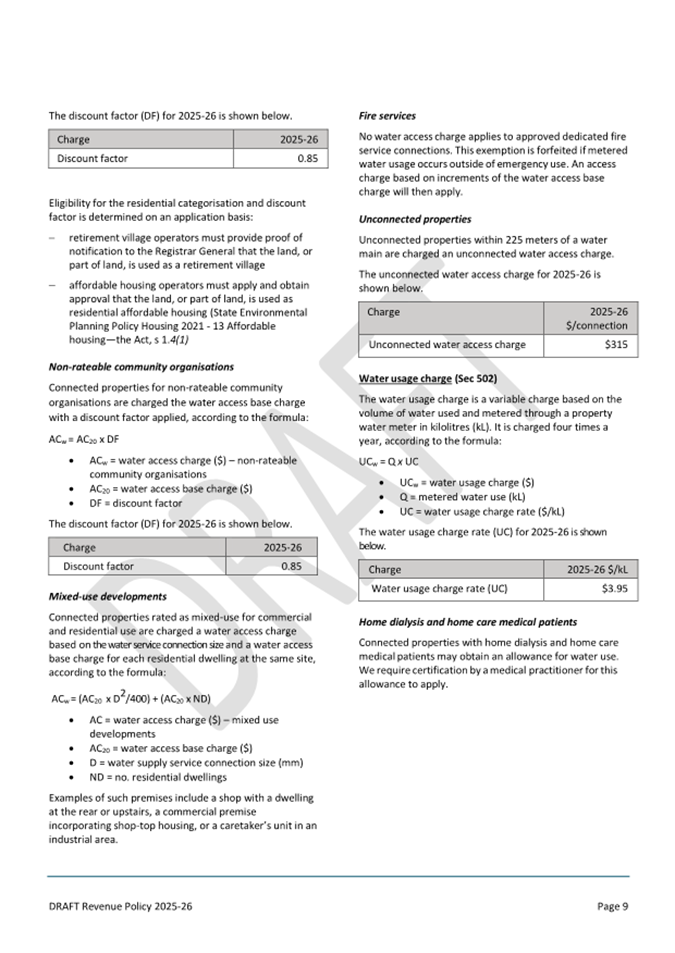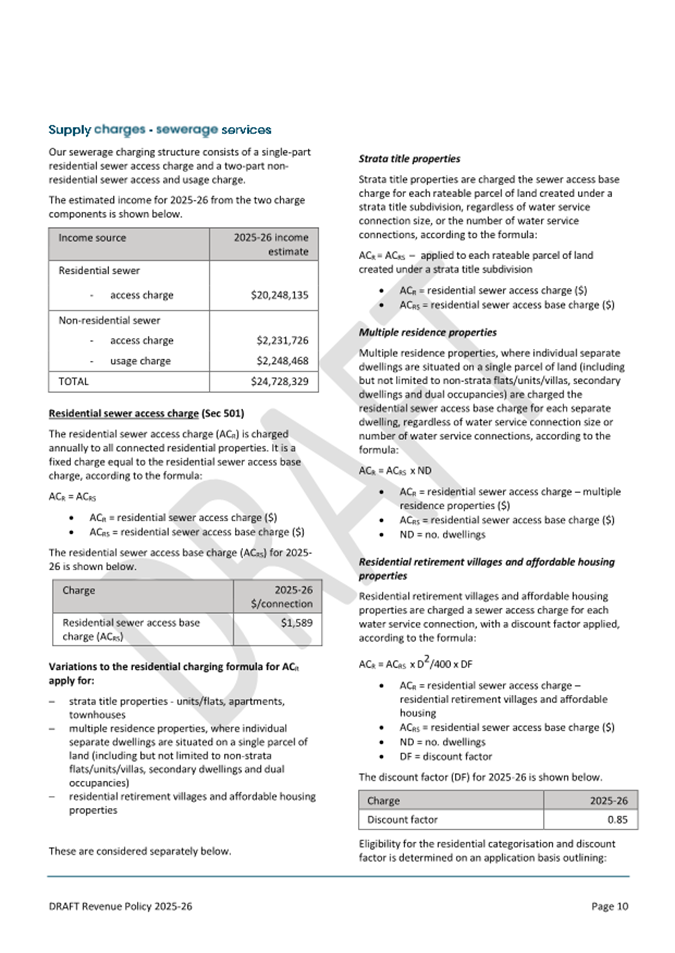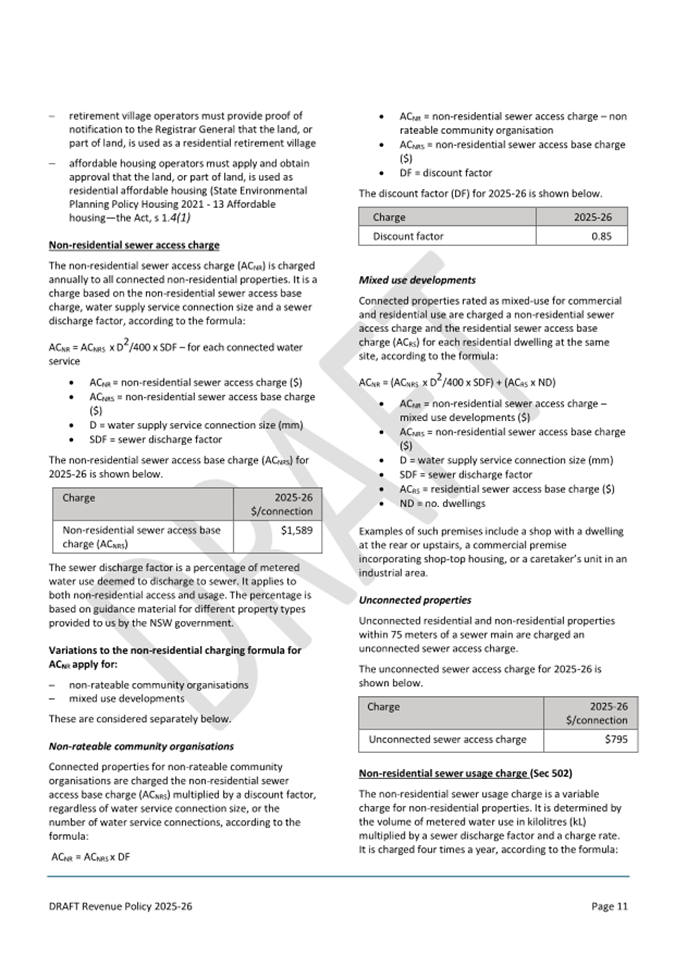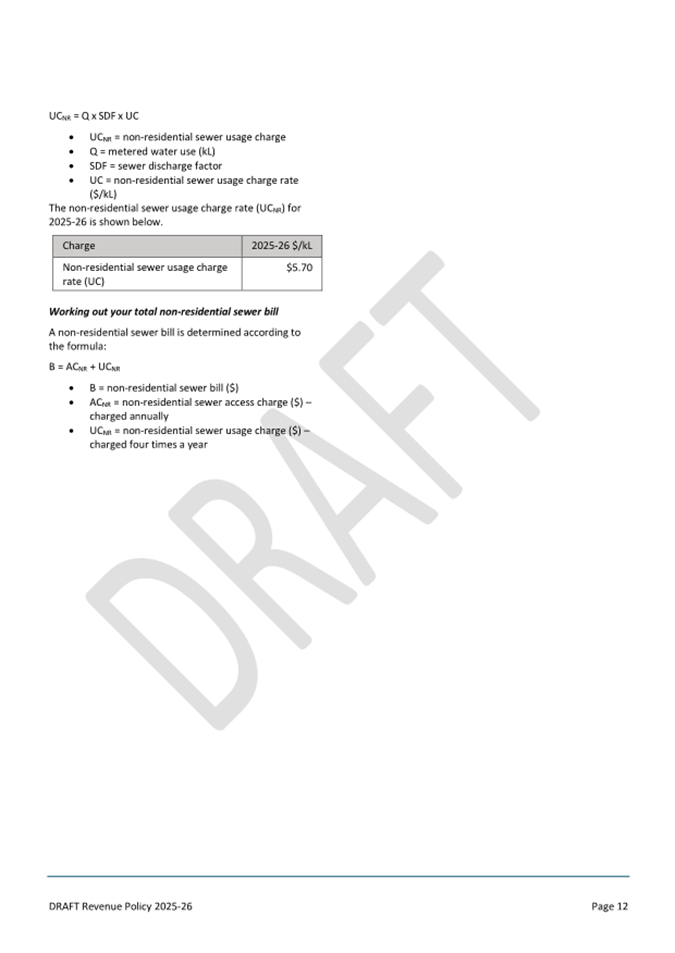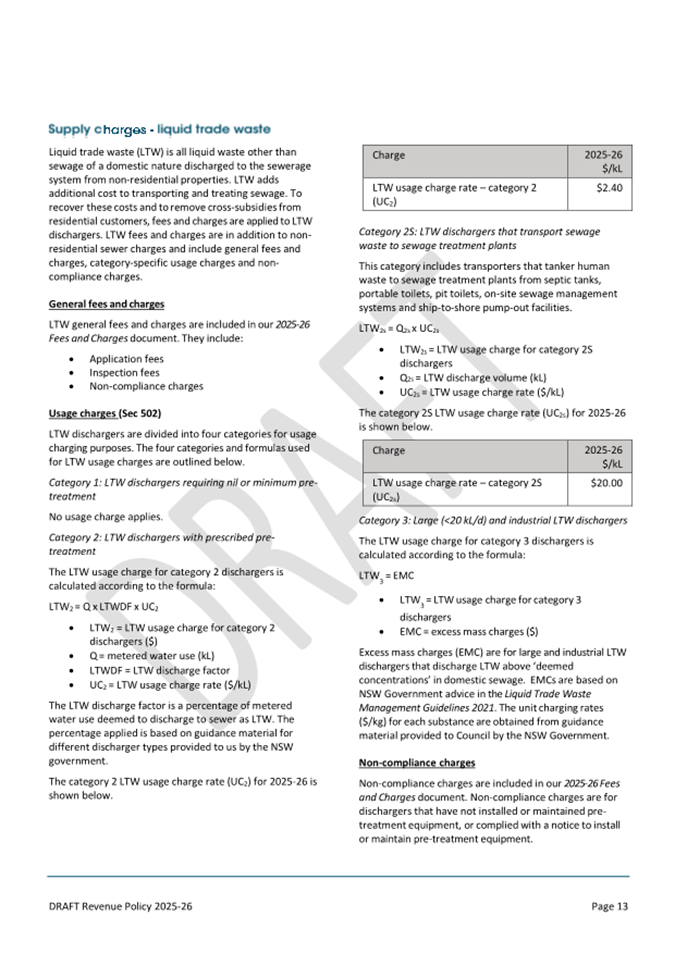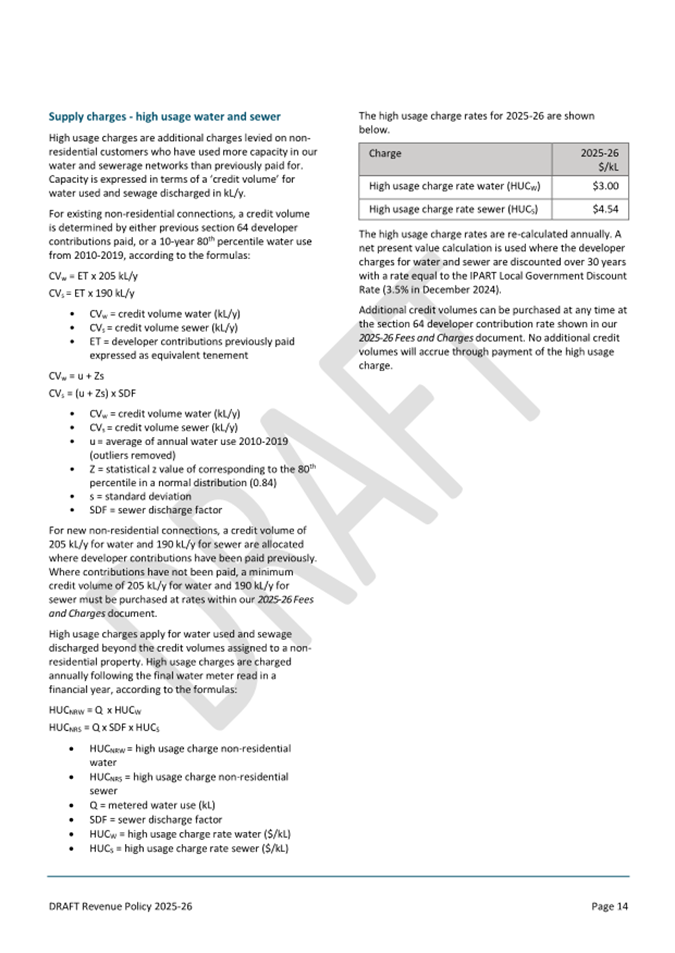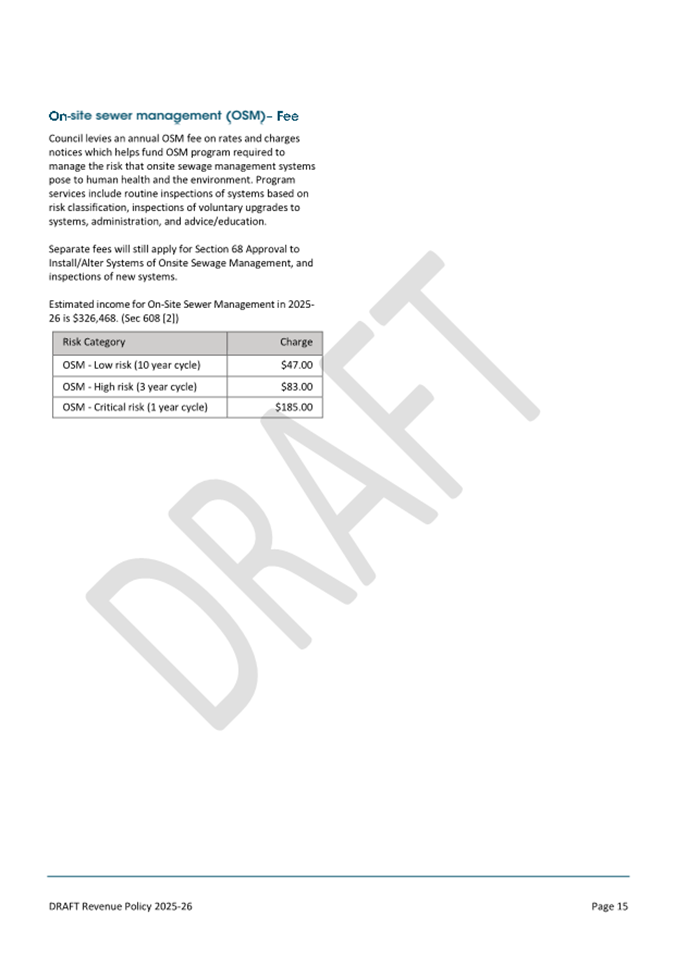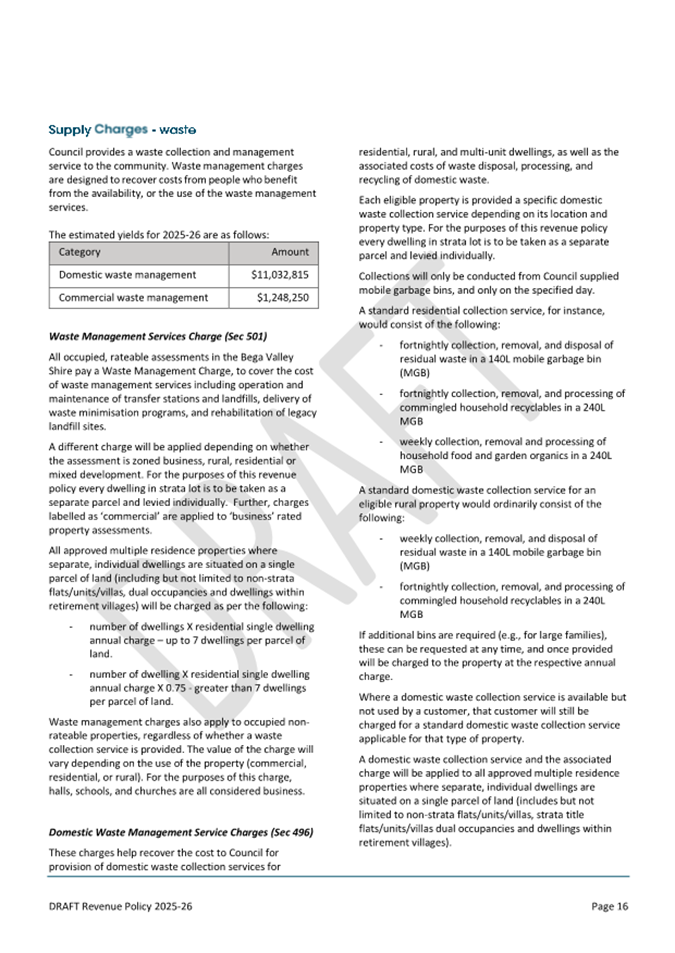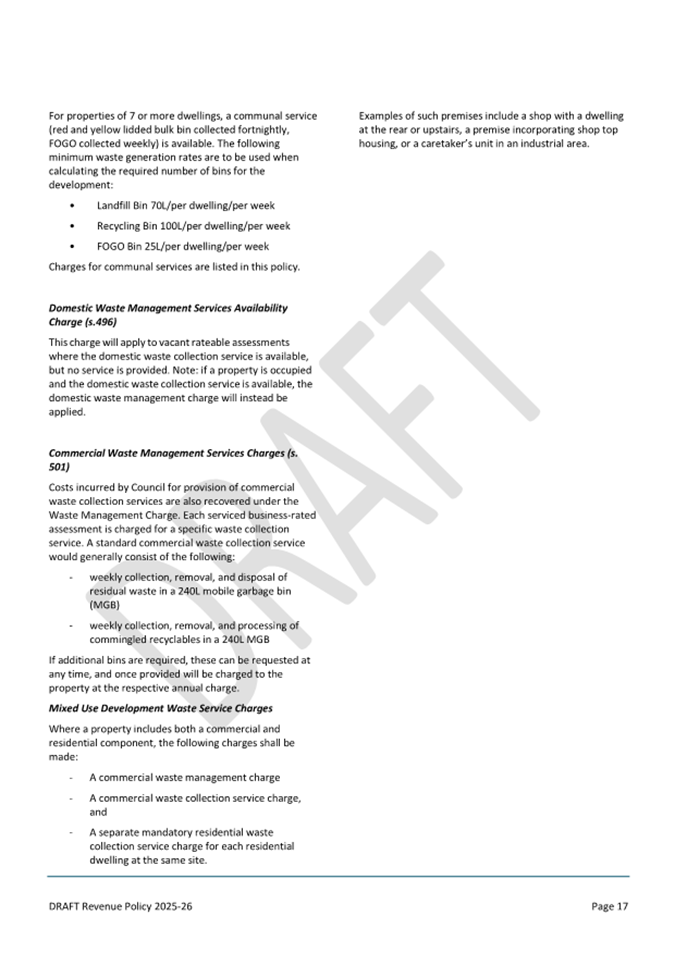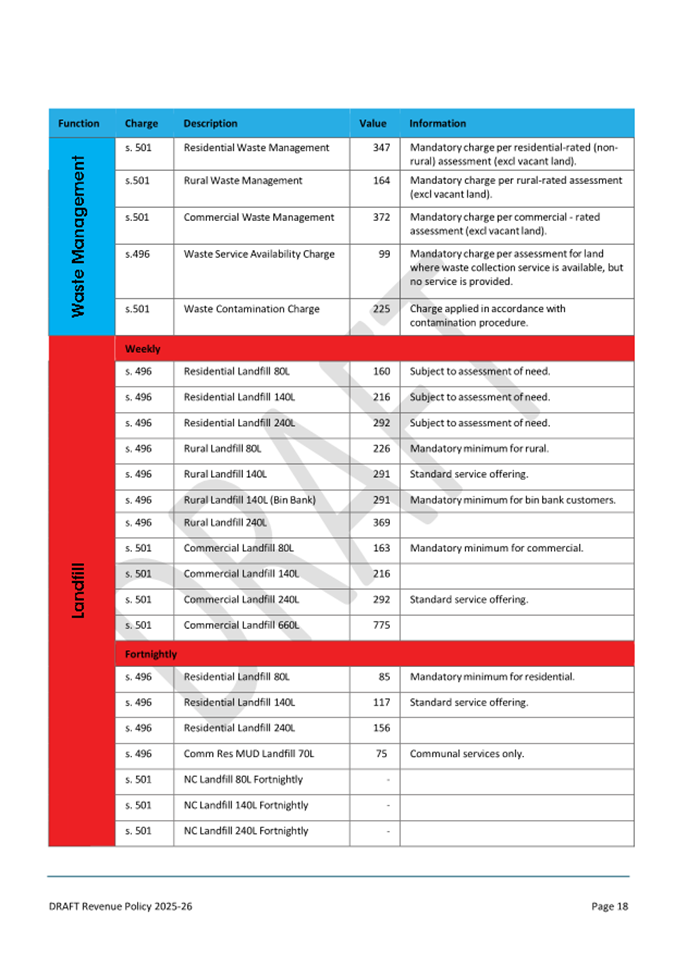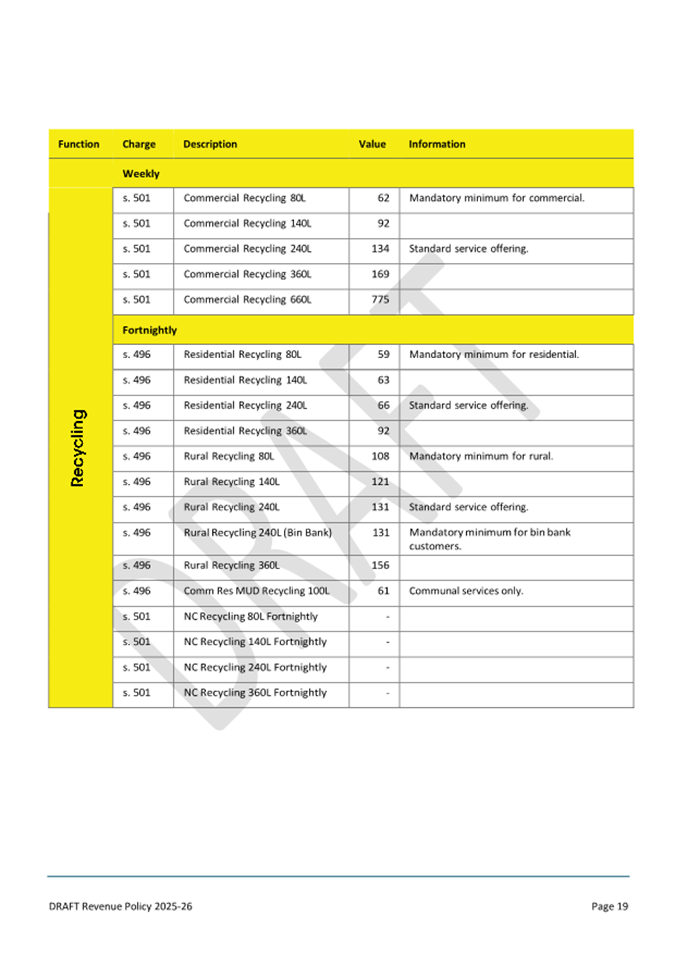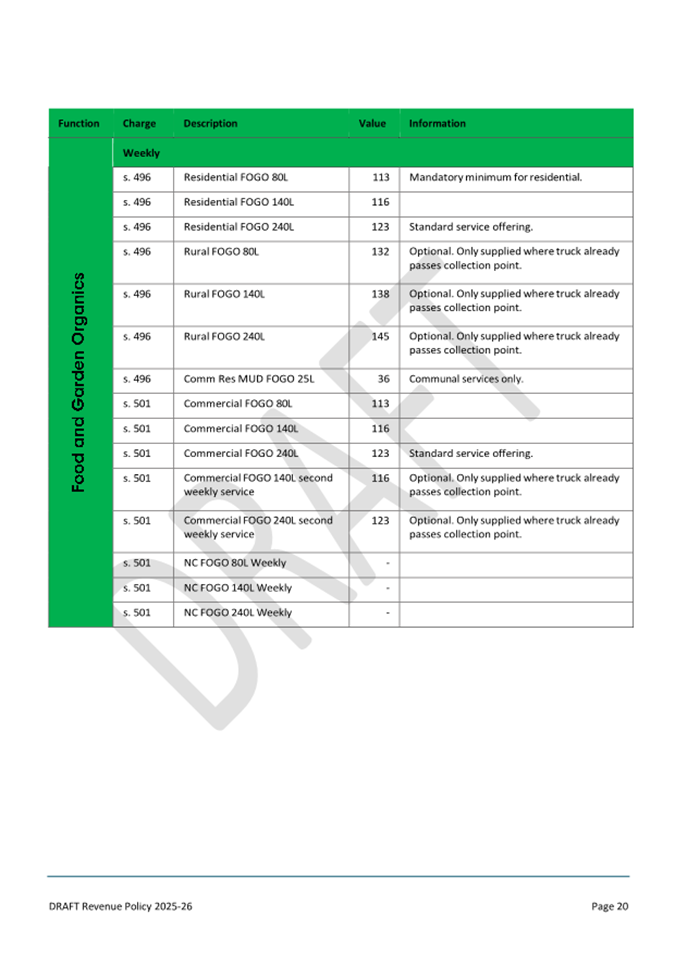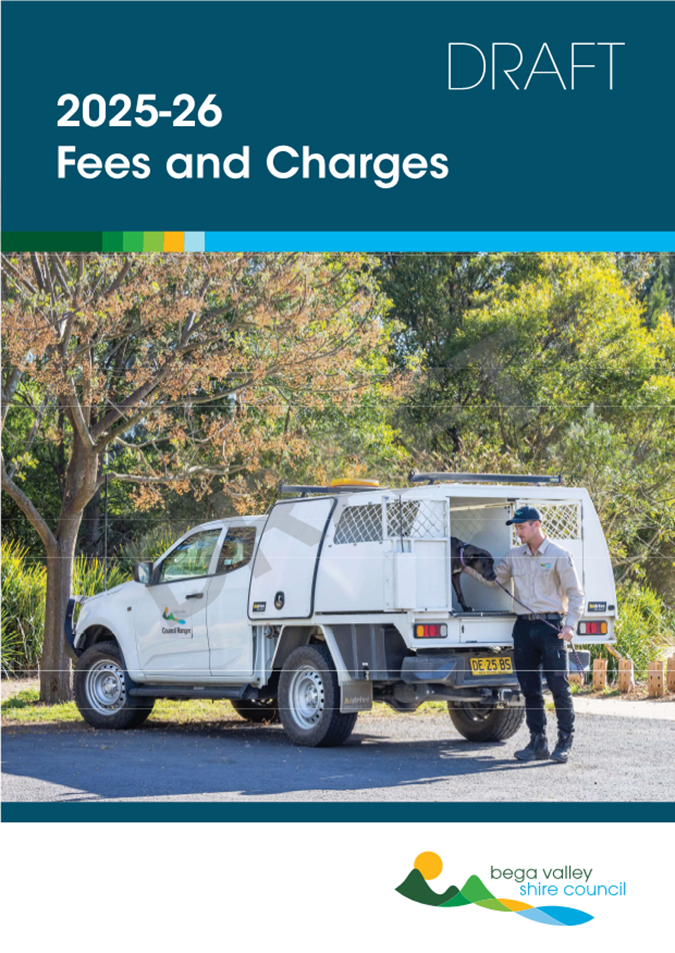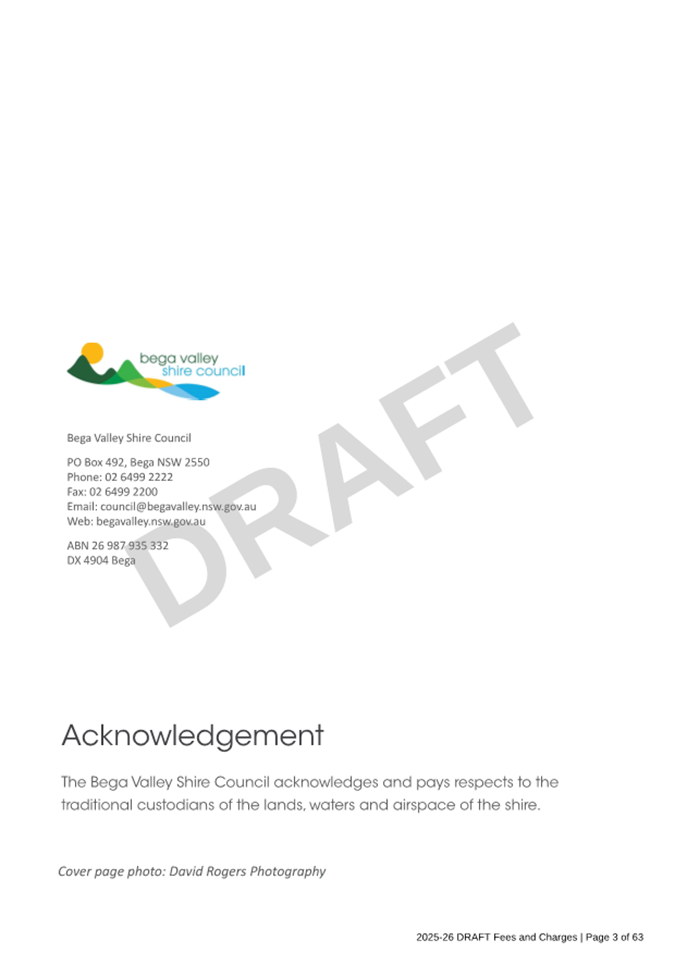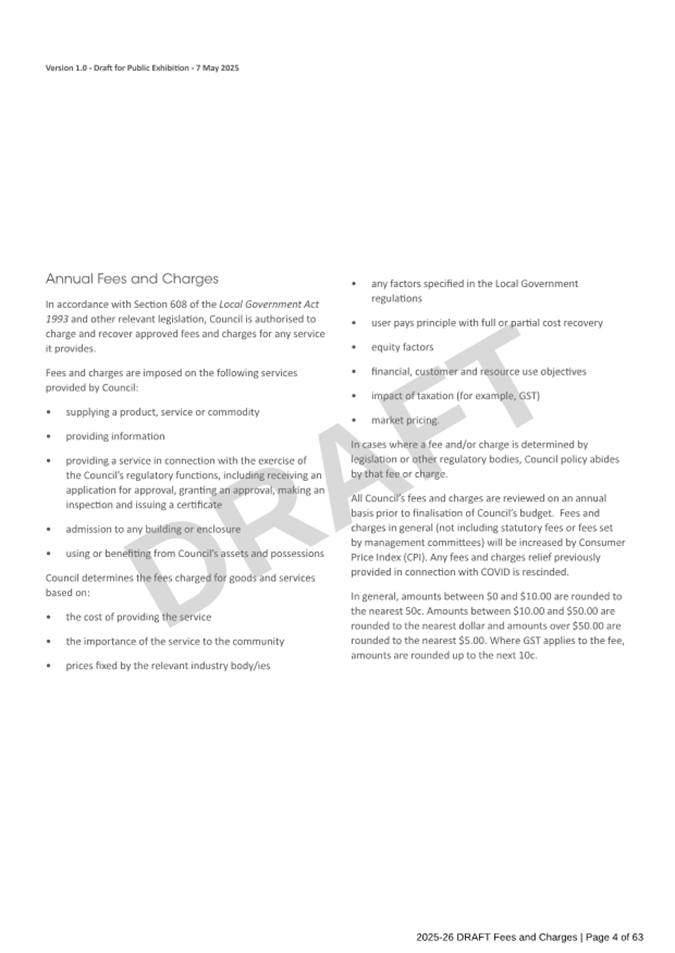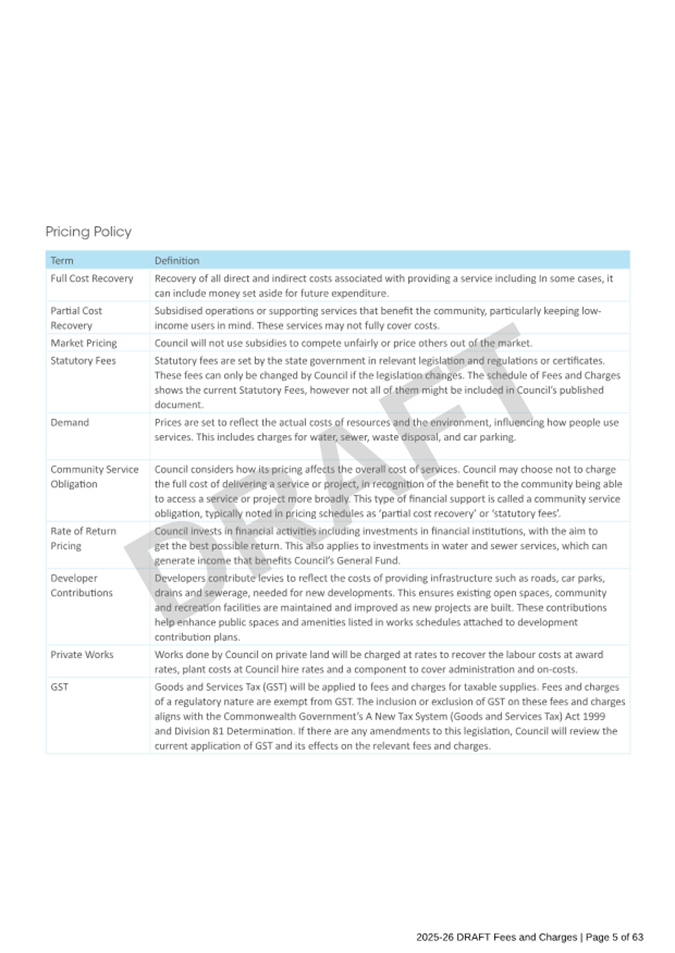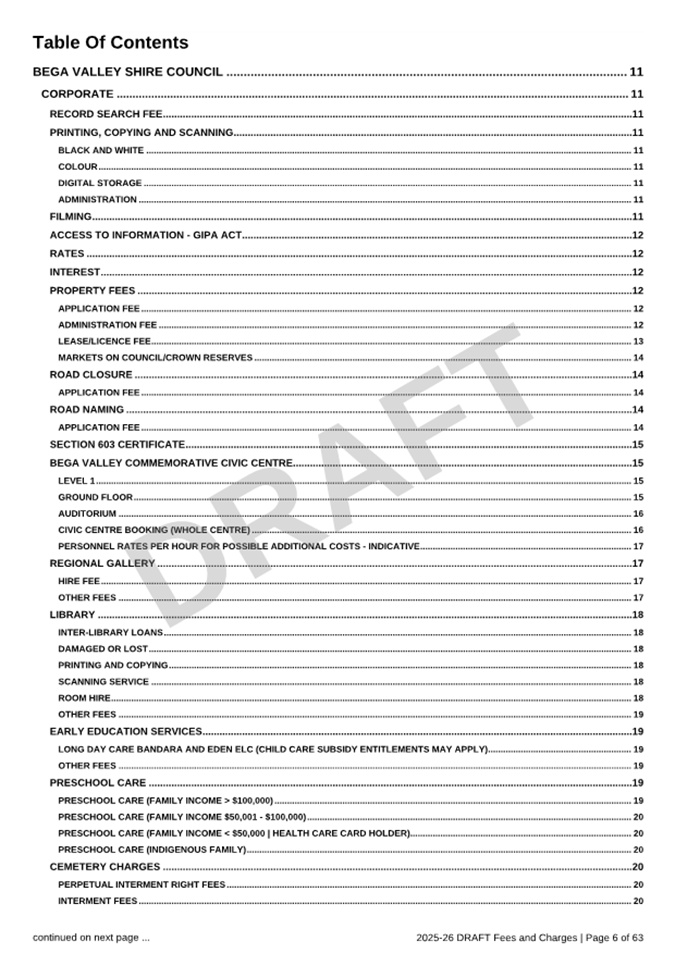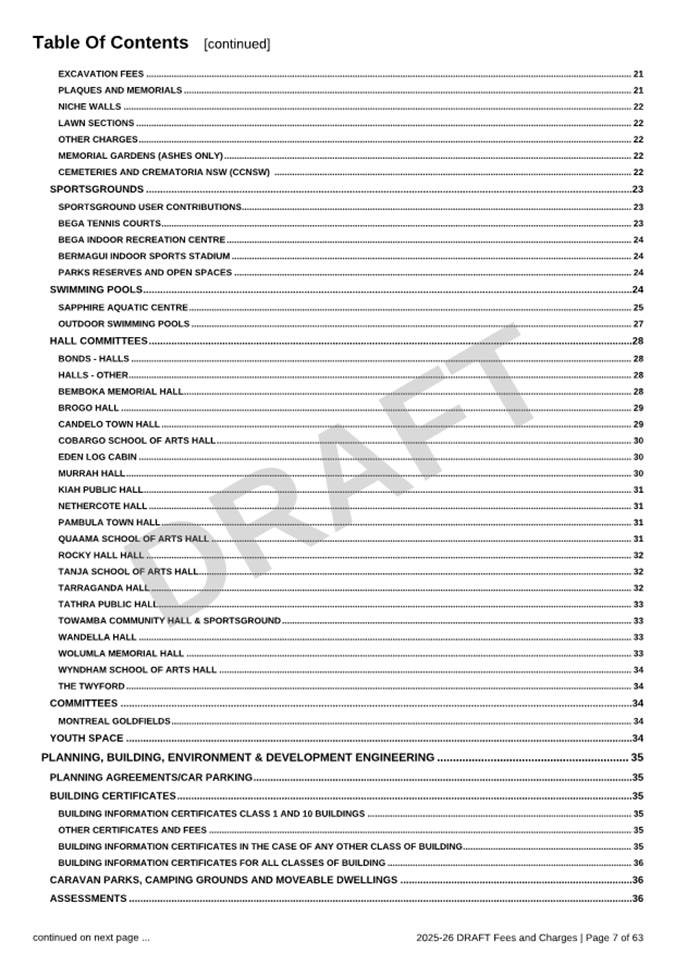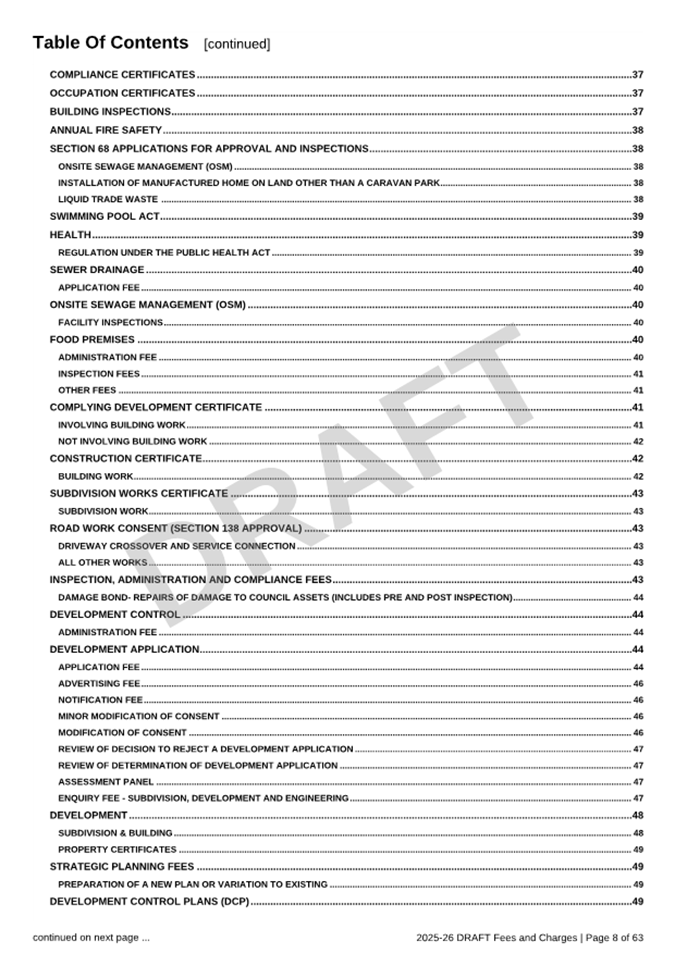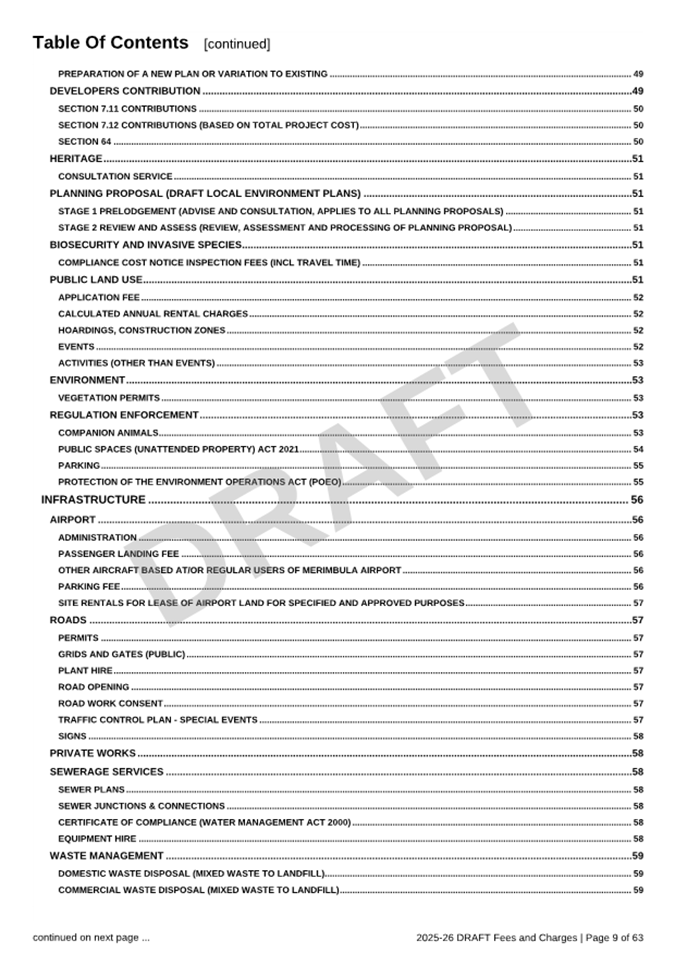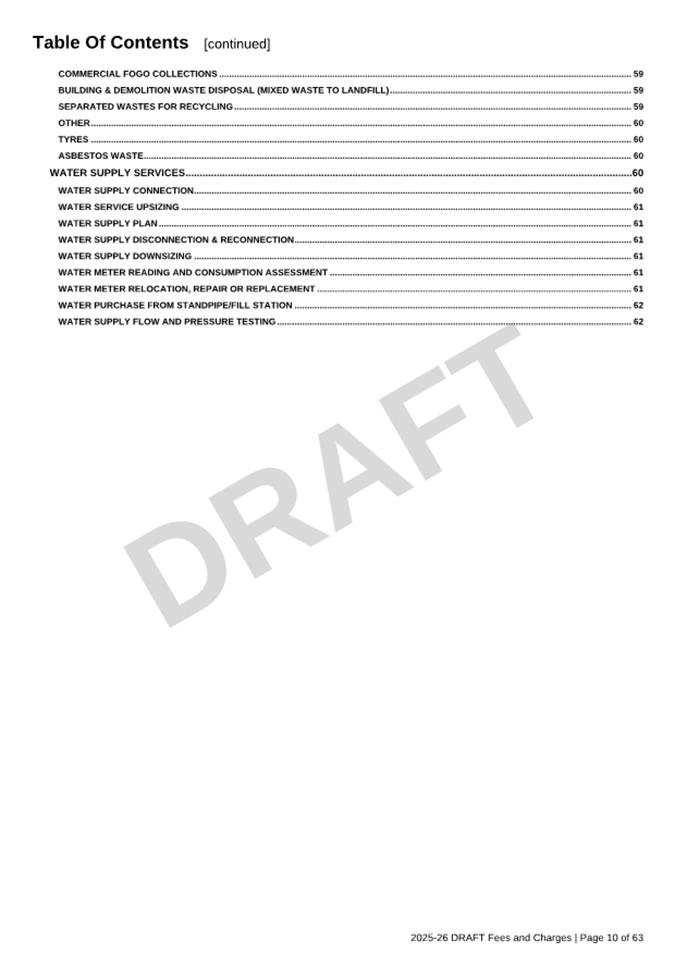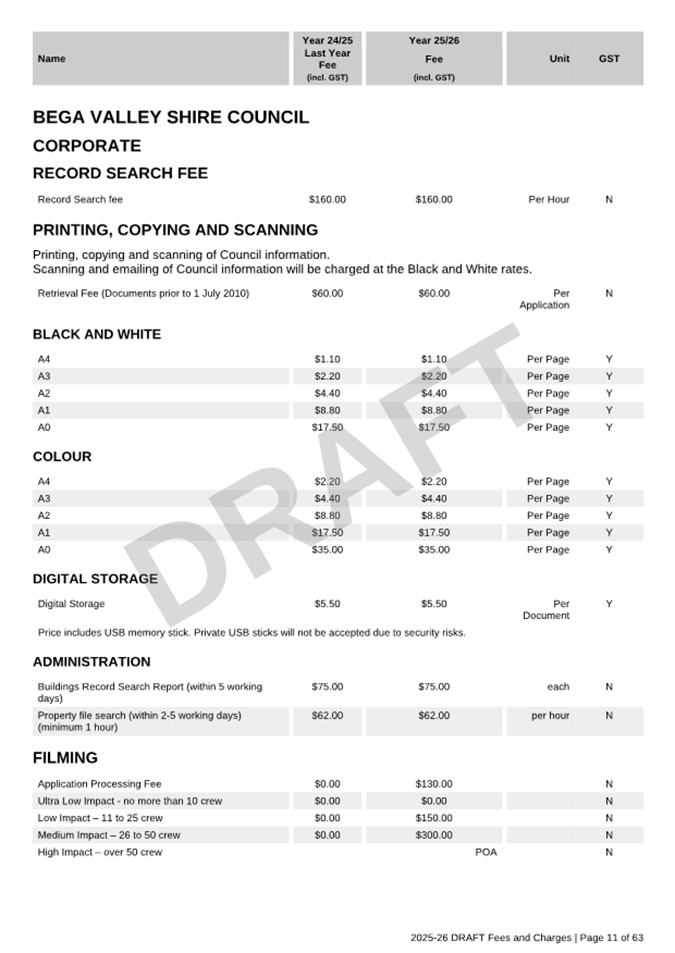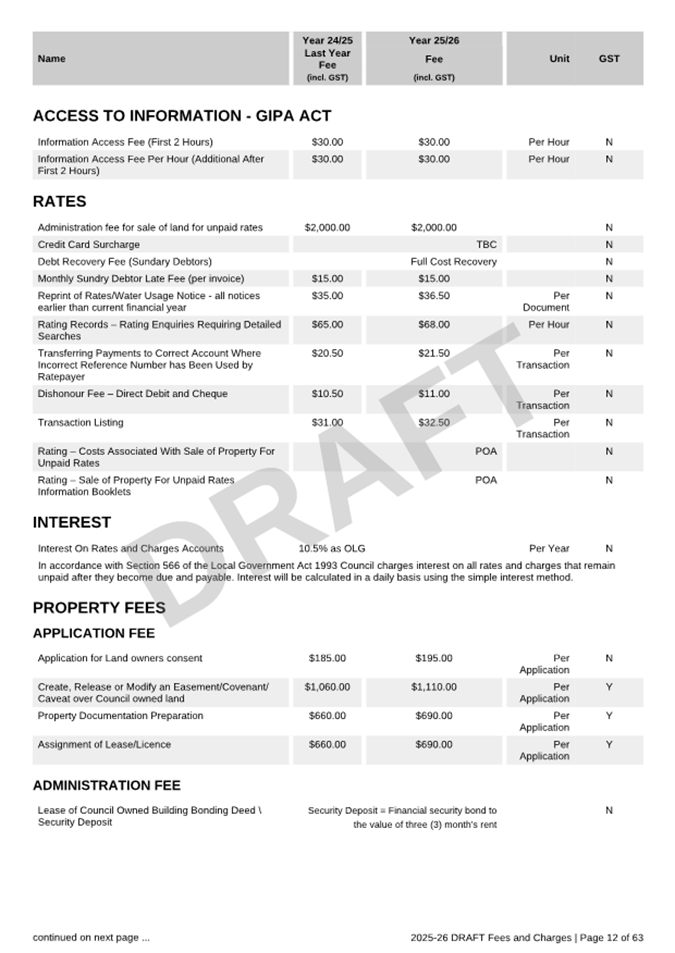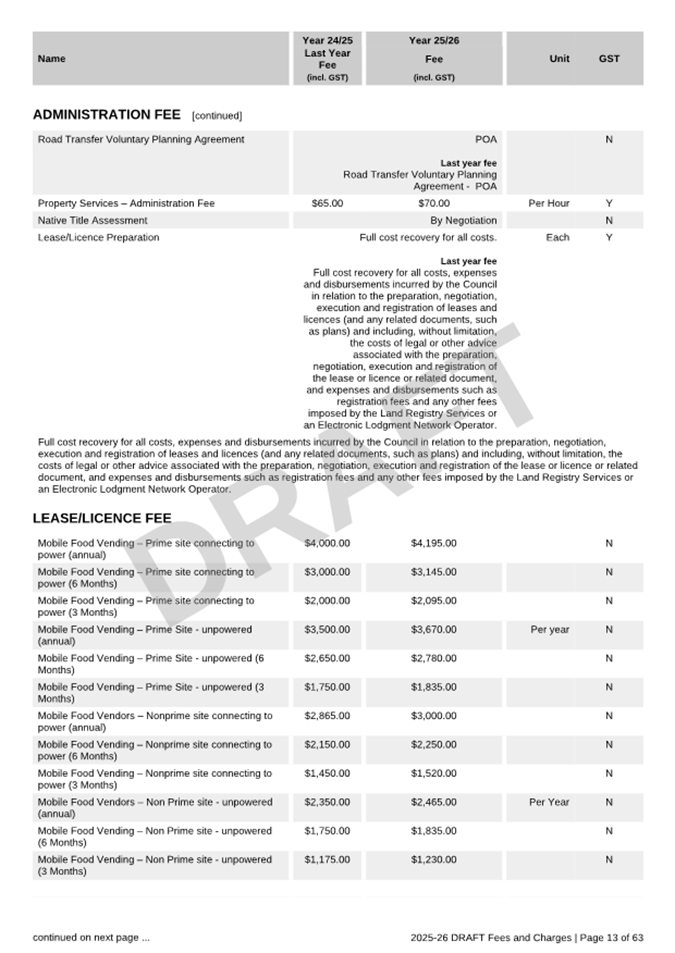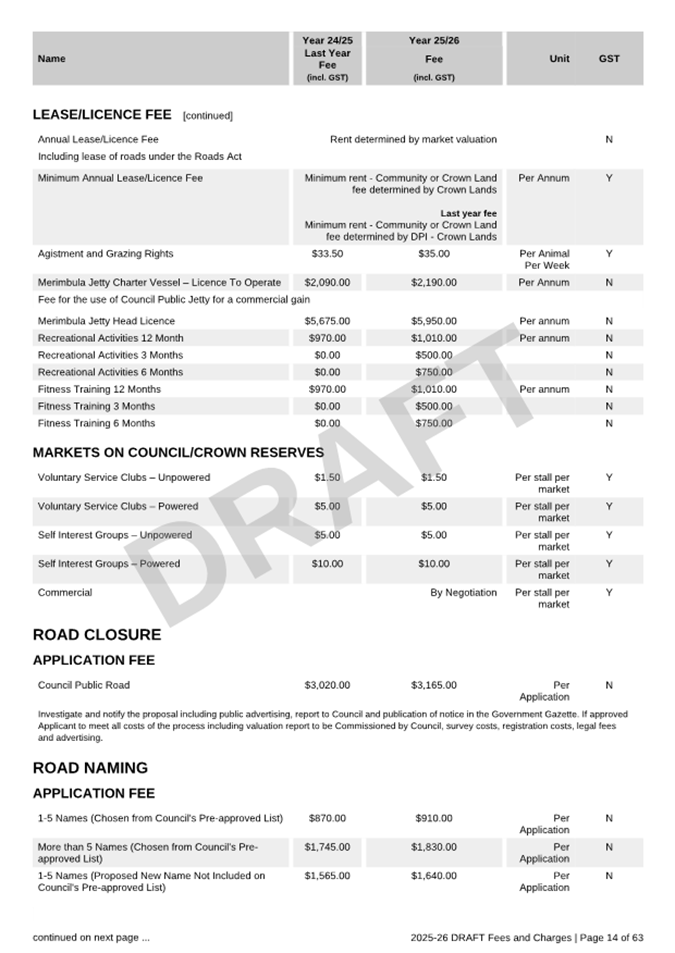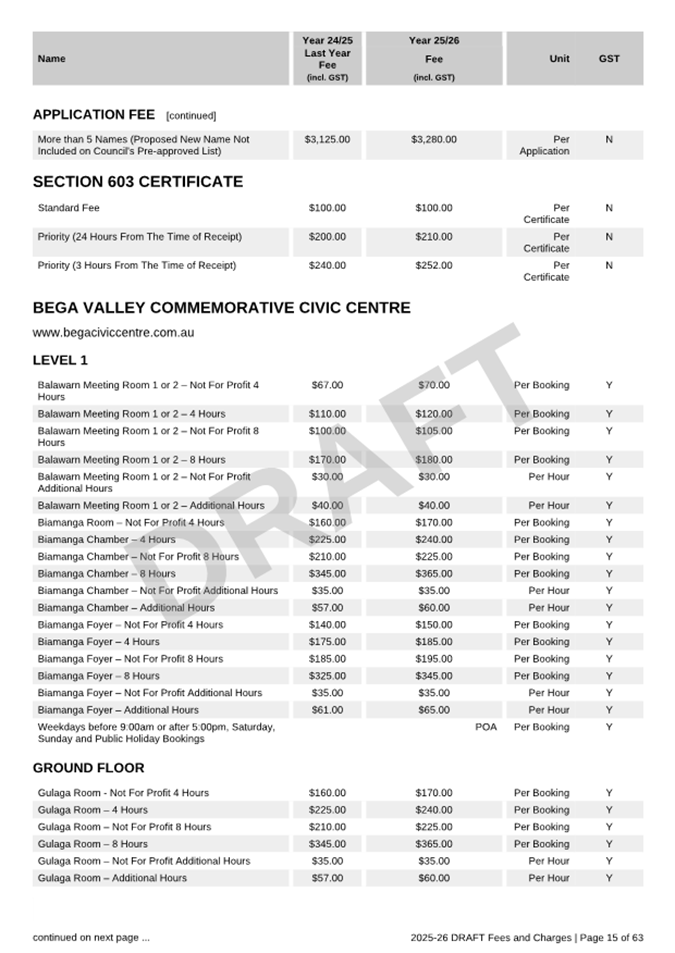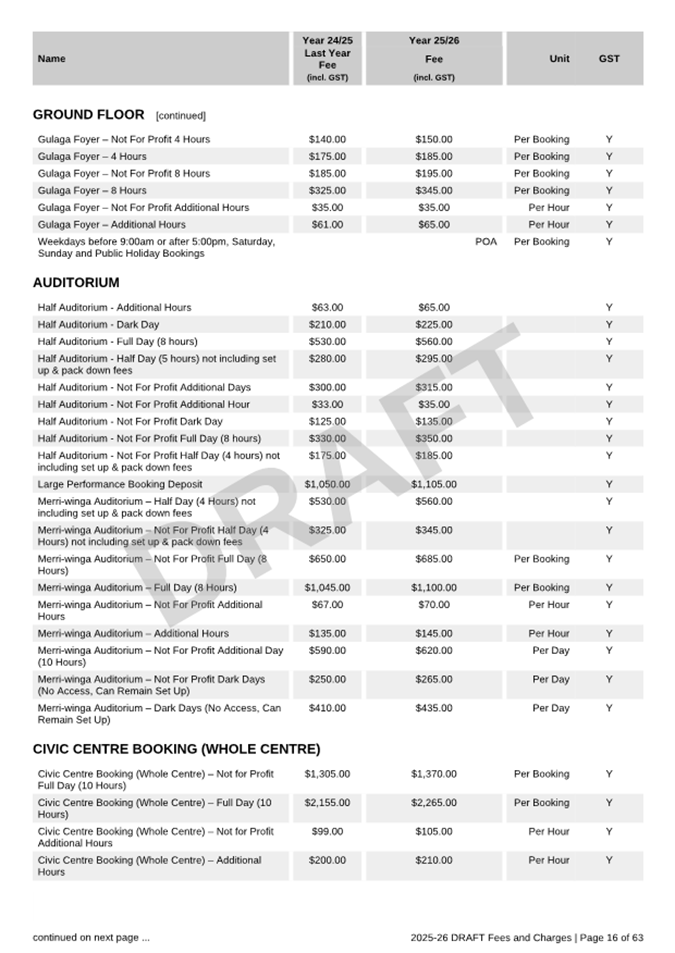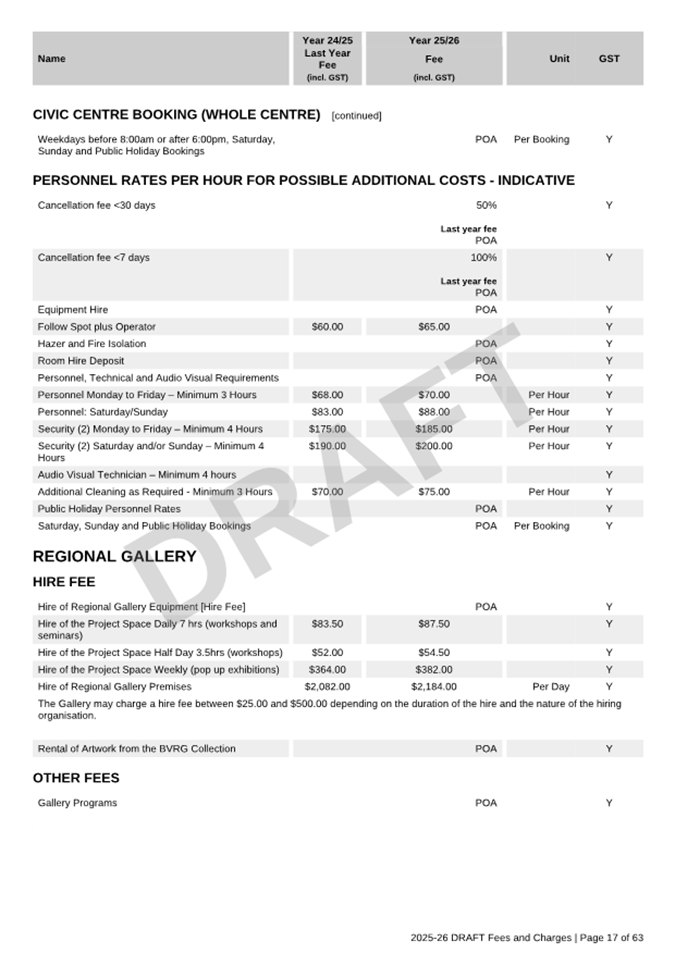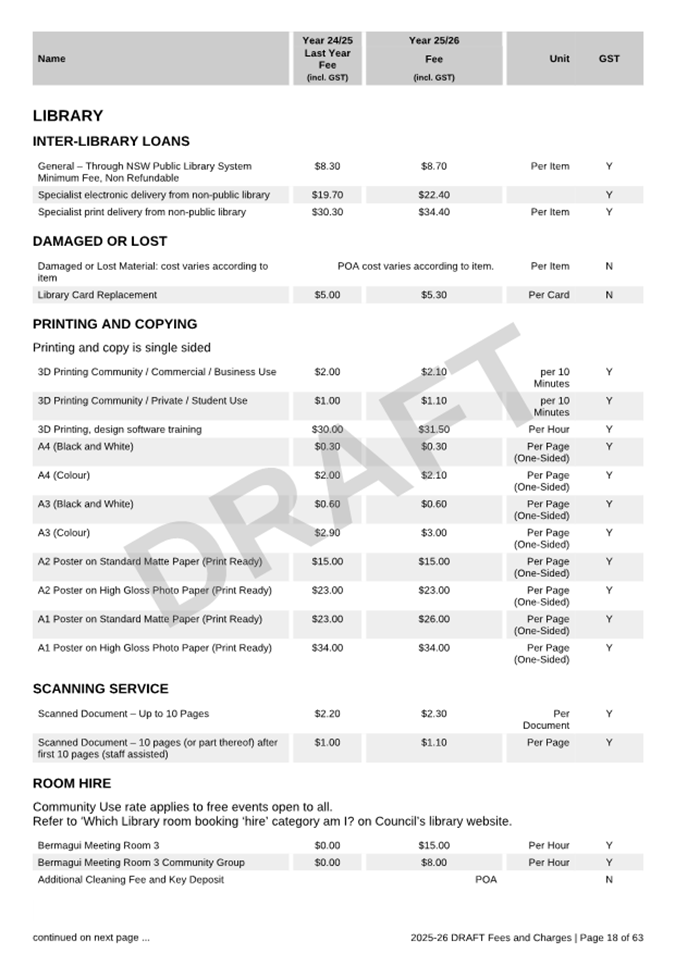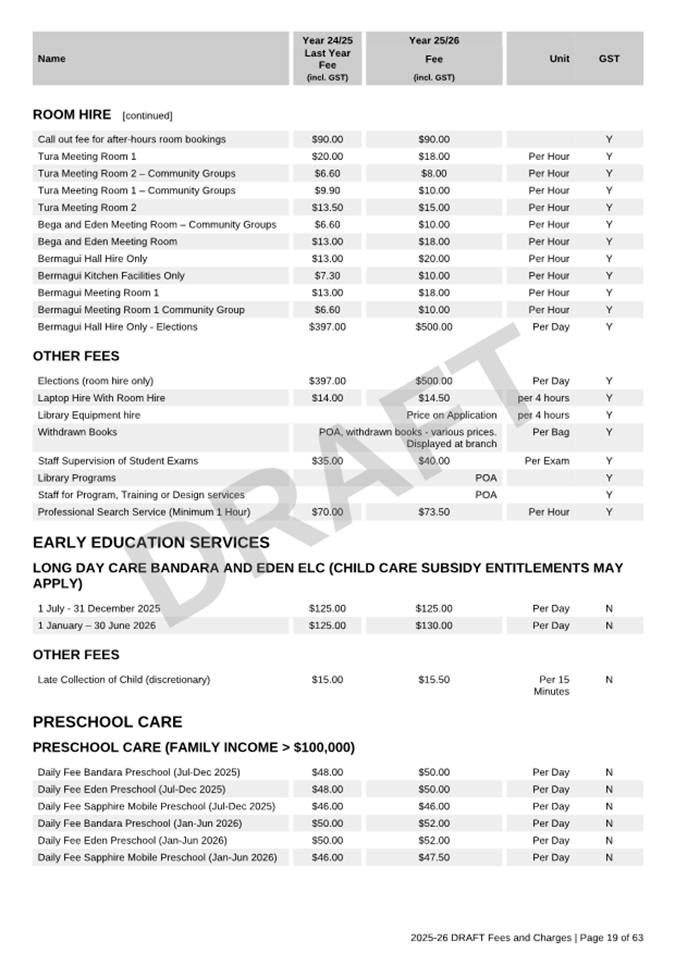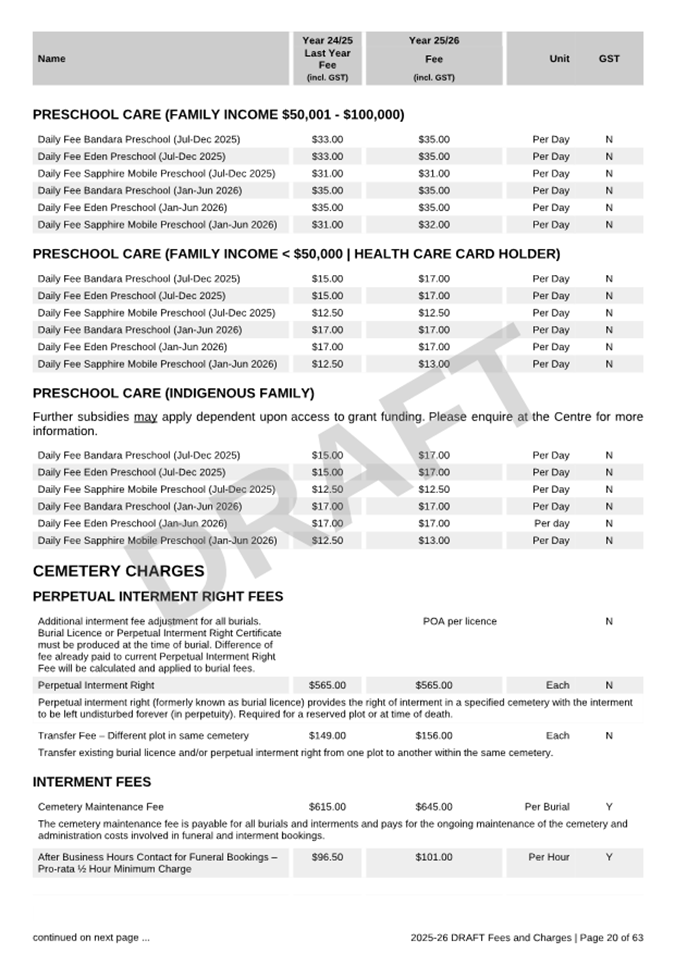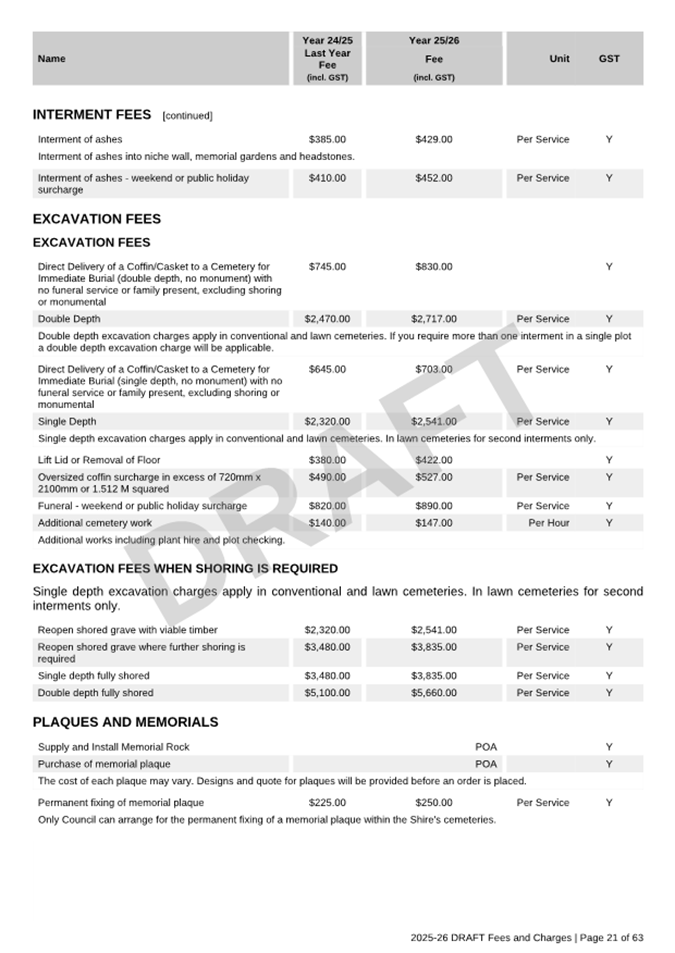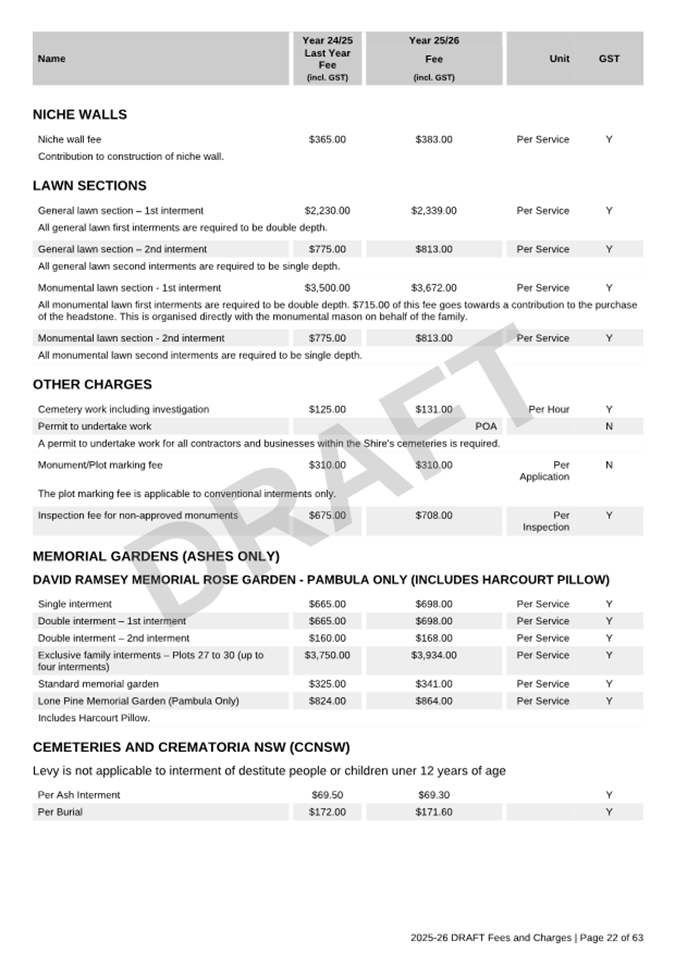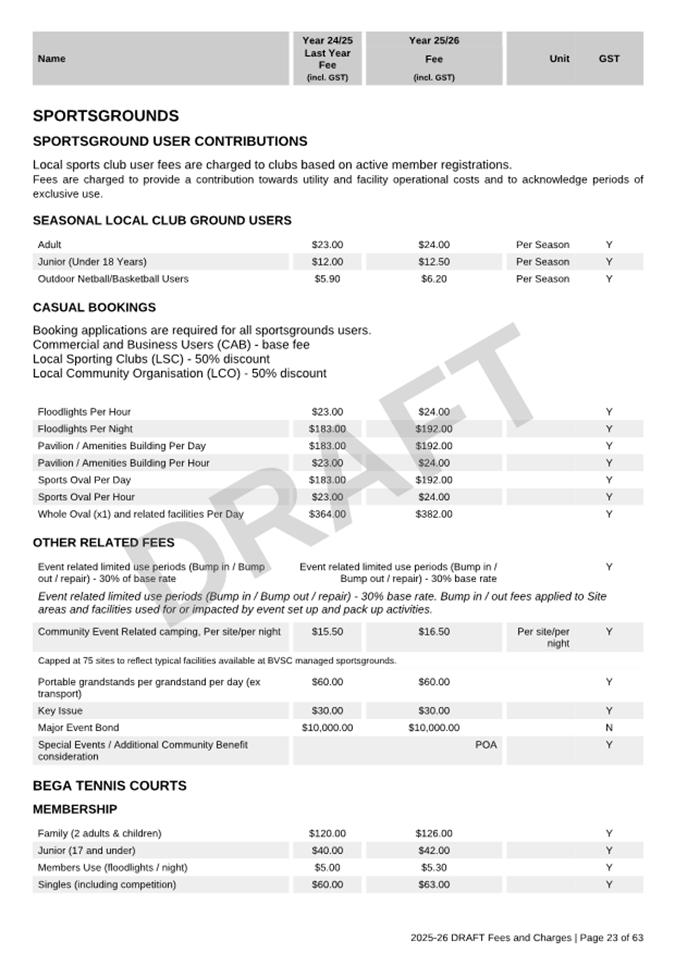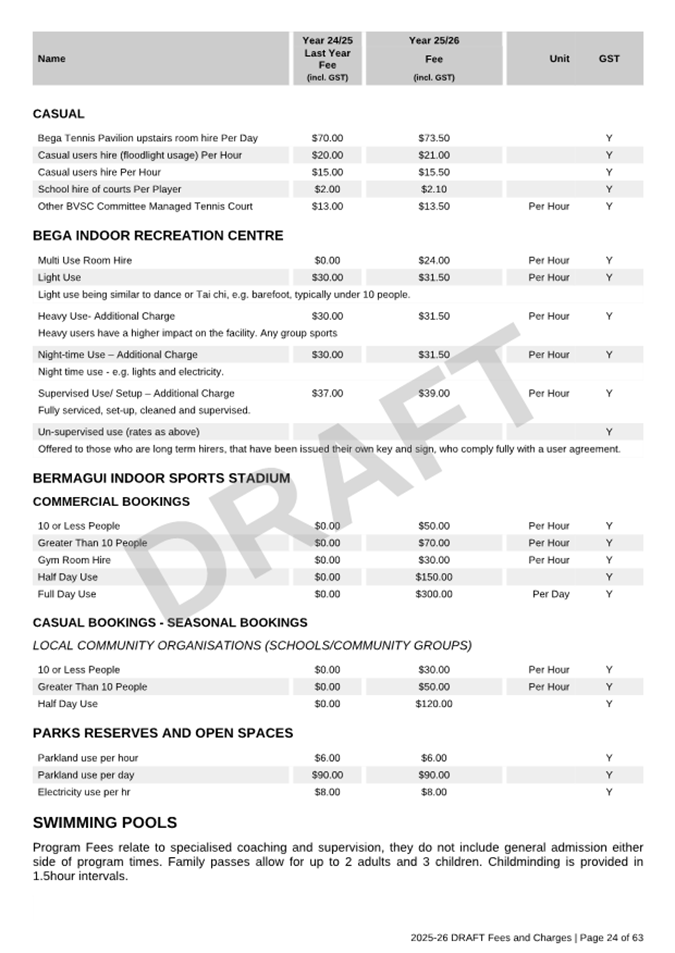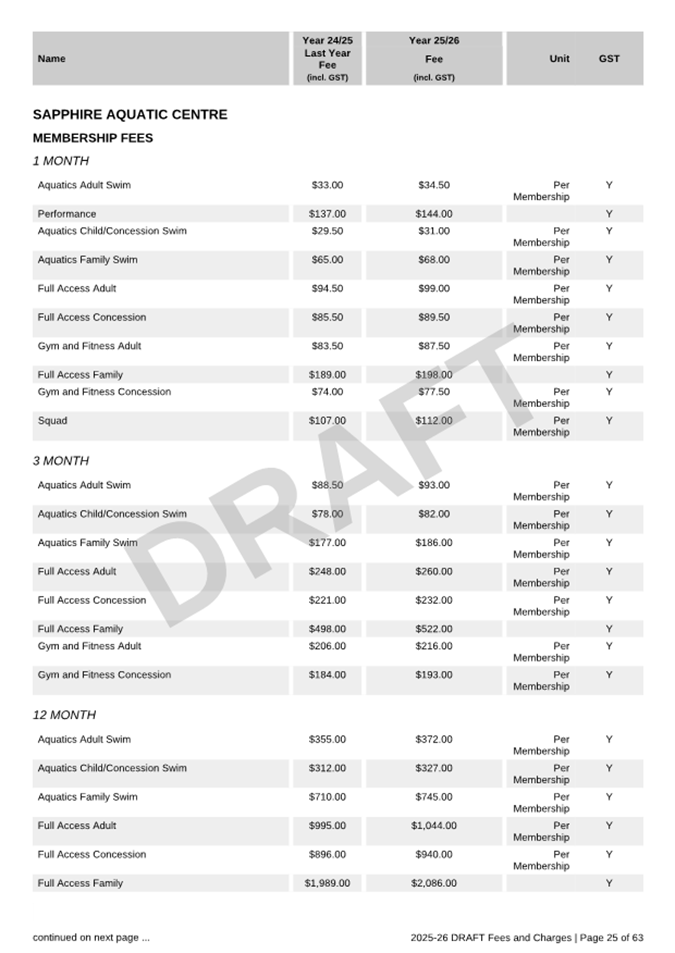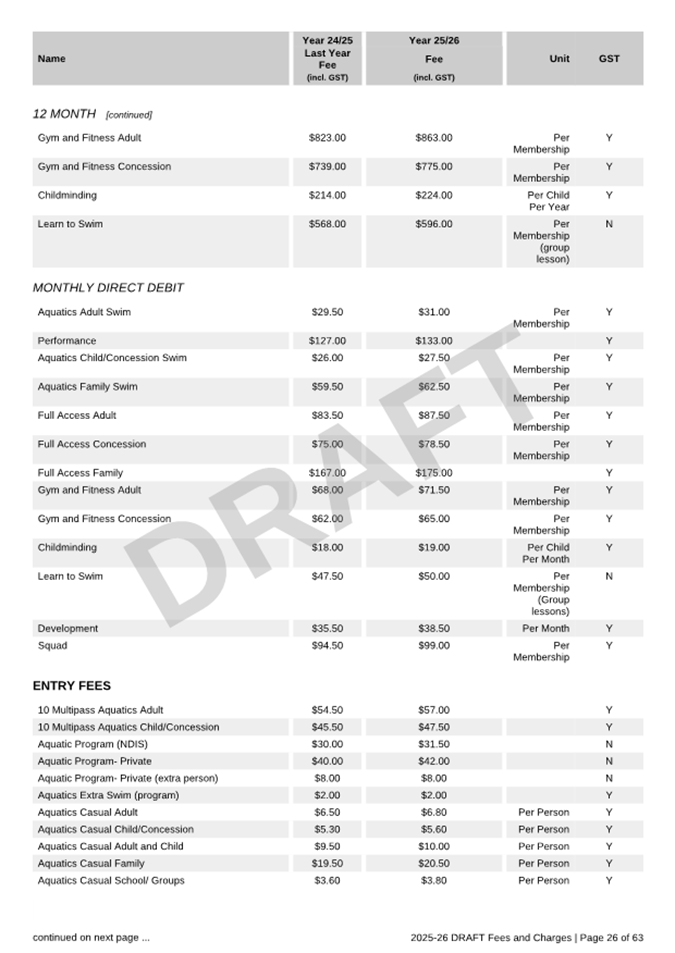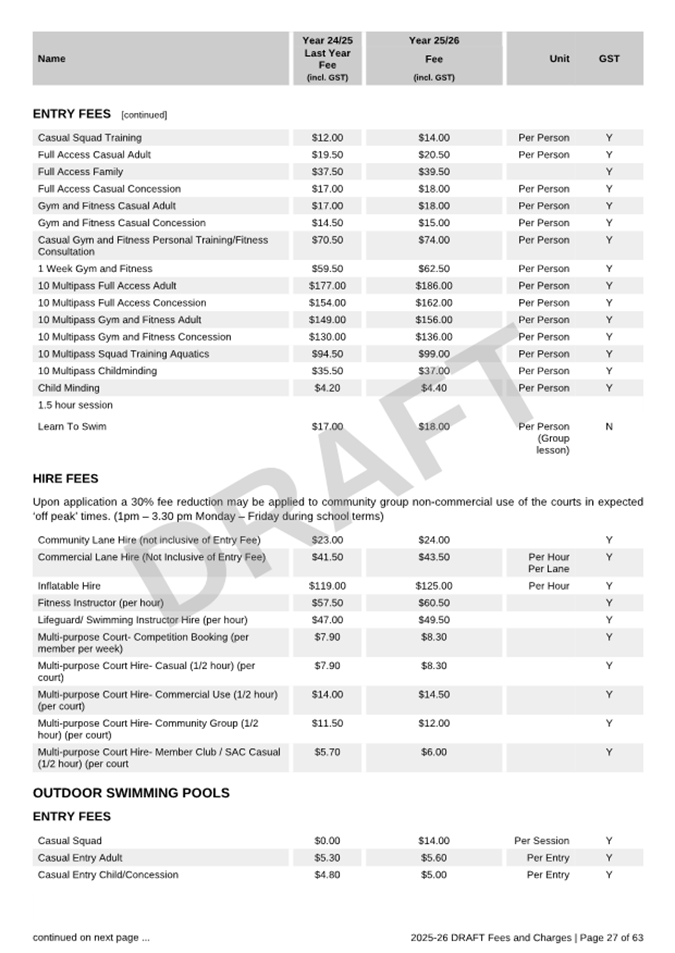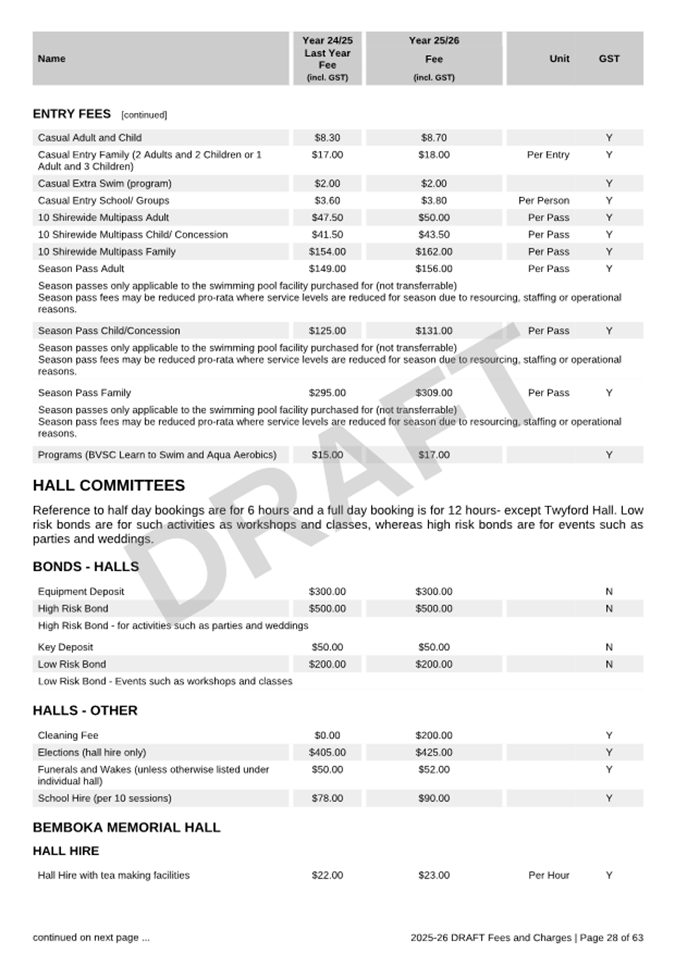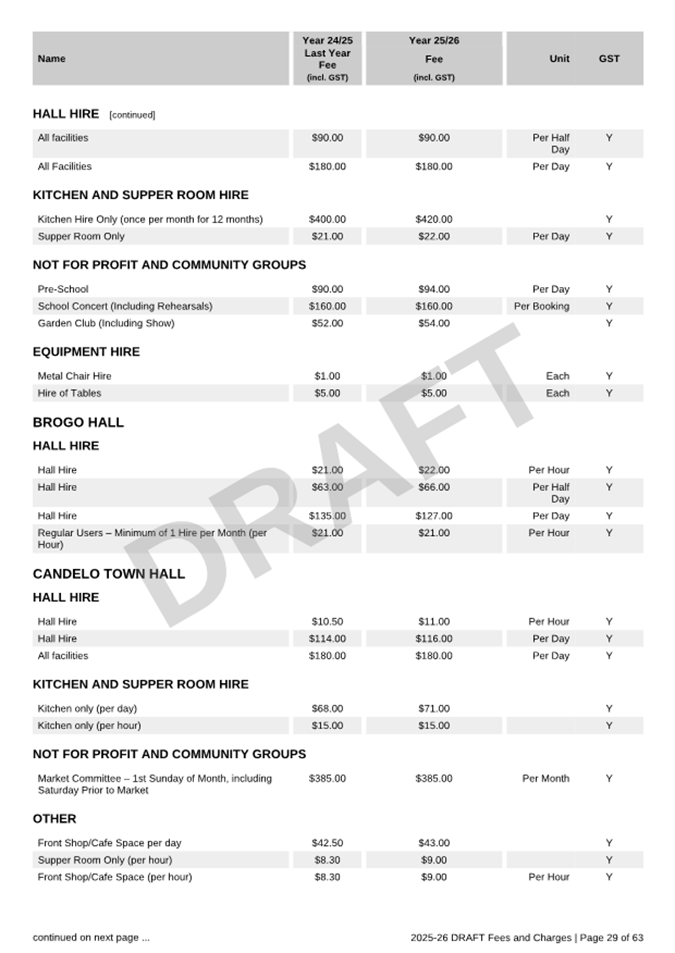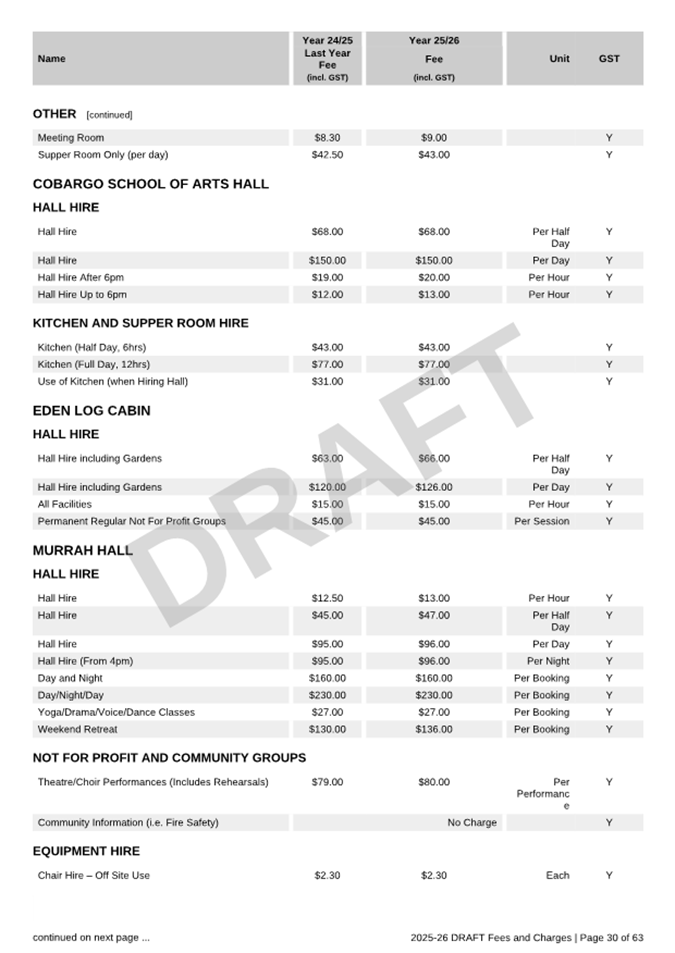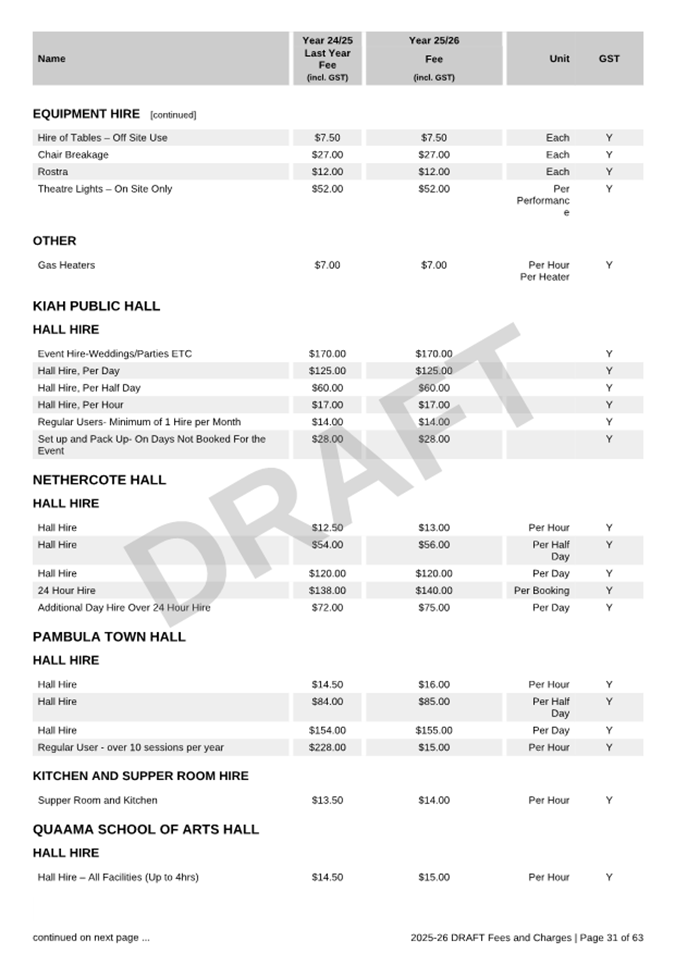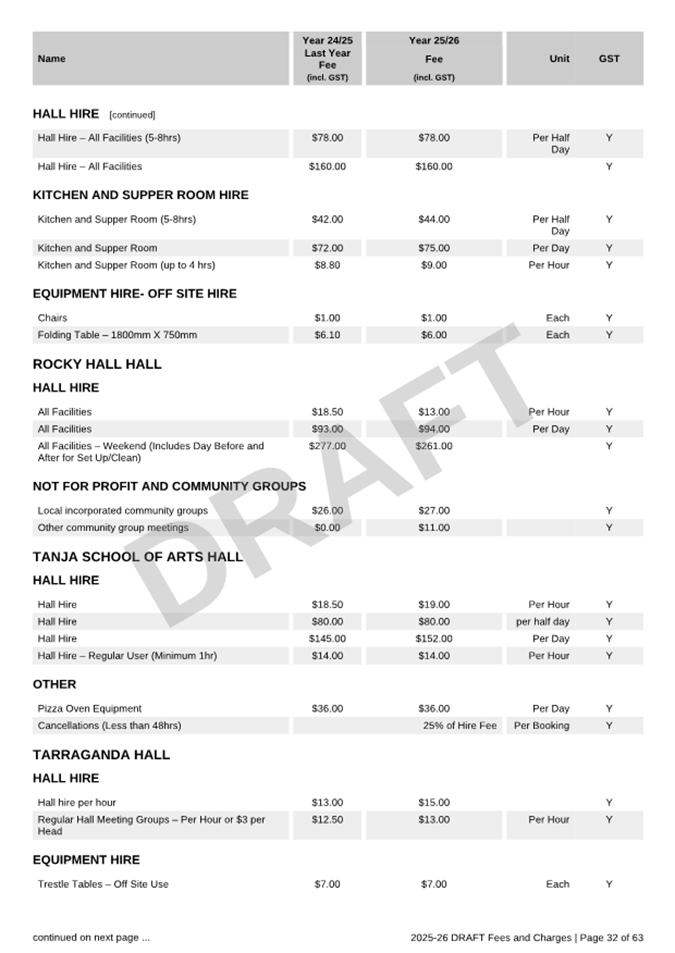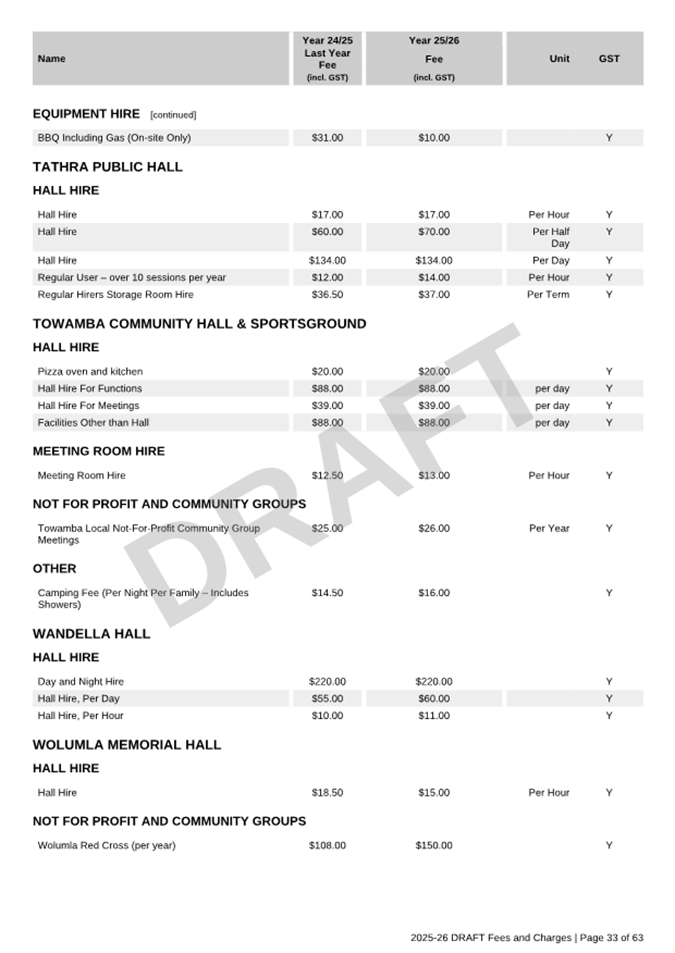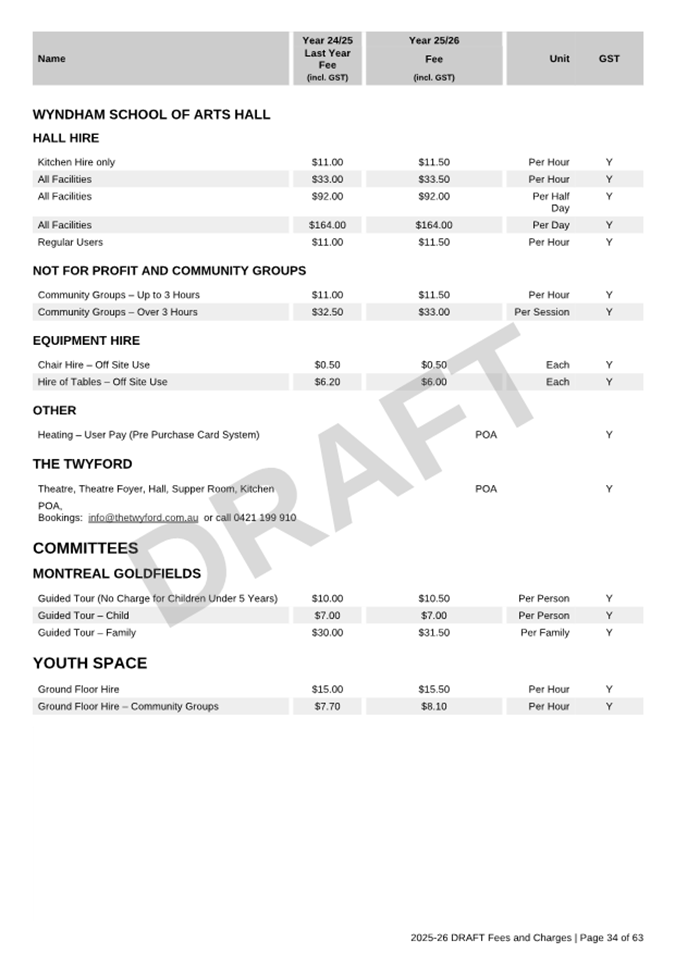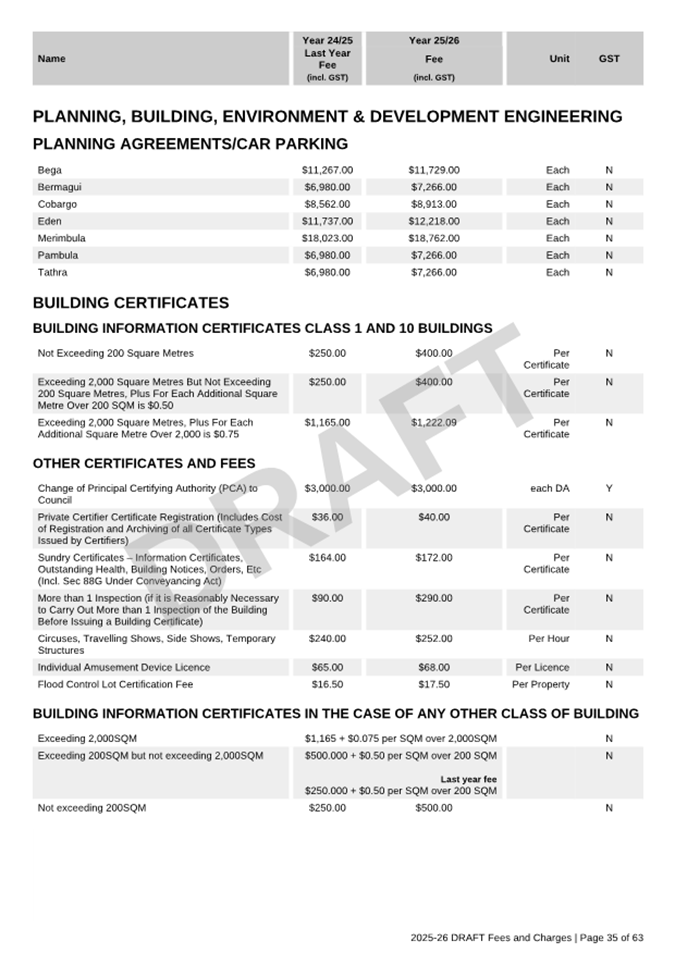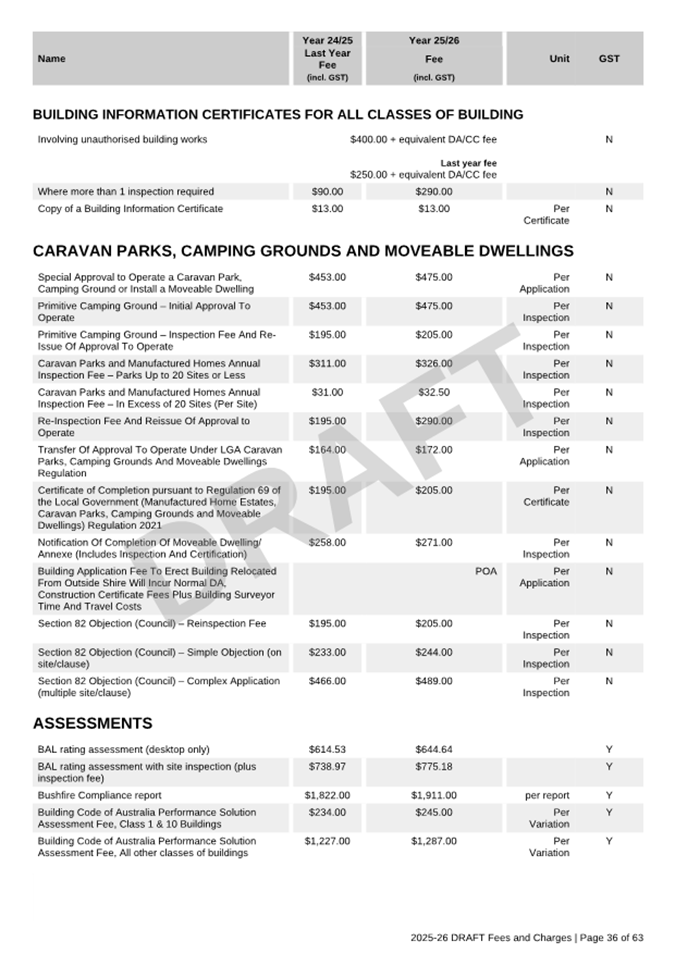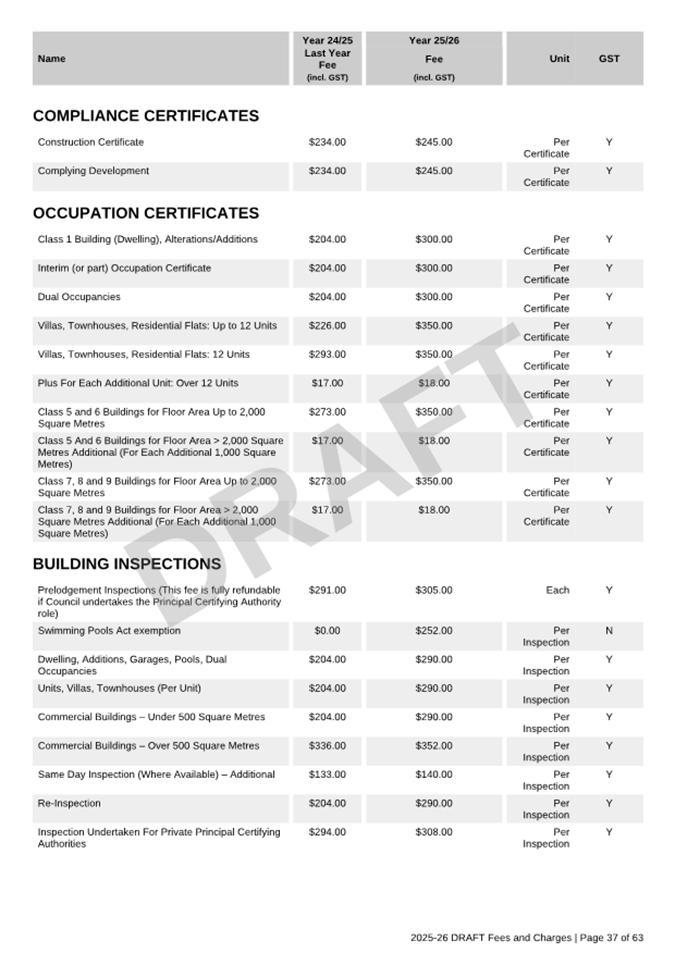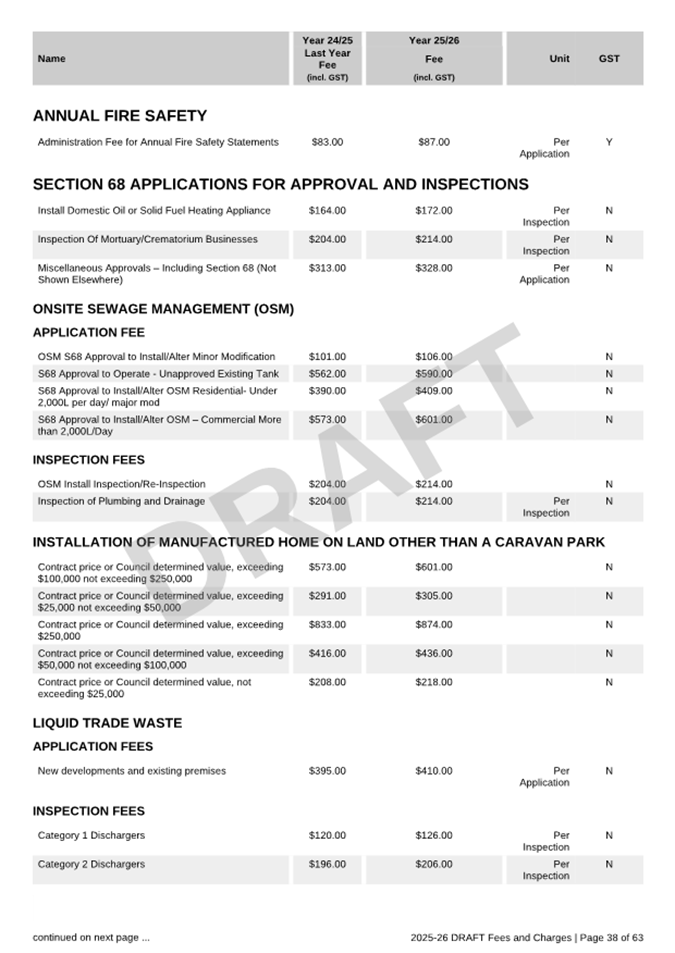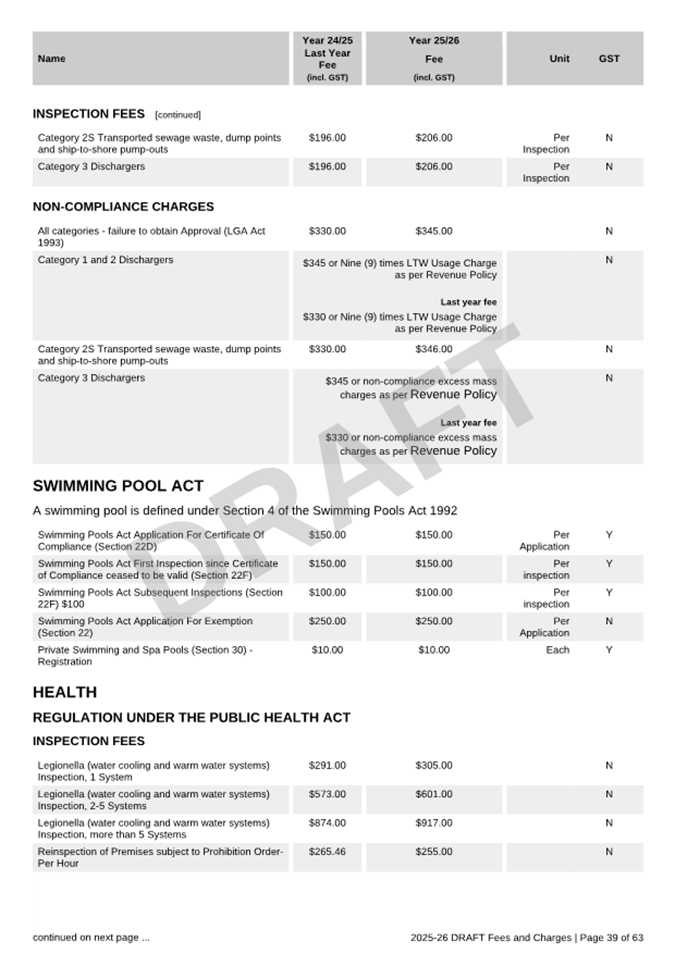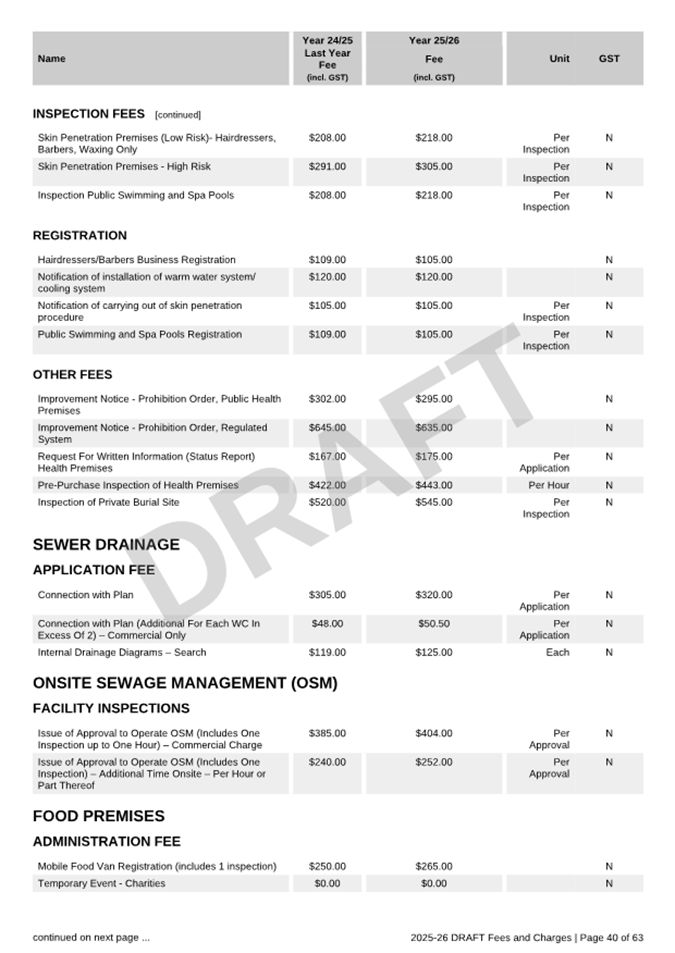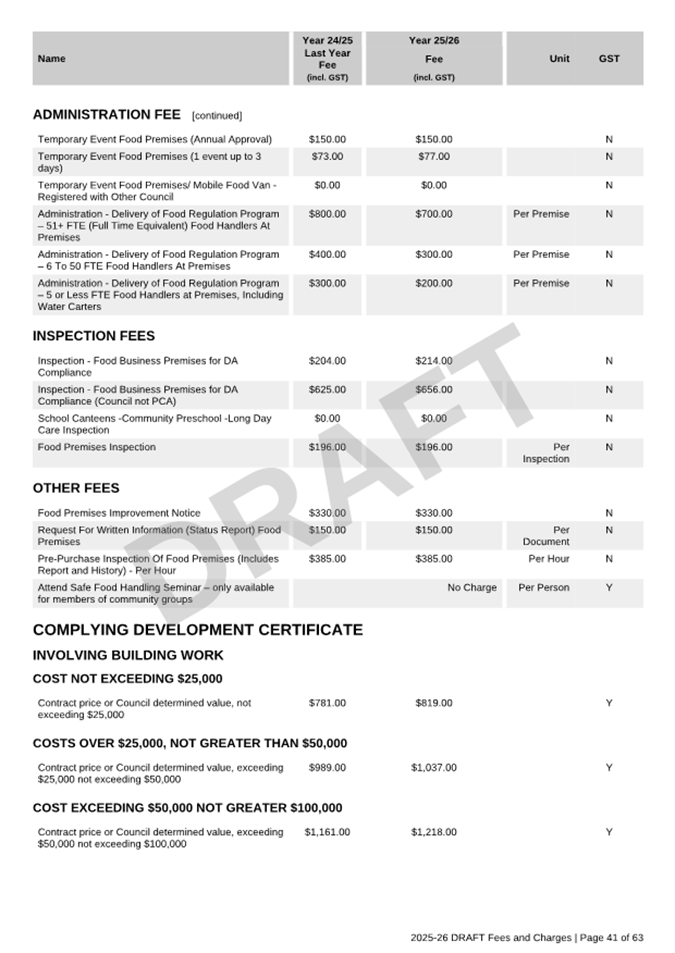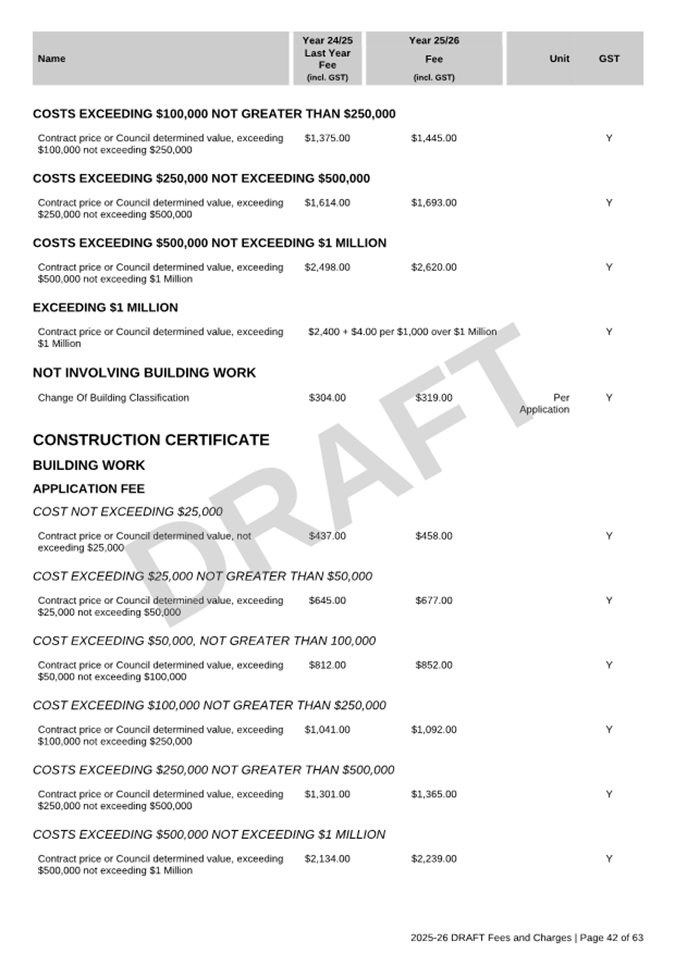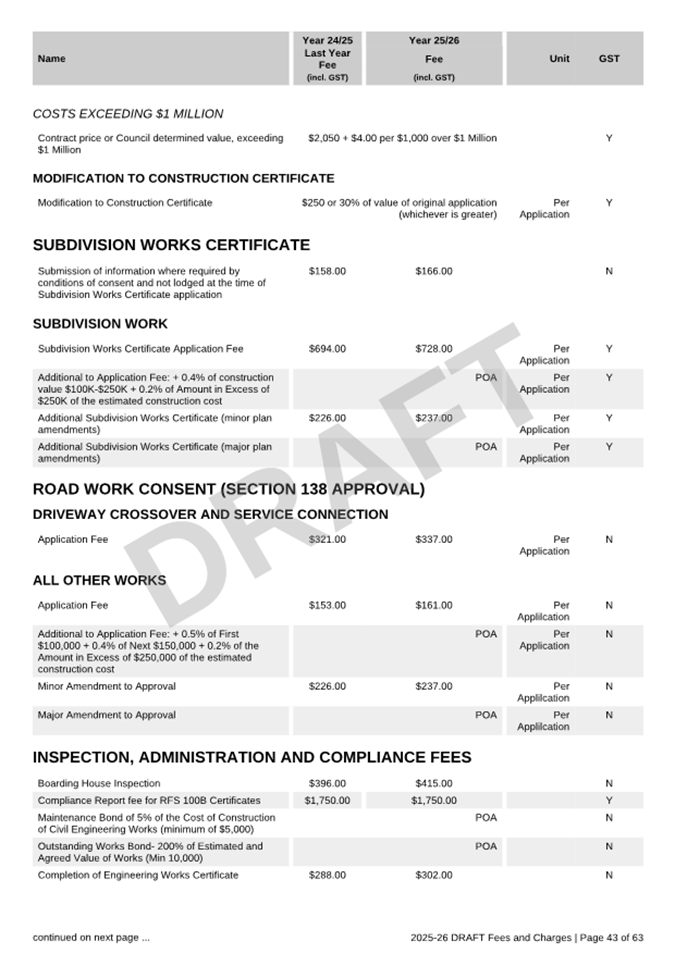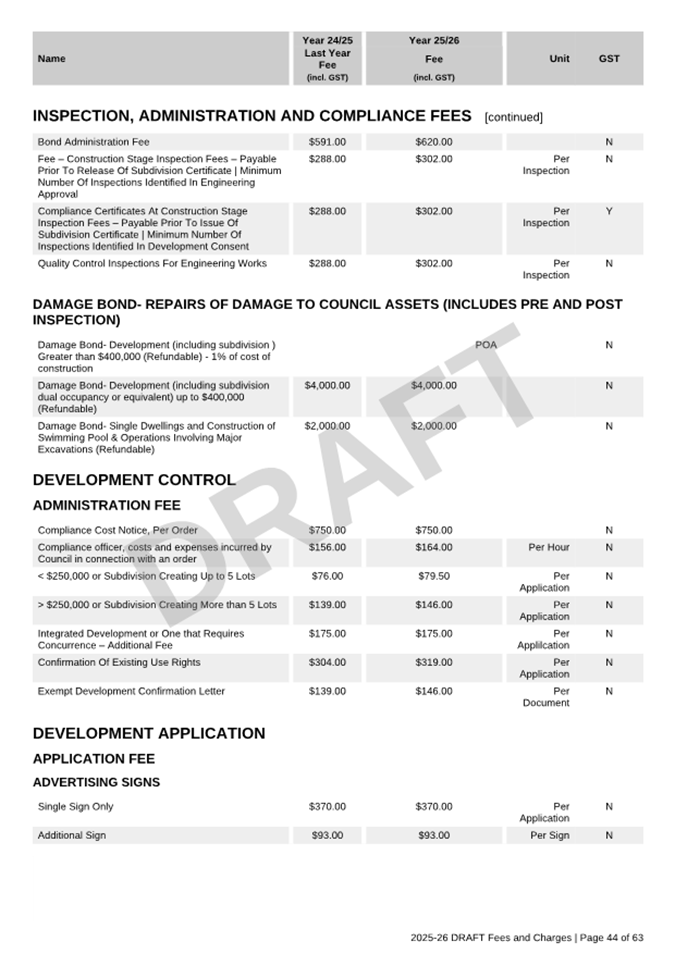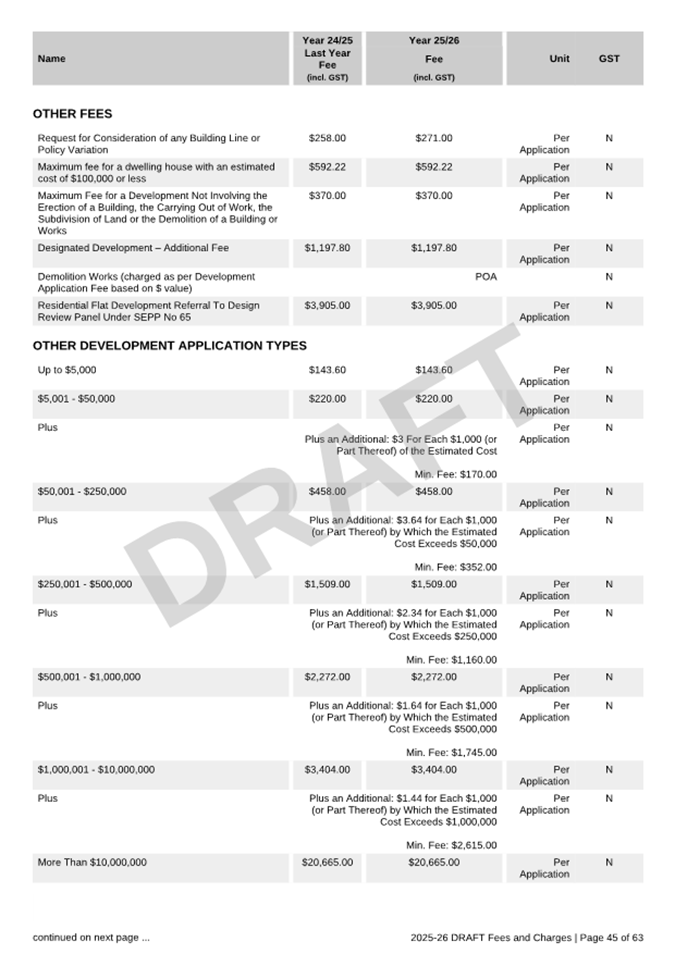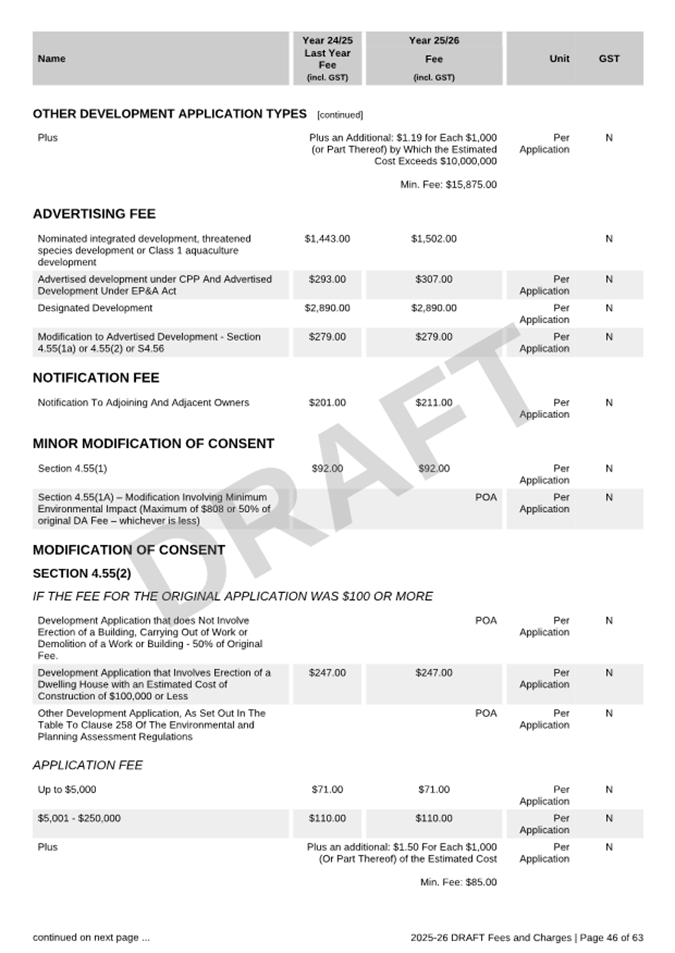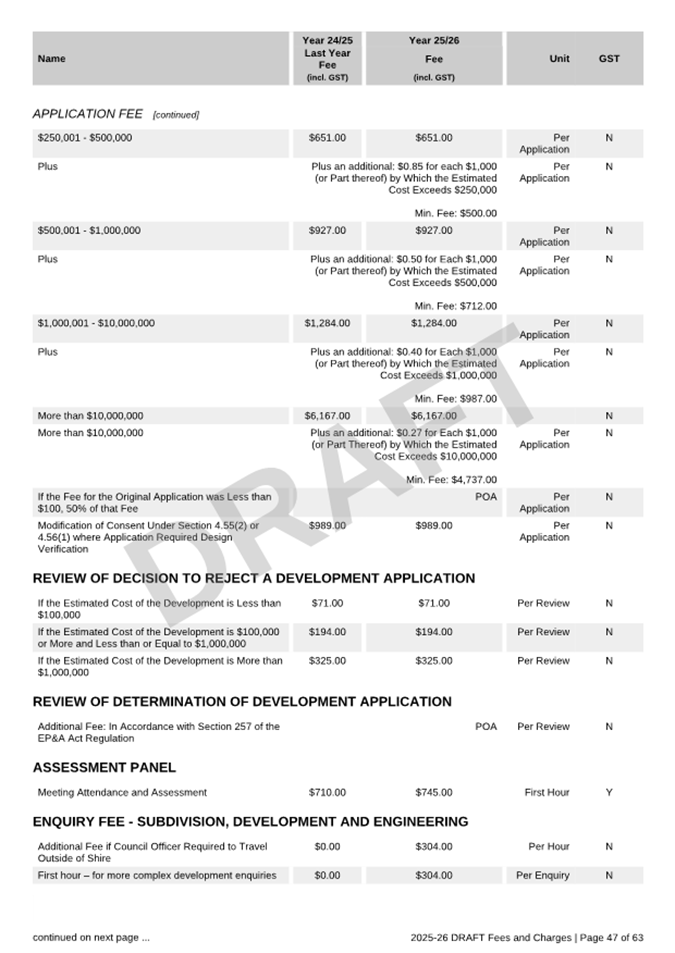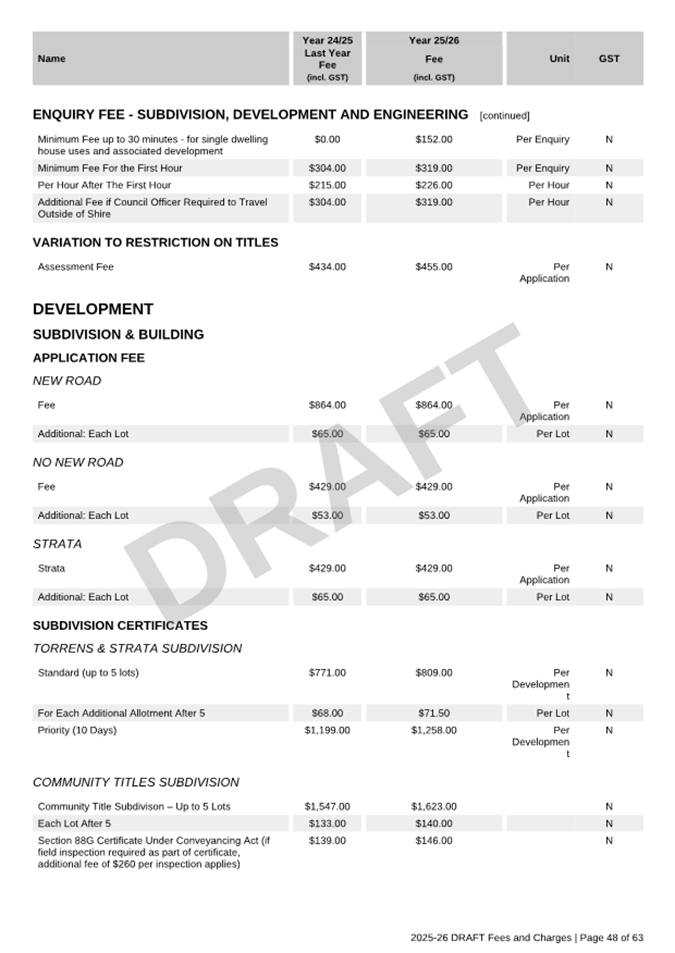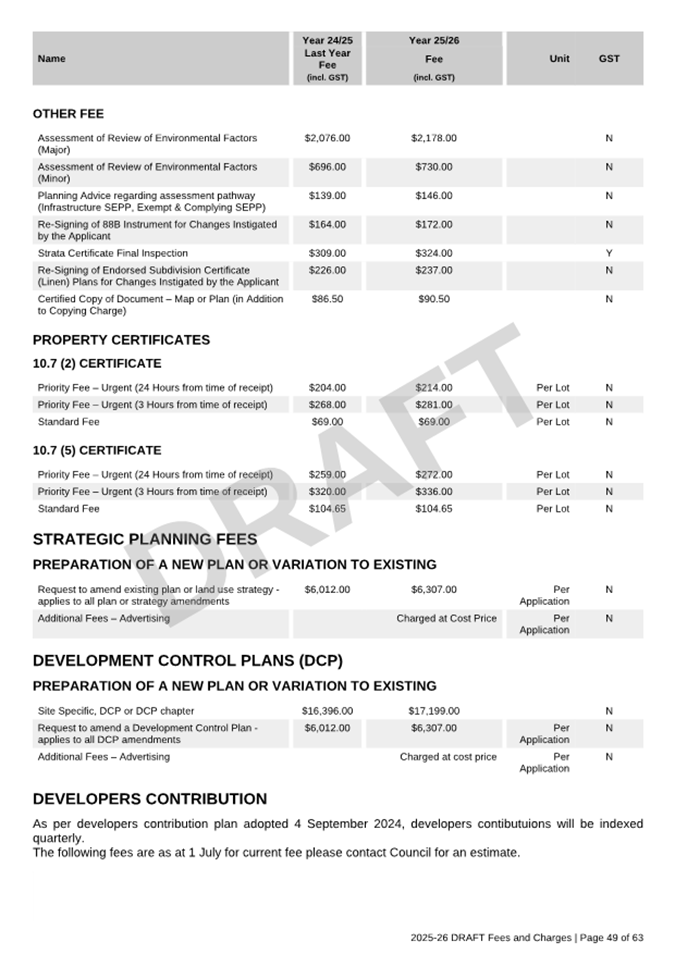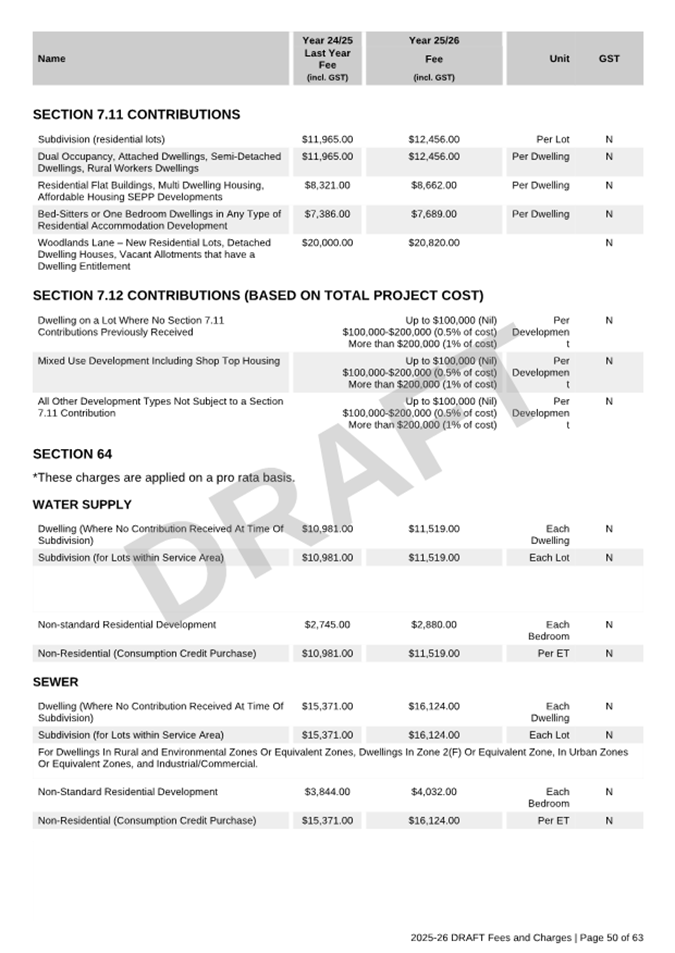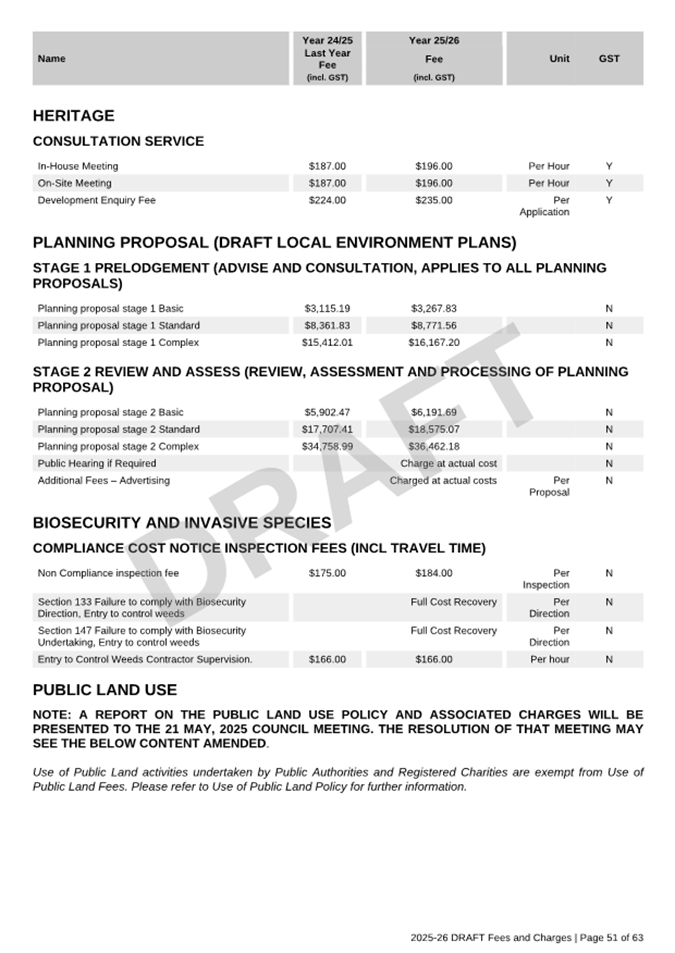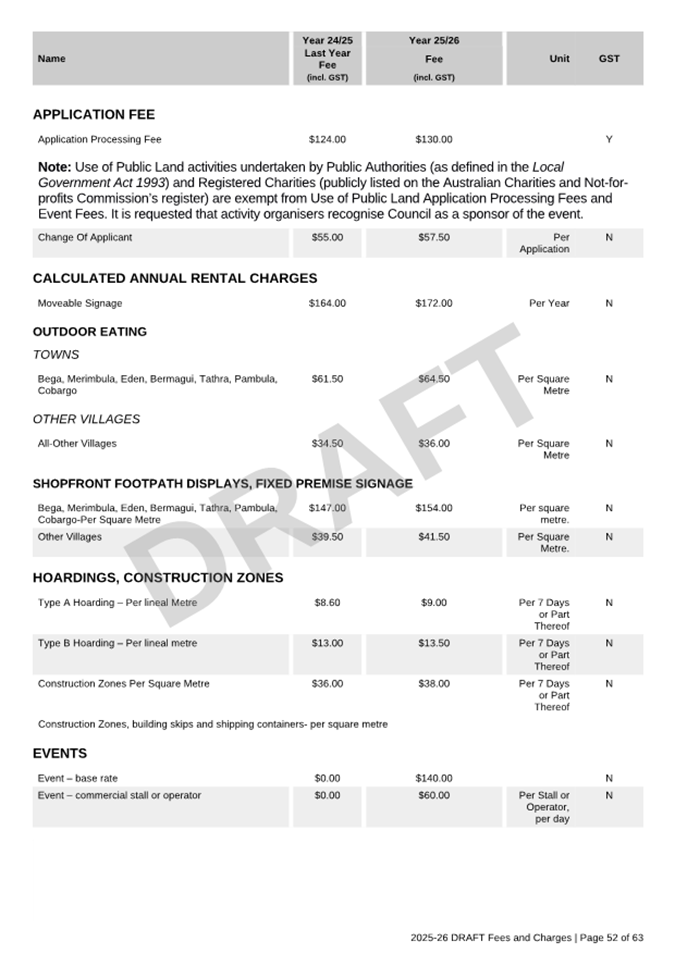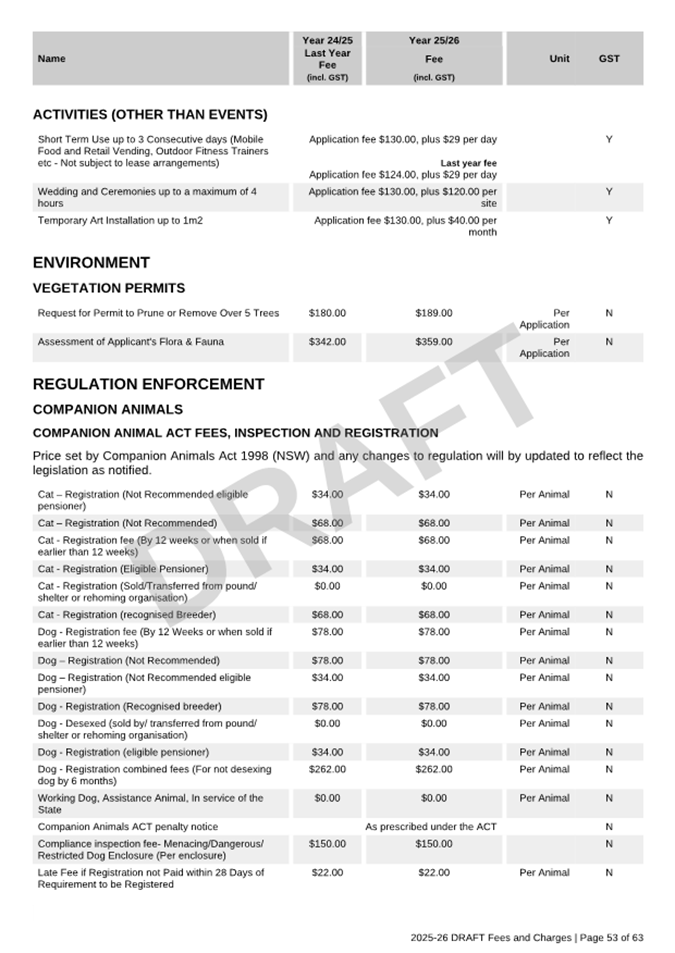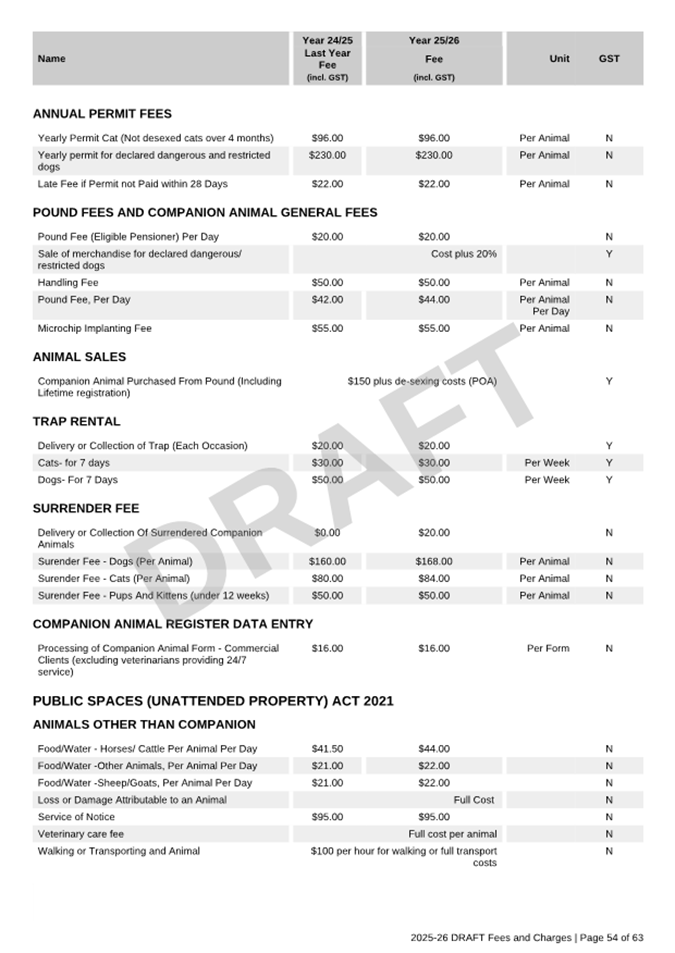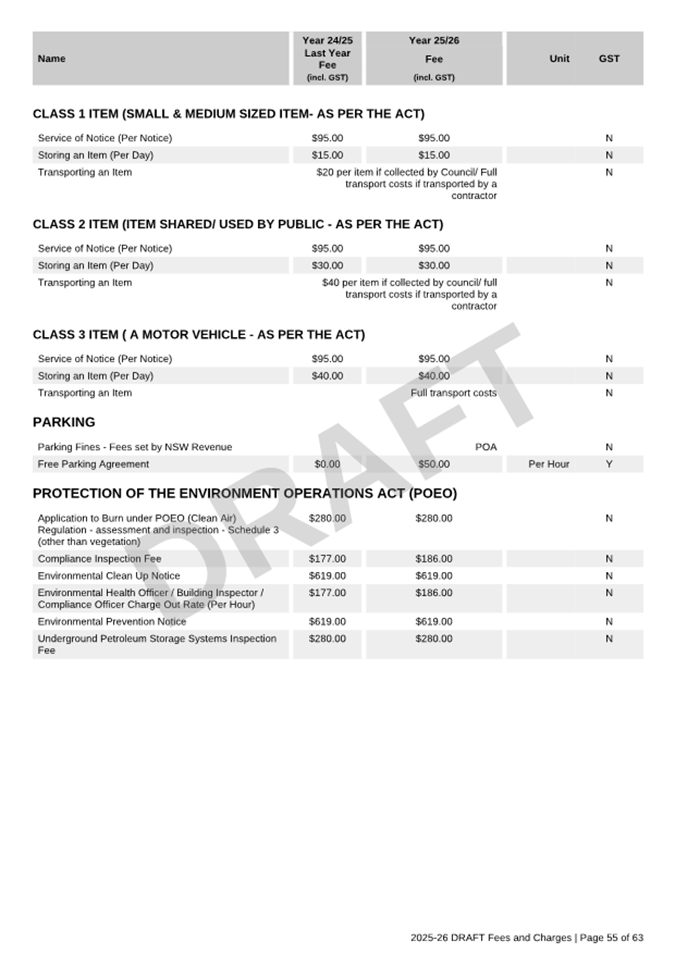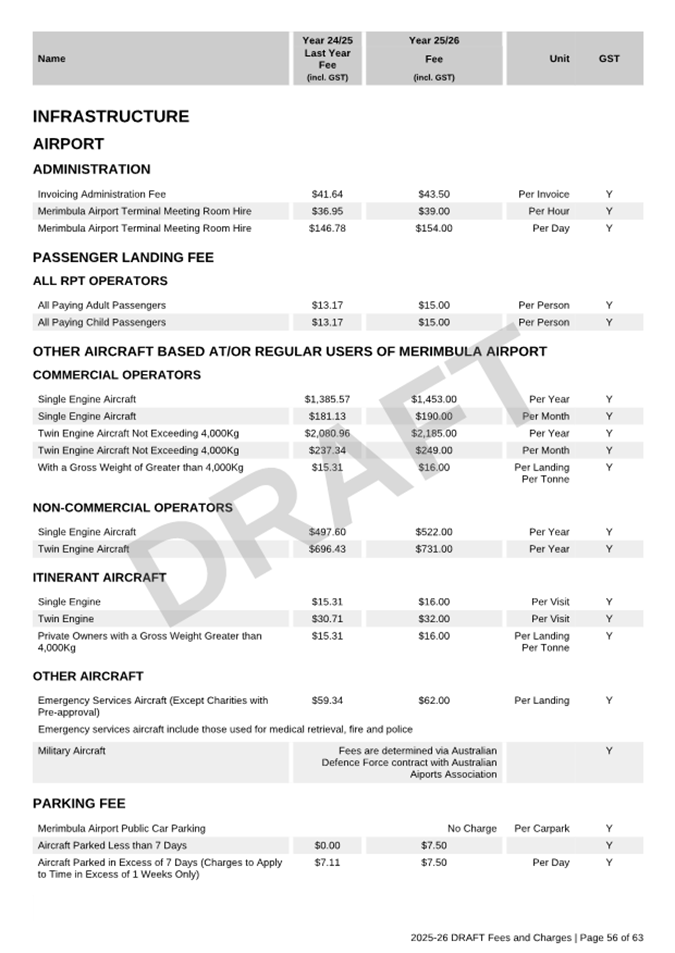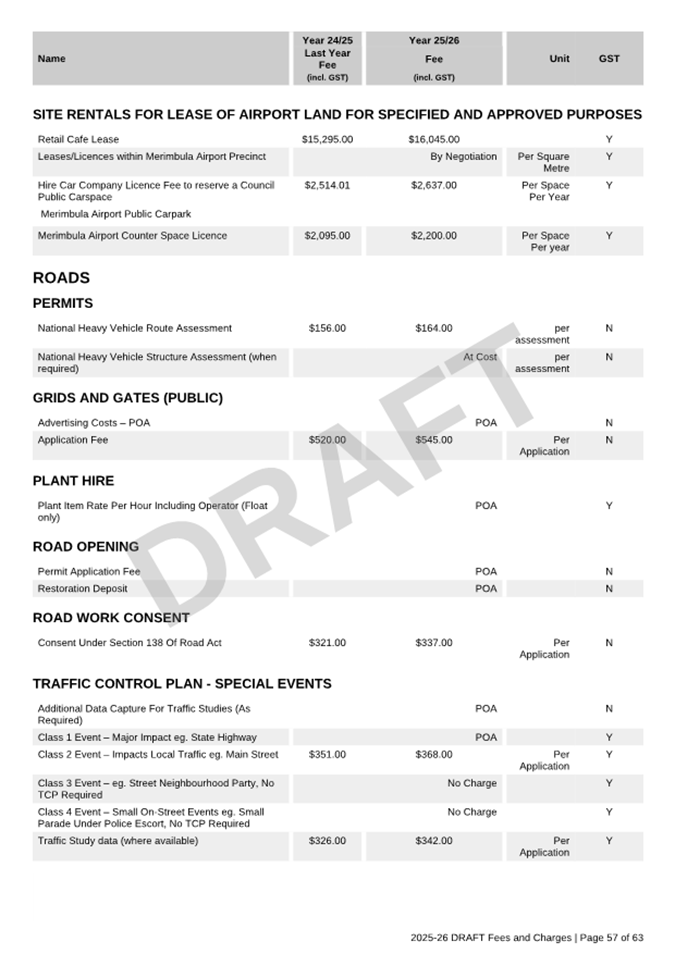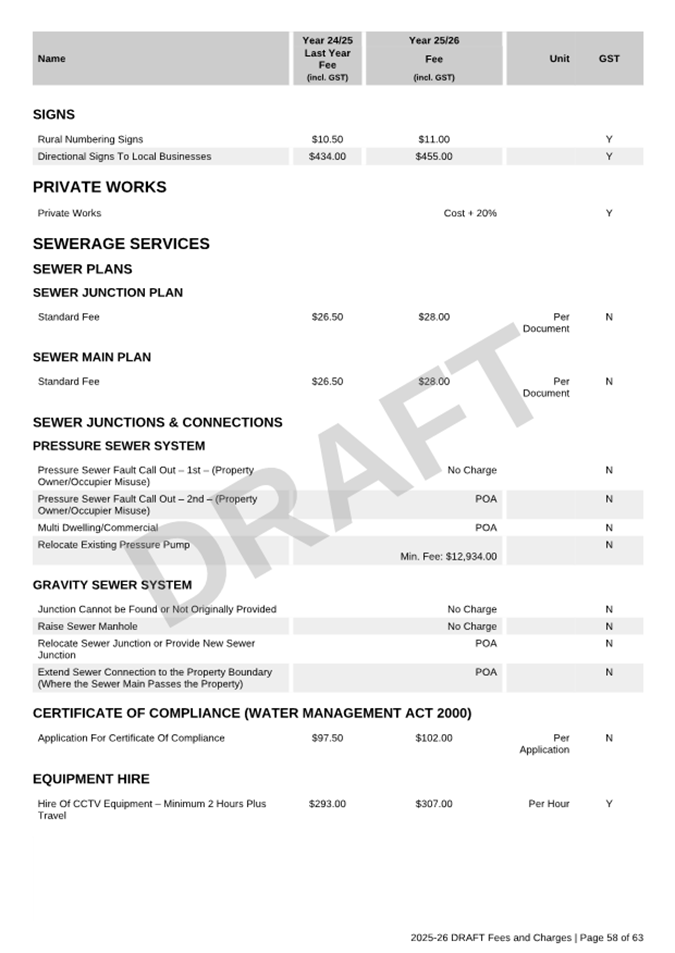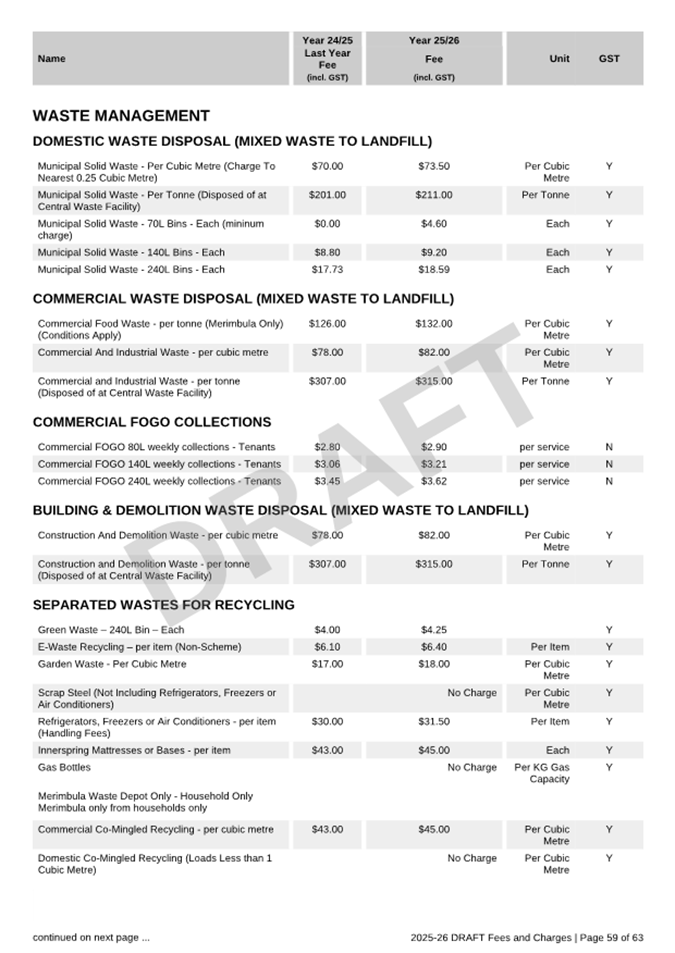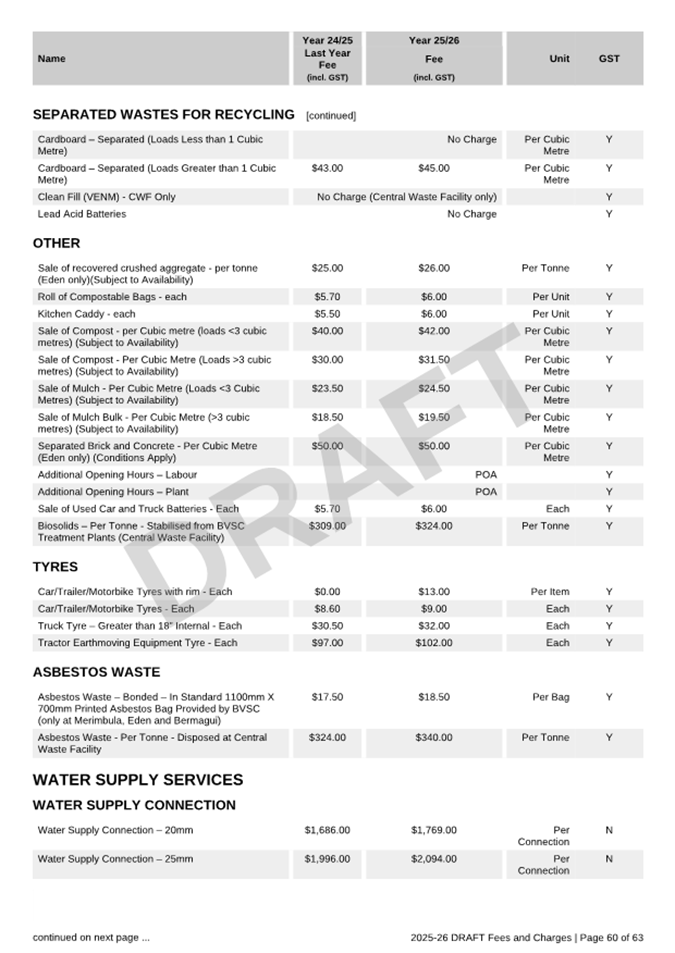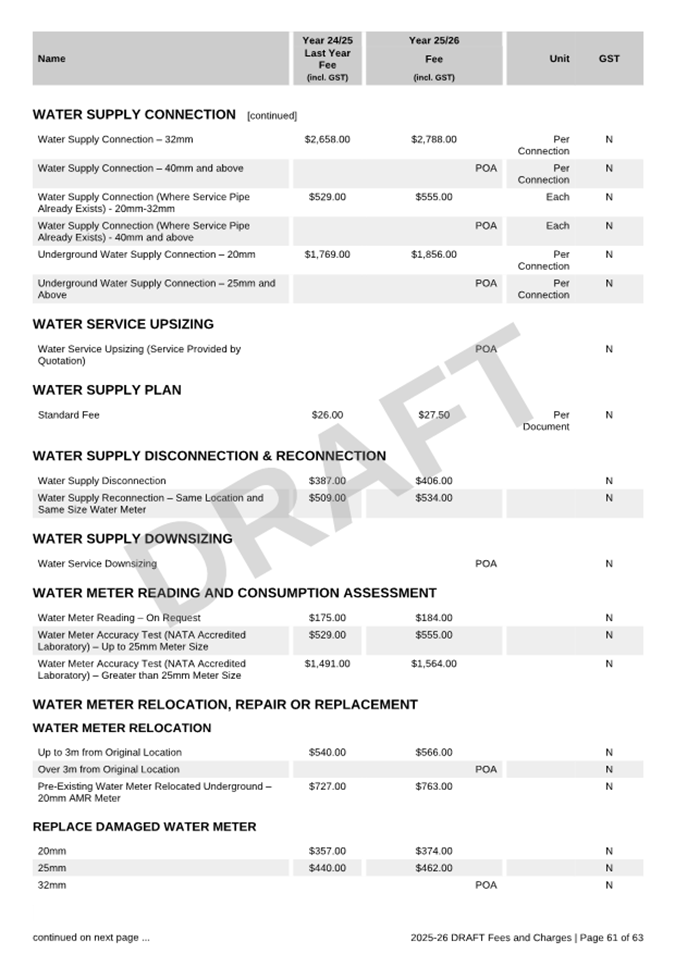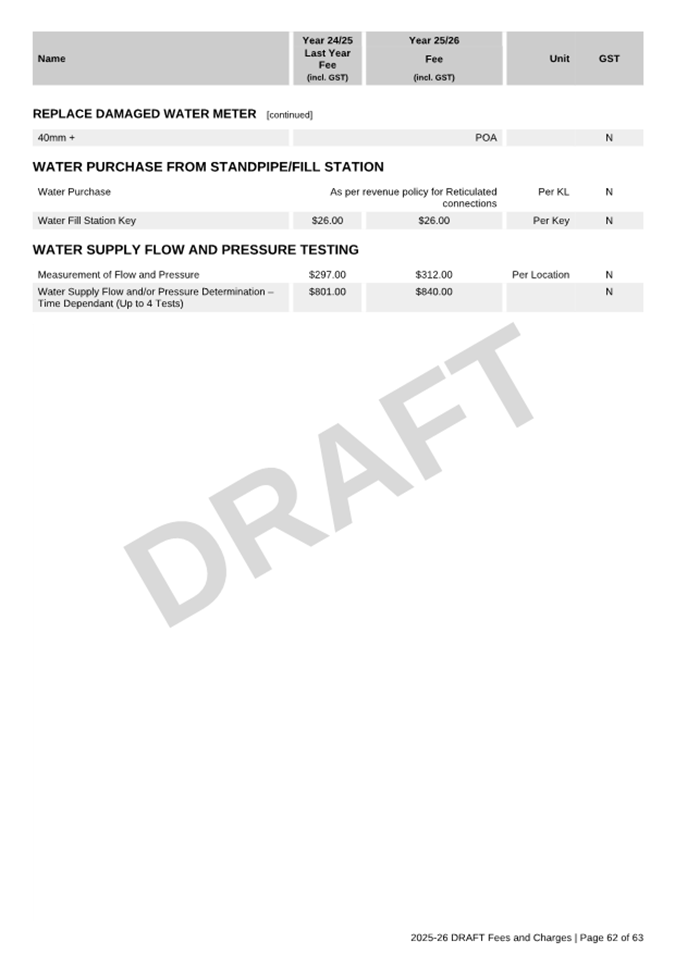|
Council 7 May
2025
|
Item 10.1
|
10.1. Exhibition of Integrated Planning and Reporting documents
This
report recommends that a suite of Integrated Planning and Reporting documents
including an outline of the services, projects and initiatives to be delivered
over the next four years be considered by Council and placed on exhibition.
Director Business & Governance
Officer’s Recommendation
1. That
the draft Community Strategic Plan 2042, draft Delivery Plan 2025-2029, draft Long Term Financial Plan 2025-2034, draft
Digital Services Strategy 2025-2029, draft Workforce Strategy 2025-2029, draft
Strategic Asset Management Plan 2025-2029, draft Revenue Policy
2025-2026 and, draft Fees and Charges 2025-2026
be placed on public exhibition for 28 days.
2. Council
host a total of four (4) community meetings during the exhibition period to
share the plans and receive feedback. A meeting will be held in the towns of
Eden, Merimbula, Bega and Bermagui during May 2025.
3. Following
public exhibition, a further report be provided to Council for consideration of
submissions and adoption of the draft Community Strategic Plan 2042, draft
Delivery Program 2025-2029, draft Long Term
Financial Plan 2025-2034, draft Digital Services Strategy 2025-2029, draft
Workforce Strategy 2025-2029, draft Strategic Asset Management Plan 2025-2029, draft
Revenue Policy 2025-2026 and, draft Fees and Charges 2025-2026 at the Council meeting on 23 June
2025.
Executive Summary
Under the NSW Integrated
Planning and Reporting (IPR) framework councils are required to prepare an
updated Community Strategic Plan, Resourcing Strategy (that collectively
contains the Long Term
Financial Plan, Digital Services Strategy, Workforce Strategy and Strategic
Asset Management Plan), Delivery Program and
Operational Plan after the commencement of a newly elected Council. Each
year councils are also required to develop a Revenue Policy and budget, along
with the annual Fees and Charges.
Council’s current
Community Strategic Plan 2042 was adopted in June 2022 along with a supporting
Delivery Program and Resourcing Strategy. Councillors and staff have
collaborated to develop an updated suite of documents for this term of Council.
The documents will be placed on public exhibition for 28 days, from Wednesday 7
May 2025 until close of business on Wednesday 4 June 2025 for the community to
provide their feedback on the plans Council has developed.
Council continues to improve its IPR practices and this year
have developed a combined Delivery Program and Operational Plan, now referred
to as the Delivery Plan. This document provides improved visibility of the
services and projects to be delivered in the next 4 years. As with any plan
there will be adjustments made throughout this period as we respond to
challenges and opportunities that come our way.
Council’s CEO has recently initiated a proposed
organisational restructure. Future iterations of the plans included in this
report may be adjusted pending the outcome of that process.
Background
The Local Government Act
1993 requires all NSW councils to review and adopt key integrated
plans under the NSW Integrated Planning and Reporting (IPR) framework. Councils
are required to prepare a Community Strategic Plan, Resourcing Strategy,
Delivery Program and Operational Plan, Revenue Policy and Fees and Charges.
The Community Strategic Plan
2042 is a refresh on the previous iteration that was adopted in 2022.
Delivering on the vision and objectives outlined in the CSP is not something
Council can achieve in isolation. Shared decision making and effective working
partnerships with government agencies, non-government organisations, business
and, of course, the community will be critical.
The Resourcing Strategy is a
collective label for four key planning documents; Long Term Financial Plan,
Strategic Asset Management Plan, Digital Services Strategy and the Workforce
Strategy. These supporting documents outline the assets, people, money and
systems that are needed to implement our Delivery Plan.
For many years we have connected our planning to the themes
in the Community Strategic Plan. This Delivery Plan is somewhat different.
Firstly, we are fully combining the four-year Delivery Program and one-year
Operational Plan into a single document that covers 4 years and calling it the
Delivery Plan. It’s a shorter, more concise document that is aimed at
providing clarity on the work we are delivering. Secondly, we have evolved our
planning processes to focus on the role that Council plays for our community,
whether providing services and looking after our assets, collaborating with
various stakeholders to drive change, or advocating for our community so that
other levels of government understand our unique needs. All our work helps to
deliver on one or many outcomes outlined in the Community Strategic Plan.
The below diagram shows the relationship between the
documents and the importance of ongoing engagement, monitoring and evaluation
that will take place. Council will review the Delivery Plan every year and
continue to provide detail on what we will deliver over the following four
years. Our Long Term Financial Plan and Strategic Asset Management Plan will
also be reviewed on an annual basis. We will report on a quarterly and annual
basis the progress we have made in putting both the Delivery Plan and Resourcing
Strategy into action.

Community Strategic Plan 2042
Since the first Community
Strategic Plan (CSP) was developed over a decade ago, it has been used by
Council to inform decisions and set the agenda for long-term planning of
projects, infrastructure and services. Council has a custodial role in
initiating, preparing and maintaining the CSP. Its implementation draws on the
continuing partnerships with all levels of government and agencies,
non-government organisations, businesses and the community.
With the election of a new
council in September 2024, NSW Integrated Planning and Reporting legislation
requires that the CSP be reviewed and updated to ensure it reflects the
community’s priorities. This updated CSP builds on the 2022 Community Strategic
Plan, and considers the information gathered from engagement activities that
took place in February and March 2024. The community contributions have
highlighted the strengths of our region and identified the key challenges we
face. Over 750 residents provided their input on four key questions; Where are
we now, where do we want to be, how will we get there and when will we know we
have arrived.
The CSP has 5 themes- our
community, our economy, our environment, our infrastructure and our civic
leadership. Every aspect the work that Council delivers meets one or many of
these CSP themes. Our Delivery Plan and Resourcing Strategy documents outline
our efforts in reaching the objectives outlined in the CSP.
The Draft Community Strategic
Plan 2042 is Attachment 1 to this report.
Delivery Plan 2025-2029
The Delivery Plan details the
services and projects Council will deliver over the next four-years. It is the
result of rigorous planning and prioritisation and aims to provide the best
value services to the community. The Delivery Plan details the capital program
over the next 4 years that sees over $325 million invested in our assets. It
also outlines the day-to-day core business that our 30 service areas deliver,
along with 3 cross-organisational priority projects and 120 focus projects to
improve the services we provide.
The
Delivery Plan 2025-2029 is structured around the different roles Council has:
· Provide:
Services, facilities, infrastructure, programs, planning and engagement.
· Collaborate:
Partner with community, business and industry, other councils, and other tiers
of government.
· Advocate:
Amplify the voice of our community to get the best possible outcomes.
The
Draft Delivery Plan 2025-2029 and its two appendices are Attachments 2, 3 and 4
to this report.
Resourcing
Strategy
Long
Term Financial Plan
The Long Term Financial Plan
(LTFP) was last updated in June 2024. The draft 2025-34 LTFP includes 3
options for the general fund- Option A, Option B and Option C. These options
show differing levels of services and projects that can be achieved aligned
with the income needed to make it possible. Both Option A and B need
significantly more funding and we have outlined options to make that possible.
The LTFP is compiled using a range of estimates and
assumptions to project the future revenue and expenditure required by Council
to deliver the services and projects we have planned. These estimates and
assumptions are based on what we know now and will change as we understand more
about the external impacts on our plans.
The LTFP helps to make informed decisions about what we can
afford and when we need to invest funds to keep services running smoothly,
avoid running out of cash and to ensure future generations are
considered.
The
Draft Long Term Financial Plan 2025-2034 is Attachment 5 to this report.
Strategic
Asset Management Plan
Council manages and maintains more than $2 billion worth of
assets, which enable us to provide services to our community. These assets
include roads, drainage, pathways, water and sewer infrastructure, community
facilities, parks and recreational facilities, administration buildings,
cemeteries, works depots, plant and vehicle fleet and the Merimbula Airport.
The level of service delivered by these assets is largely determined by the way
they are maintained and operated within Council’s available resources.
The Strategic Asset Management Plan (SAMP) sets out the
broad framework for undertaking structured and coordinated management of
Council’s assets in accordance with Council’s Asset Management
Policy. It outlines key principles that underpin our approach to providing the
assets that are essential to our community. Supporting the SAMP are detailed
Asset Management Plans (AMP’s) for each asset class, which are living
documents that are continually updated and refined. Summaries of the AMP’s
are included in the SAMP.
The SAMP must be considered in conjunction with the Long
Term Financial Plan 2025-34, that outlines the available funding under three
different revenue options. Aligned with those three revenue options are three
different capital programs to describe what asset maintenance, renewal and
upgrades can be achieved within each option. It becomes obvious that Council
must seek additional sources of revenue or lower its levels of service in some,
or most, of its service areas.
We have a vast number of assets spread across our shire that
depreciate every year, and we have insufficient funds to adequately maintain
and renew them. This reality underscores the importance of planning, continuous
improvement and clearly articulating the resourcing gaps we have in meeting our
asset management responsibilities.
The Draft Strategic Asset
Management Plan 2025-2029 is Attachment 6 to this report.
Workforce
Strategy
The Workforce Strategy looks at the current needs of the
organisation and considers what might be needed from our workforce into the
future. It also considers personnel risks and opportunities that Council will
face over the 4-year period between 2025 and 2029.
The purpose of this Workforce
Strategy is to identify the strategic challenges and opportunities we face as
an employer and focus our efforts on actions that help us achieve the outcomes
for our community.
|
Parts of the Workforce
Strategy
|
|
Part
|
Name
|
Description
|
|
1
|
Our current situation
|
Includes information
about our workforce profile, our values, and achievements during the
2021-2024 period. The details included in this section are based on data from
Council’s 2024 Annual Report.
|
|
2
|
Our future
|
Looks forward at the
2025-2029 period and our intended outcomes and objectives. It considers the
strategic challenges we have as an organisation, our opportunities, and the
goals we have for building our workforce.
|
|
3
|
Action plan
|
What will help us reach
our goals for the 2025-2029 period.
|
The
Draft Workforce Strategy 2025-2029 is Attachment 7 to this report.
Digital
Services Strategy
Our Digital Services Strategy provides strategic guidance
and direction for digital, data and technology investment, ensuring resources
are used in support of our organisation goals and objectives.
Our
Digital Services Strategy and its supporting Initiatives:
1. Sets
clear direction for digital investments
2. Enables
efficiency and accessibility of service improvements
3. Fosters
innovation
4. Improves
community engagement
5. Ensures
resilience and responsiveness in a changing digital landscape.
We want to create a more efficient, resilient, and digitally
enabled Council that thrives on innovation and sustainability. To achieve this,
we need more financial investment, capacity, and capabilities than is currently
allocated. Prioritising our digital transformation, competes with other budget
demands equally as important. Striking the right balance in digital investment
funding will continue to be reviewed on an annual basis as actions within this
strategy are delivered. We currently invest $700,000 annually in Digital
Transformation, with an estimated need closer to $1.3 million annually. This
level of resourcing will continue to impact our ability to fully deliver this
strategy.
The
Draft Digital Services Strategy 2025-2029 is Attachment 8 to this report.
Revenue Policy
The draft Revenue Policy 2025-26
outlines the proposed rating structure, pensioner rebates, borrowings, debt
recovery, transfer of rates and supply charges for water, sewer and waste
services. In this year’s revenue policy changes have been added to better
support affordable housing initiatives and the inclusion of additional sewer
discount factors to support non rateable community organisations.
Council general rates are
proposed to increase by the IPART advised rate peg of 4.9%. Water and Sewer
access and usage charges are set to increase by 4.9%. Waste charges will also
be increased by 4.9%. Our draft 2025-26 budget (Option C) has been developed
assuming this level of rate increase will be adopted.
Projected General Rates Income
The rate peg for 2025-26 is set at 4.9%.
|
Category
|
Base Rate $
|
Ad-valorem Amount ¢ in
dollar
|
Base rate %
|
Number of Assessments
|
Rate Yield $
|
Rate Yield %
|
|
Residential
|
843
|
0.00240455
|
46
|
18,551
|
34,924,933
|
84
|
|
Farmland
|
843
|
0.00240455
|
25
|
784
|
2,655,935
|
6
|
|
Business
|
843
|
0.00645049
|
18
|
895
|
4,247,432
|
10
|
|
Mining
|
0
|
0
|
0
|
0
|
0
|
0
|
|
|
TOTAL
|
20,530
|
41,828,361
|
100
|
Council will conduct a review of
the rating structure during the 2026 financial year. This review will focus on
ensuring our rating structure is fair and equitable for all ratepayers.
The
Draft Revenue Policy 2025-26 is Attachment 9 to this report.
Fees and Charges
In accordance with Section 608
of the Local Government Act 1993 and other relevant
legislation, Council is authorised to charge and recover approved fees and
charges for any service it provides. All Council’s fees and charges are
reviewed on an annual basis prior to finalisation of Council’s budget and
several Council facility management committees have provided their input into
the draft fees and charges.
Fees and charges in general (not
including statutory fees, fees set by management committees or those aligned
with CPI) have been increased by 4.9%, aligned with rate peg. There are several
proposed changes to the draft fees and charges for this year as outlined below.
· A new fee of $250 has been added to enable Council to
determine applications for exemptions under Section 22 of the Swimming Pools
Act 1992 that enables Councils to ‘grant exemptions from barrier
requirements that are impracticable or unreasonable in particular cases.’
The new fee will assist in cost recovery for staff time in processing the
application.
· There are several areas where the increase in fees is
larger than the 4.9% indexation or clarification has been provided to better
reflect services. Airport passenger landing fees and aircraft parking fees have
been amended. In the building compliance area several fees have increased to
better align with fees charged by other councils for these services.
· Fees and charges for NDIS and Commonwealth Home Support
Programme have been removed as Council has ceased those services.
· Fees for Twyford Hall have been removed and replaced with
instructions to contact Twyford Hall directly.
· A report on the public land use policy and associated
fees that was recently on exhibition will be presented to the 21 May council
meeting. The resolution of that meeting may see the fees in that space amended.
· It is also expected that swimming pool fees and charges
will be amended at some point this year to align with a new payment and
management system that is being implemented. This will ideally occur before the
commencement of the 2025-26 outdoor pool season in September or October 2025.
The Draft Fees and
Charges 2025-26 are Attachment 10 to this report.
Options
Council has a range of options
when considering the recommendations included in this report. Delaying the
exhibition of the IPR documents will have future impacts.
The Officer’s
recommendations in this report will ensure Council meets its legislative
responsibilities to have the suite of IPR documents adopted by 30 June 2025.
Community
and Stakeholder Engagement
Engagement undertaken
Extensive internal engagement
has been undertaken in the development of these IPR documents including Service
Reviews in February and March for each service area within Council. Councillors
have been engaged in the development of these documents and the Audit Risk and
Improvement Committee will review them at its next meeting.
Engagement planned
Council will engage with the
community from 7 May 2025 to close of business on Wednesday 4 June 2025 by:
· Making
the IPR suite of documents available for the community to read on
Council’s website, in our public libraries and at the customer service
counter in Zingel Place, Bega
· Informing the community about the public exhibition
through the media, social media and Council’s newsletters; inviting the
community to provide feedback through a Have Your Say page on Council’s
website.
· Undertaking a series of community events where
Councillors and senior Council staff will be in attendance to discuss the draft
IPR& documents- see schedule below. These events will be further promoted
in early May.
· Notifying and inviting community associations, groups and
business chambers to have their say.
|
LOCATION
|
DATE
|
TIME
|
|
Eden
|
20 May
|
5pm- 6pm
|
|
Bega
|
22 May
|
5pm- 6pm
|
|
Merimbula
|
27 May
|
5pm- 6pm
|
|
Bermagui
|
29 May
|
5pm- 6pm
|
Submissions will be acknowledged
and considered by Council officers. Further, these will be provided to Council
prior to any decisions being made to adopt the suite of IPR documents.
Financial
and Resource Considerations
The Delivery Plan and Resourcing
Strategy documents summarise how Council will allocate the revenue it receives
from rates, charges, fees, developer contributions, loans and grants.
Council manages assets valued
over $2 billion and delivers a vast range of services that our community relies
upon. Almost 80% of the shire local government area (LGA) is National Parks,
State Forest or public reserve that provides no rateable income. Council has
been crippled by rising costs to maintain assets, well above rate peg. If
Council doesn’t spend the adequate amount on assets now, we risk further
deterioration, costing us all much more in the long run, particularly on our
road and bridge networks. This has significant financial implications for
Council and the community, both now and for future generations.
Council employs close to 450
staff and the continued financial pressures we face impacts our service
delivery and organisational culture. Our staff live and work here and are
driven to deliver for the community and doing so in a financially constrained environment
is difficult. Council struggles to compete with the private sector to obtain
and retain the skills and talent we need to deliver our services with salary
structures tied to the Local Government Award.
Without further significant state and federal government
support, beyond competitive grant programs, Council does not have the ability
to fund the infrastructure and services our communities have come to rely on.
The focus in developing the
ten-year Long Term Financial Plan, four-year Delivery Plan and annual budgets
is to ensure long term financial sustainability while ensuring the continued
delivery of a broad range of services and capital works informed by Council’s
underlying strategies.
Legal
/Policy
Section
404 of the Local Government Act 1993 requires Council to have
a Delivery Program to implement the strategies established in its Community
Strategic Plan, within the resources available as identified under the
Resourcing Strategy. The Delivery Program draws on and implements actions
contained in adopted Council policy documents.
Section
405 of the Local Government Act 1993 requires Council to adopt
an Operational Plan before the beginning of each financial year which details
the activities to be engaged in by the Council during the year as part of the
Delivery Program. The Delivery Plan 2025-2029 will fulfill the Act requirements
by providing a detailed 4 year plan, commensurate with a typical Operational
Plan, for activities the Council will undertake within each year.
The
Office of Local Government’s Integrated Planning and Reporting Guidelines
and Handbook are comprehensive tools which have been used in the revision of
this suite of IPR documents.
Under
the Local Government Act 1993, Council is required to develop and
publicly exhibit documents in the Integrated Planning and Reporting Framework
for a period of 28 days and consider submissions made prior to adoption.
Section
223 of the Local Government Act 1993 requires Council to develop a
rating and revenue policy. The revenue policy must include the statements and
particulars required by legislation.
Impacts
on Strategic/Operational/Asset Management Plan/Risk
Strategic
Alignment
The IPR documents once exhibited
and adopted, will guide the Council’s operations.
Council
has a responsibility to ensure that adequate services are provided to the
community, and that financial planning is transparent to provide confidence in
Council’s ability to deliver on the community’s priorities.
CSP 2042 Theme: Our civic
leadership – Local leadership is strong, consultative and responsive to
our community’s needs
CSP 2042 Strategy: E.1 Lead,
govern and regulate in an ethical, equitable, transparent and accountable way
Delivery Program 2022-25 Action:
E3.1 - Support implementation of Council’s strategies and plans and
report on progress
Environment
and Climate Change
Council’s LTFP models the
ongoing financial need to maintain our current levels of service.
Council’s financial sustainability is impacted by numerous factors
including the increasing frequency and severity of weather events on
Council’s infrastructure. Our assets team continue to consider the
implications of maintaining and renewing our existing assets within a changing
climate.
Several of the Delivery Plan
2025-2029 focus projects listed support the implementation of Council’s
adopted Climate Resilience Strategy, amongst other environmental focussed work.
Economic
As one of the Bega Valley
Shire’s largest employers and consumers of a range of services, Council
has a significant role to play in the local economy. It is acknowledged that
adjustments in Council’s annual operating budgets and long-term financial
planning have flow on effects to the local economy and this is considered as
part of the LTFP and annual budget development process.
The budget for next financial
year continues to see investment in resources that support our local economy as
an employer and service provider and as a procurer of local works and services.
Risk
The forward focussed IPR and
annual budget development process helps to provide transparency and
accountability into the financial management and forward planning of Council.
This aims to reduce financial, reputational and organisational risks. IPR aligns
strategic goals, financial planning, and operational activities to help reduce
risk in the services we provide.
Improves decision-making with better information
IPR requires councils to take a
holistic view of their operations—linking long-term goals (like the
Community Strategic Plans) with shorter term plans including the four year
Delivery Plan and Resourcing Strategy documents. This alignment helps identify
potential risks early, such as:
· Financial sustainability risks
· Asset management issues
· Community dissatisfaction
By having clearer visibility of
long-term goals and current capabilities, Council can make informed decisions
that mitigate future problems.
Reduces financial risk
Through financial planning
components like the Long Term Financial Pans and the Strategic Asset Management
Plan council can:
· Forecast funding shortfalls
· Prepare for economic and population shifts
· Avoid overcommitting resources
This forward planning minimises
surprises and ensures Council can be financially resilient.
Supports proactive asset management
Many of Councils risks are tied to physical
assets—roads, buildings, parks, etc. Integrated planning approaches
includes consideration of key asset data and the need we have to maintain or
renew assets. We can better understand:
· Asset condition
assessments
· Maintenance
schedules
· Renewal and
upgrade plans
This reduces the risk of asset failure, unexpected repair
costs, or public safety issues.
Engages the community and key stakeholders
IPR includes community engagement, which:
· Surfaces hidden or
emerging risks early (e.g. social, environmental)
· Builds trust and
transparency
· Helps manage
reputational risk
Engaged communities are more likely to support decisions and
understand trade-offs.
Promotes accountability and continuous improvement
Integrated planning and reporting means risks are regularly
reviewed through:
· Quarterly progress
and financial reports
· Annual reports
· Audits, service
reviews and performance monitoring
This ensures plans stay relevant and risks are reassessed as
circumstances change.
Social
/ Cultural
Council has insight into what
the community wants through our IPR and community engagement initiatives; and
knows that our community places a high priority on maintaining our current
levels of service. Council manages over $2 billion worth of assets. We are a
large shire (by area) and maintaining and renewing these assets is expensive.
We also have a relatively small number of ratepayers compared to the size of
our shire and vast areas of state and national parks and forests from which we
are unable to generate income.
The documents being placed on
public exhibition will have future social and cultural implications. The
challenge Council faces is balancing affordability with the community’s
desire to maintain our current levels of service. Impacts of the proposed
budget once adopted will be monitored throughout the year and any adjustments
needed is done through the quarterly budget review process.
Attachments
1⇩. Community
Strategic Plan 2042_2025 Revision For Exhibition
2⇩. Draft
Delivery Plan 2025-2029 For Exhibition
3⇩. Appendix
1 Capital Program 2025-2029 Delivery Plan
4⇩. Appendix
2 Service Summaries 2025-2029 Delivery Plan
5⇩. Draft
Long Term Financial Plan 2025-34 For Exhibition
6⇩. Draft
Strategic Asset Management Plan 2025-29 incl AMP Summaries For Exhibition
7⇩. Draft
Workforce Strategy 2025-2029 For Exhibition
8⇩. Draft
Digital Strategy 2025-29 For Exhibition
9⇩. Draft
2025-26 Revenue Policy For Exhibition
10⇩. Draft
2025-26 Fees and Charges For Exhibition




















































































